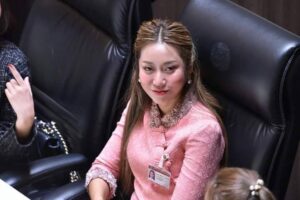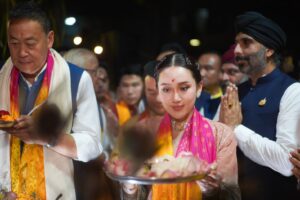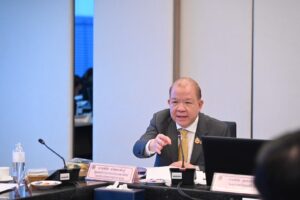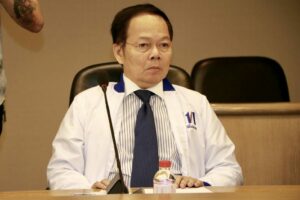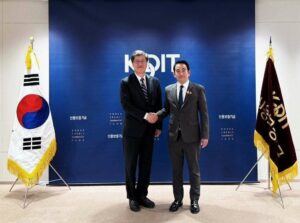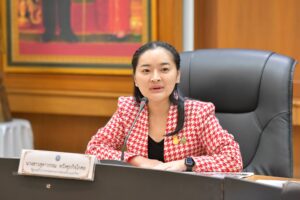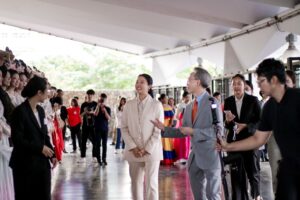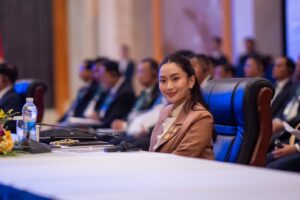จดหมายเปิดผนึก พท. ถึง กรธ.
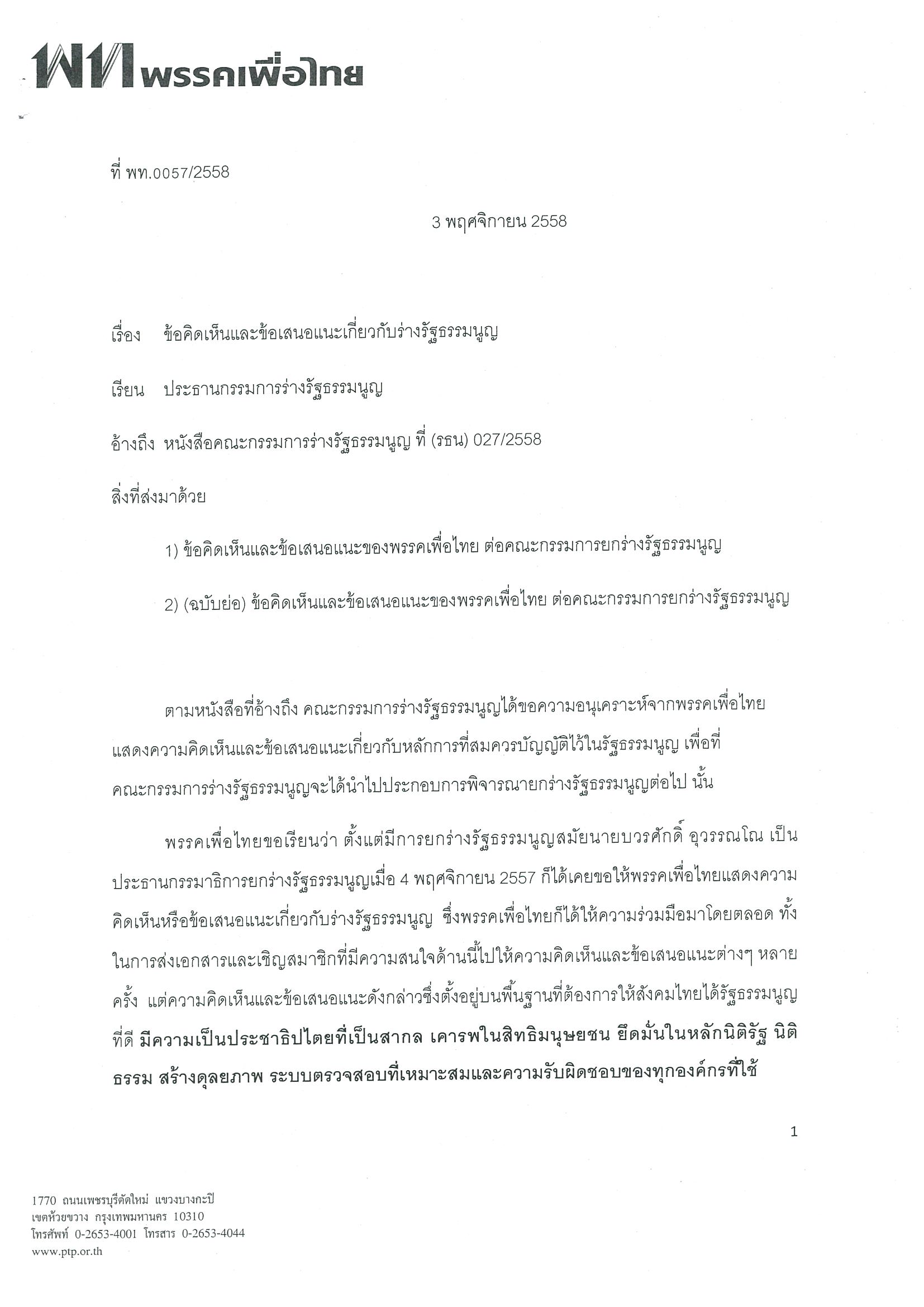
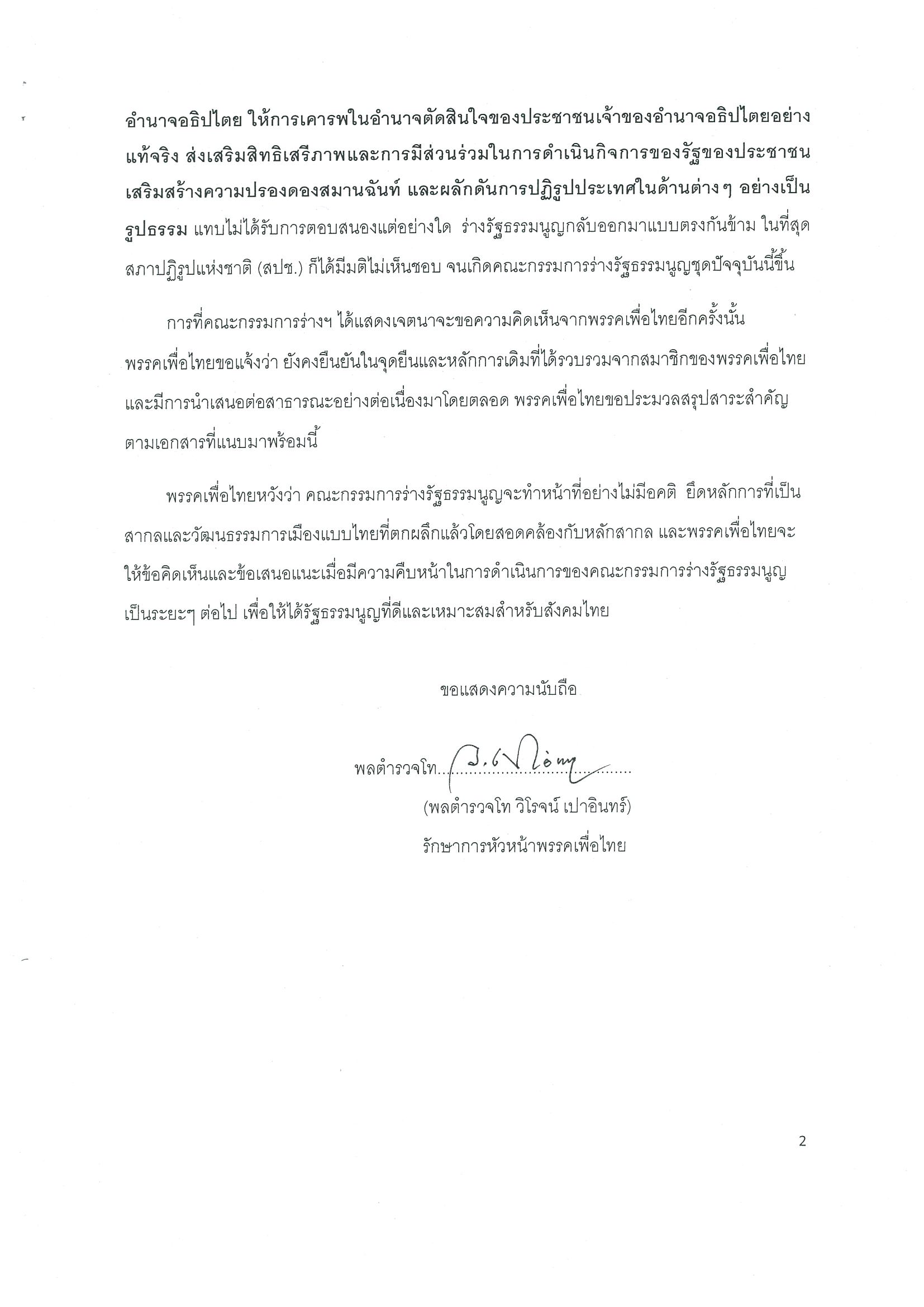
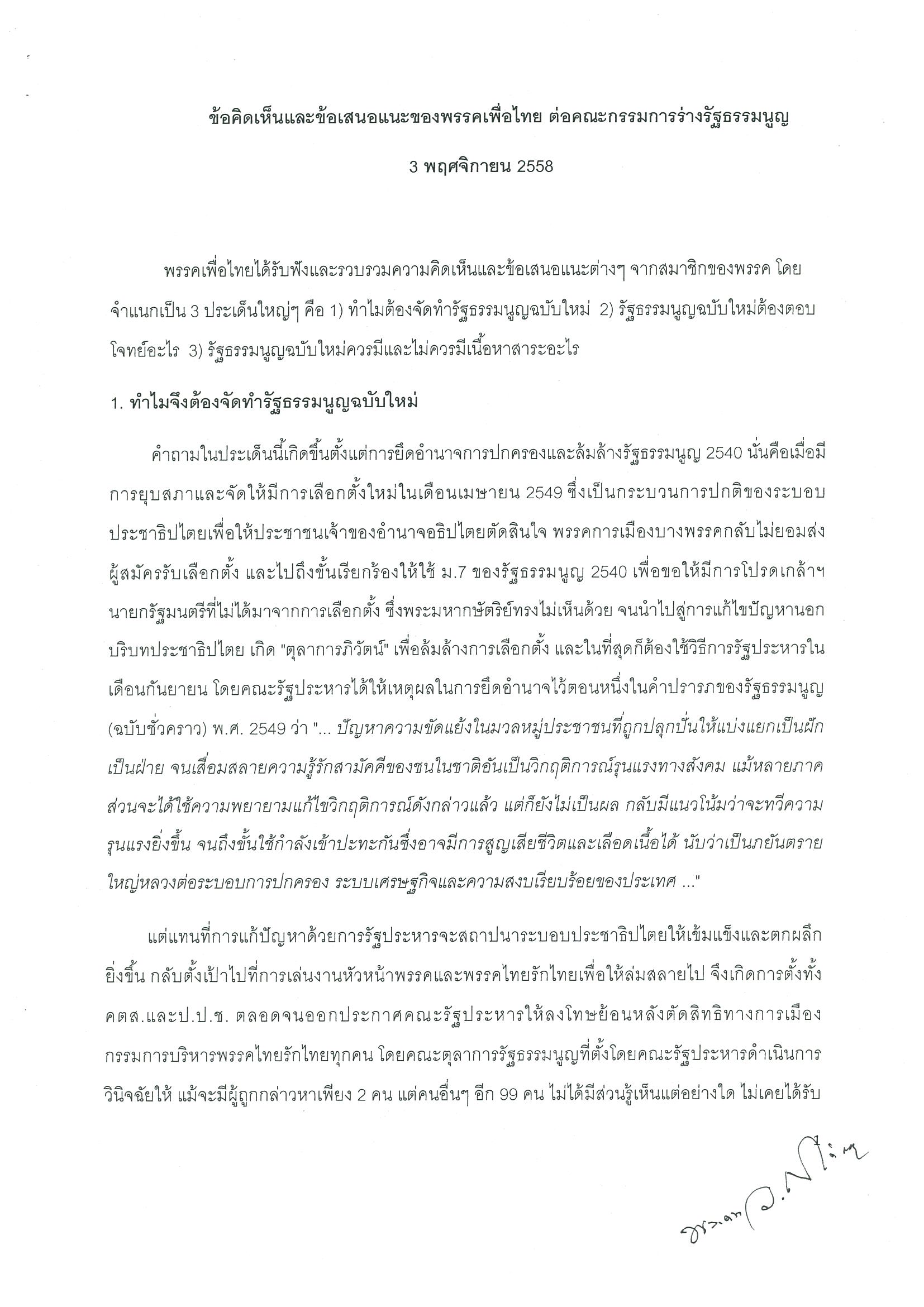
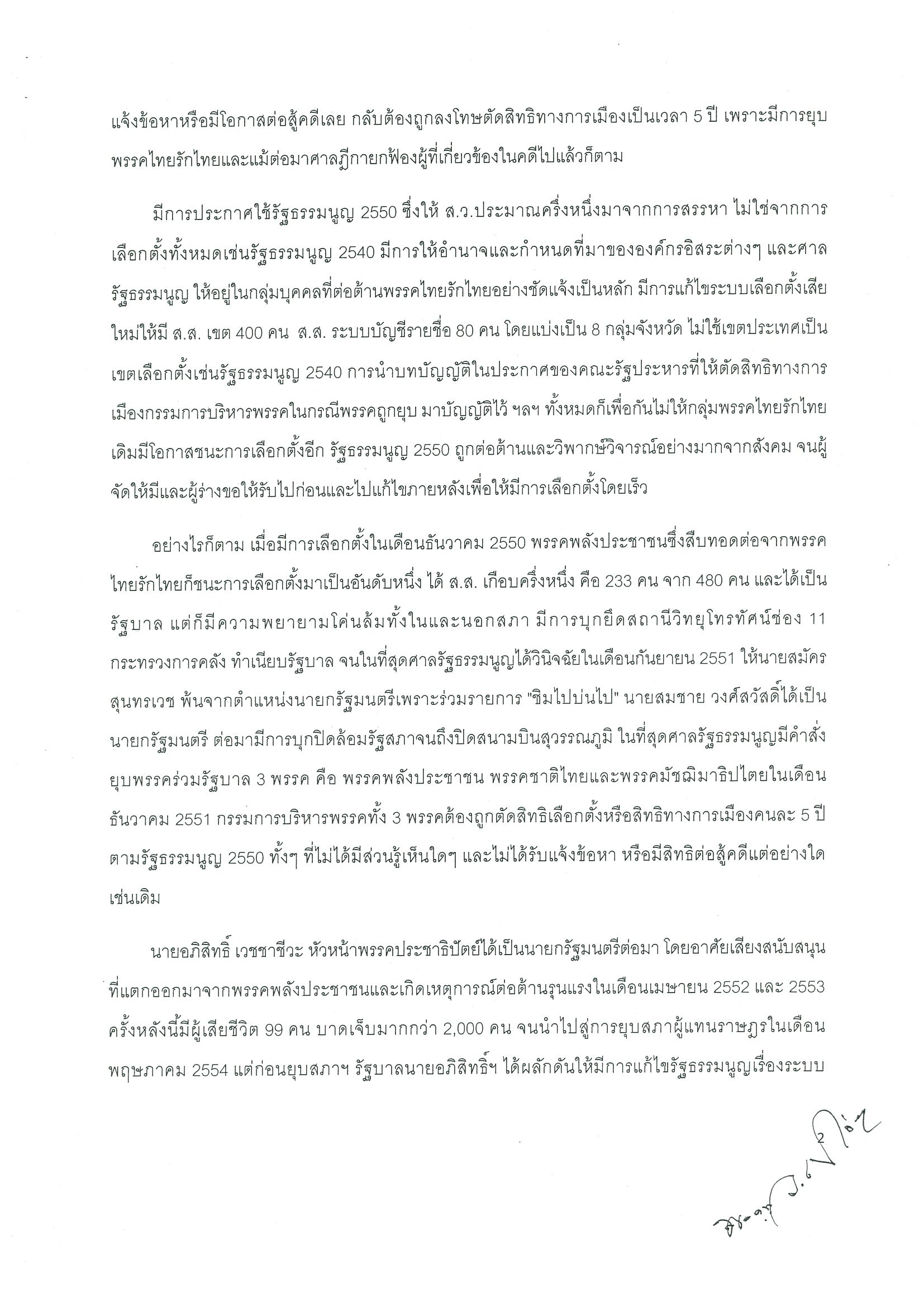
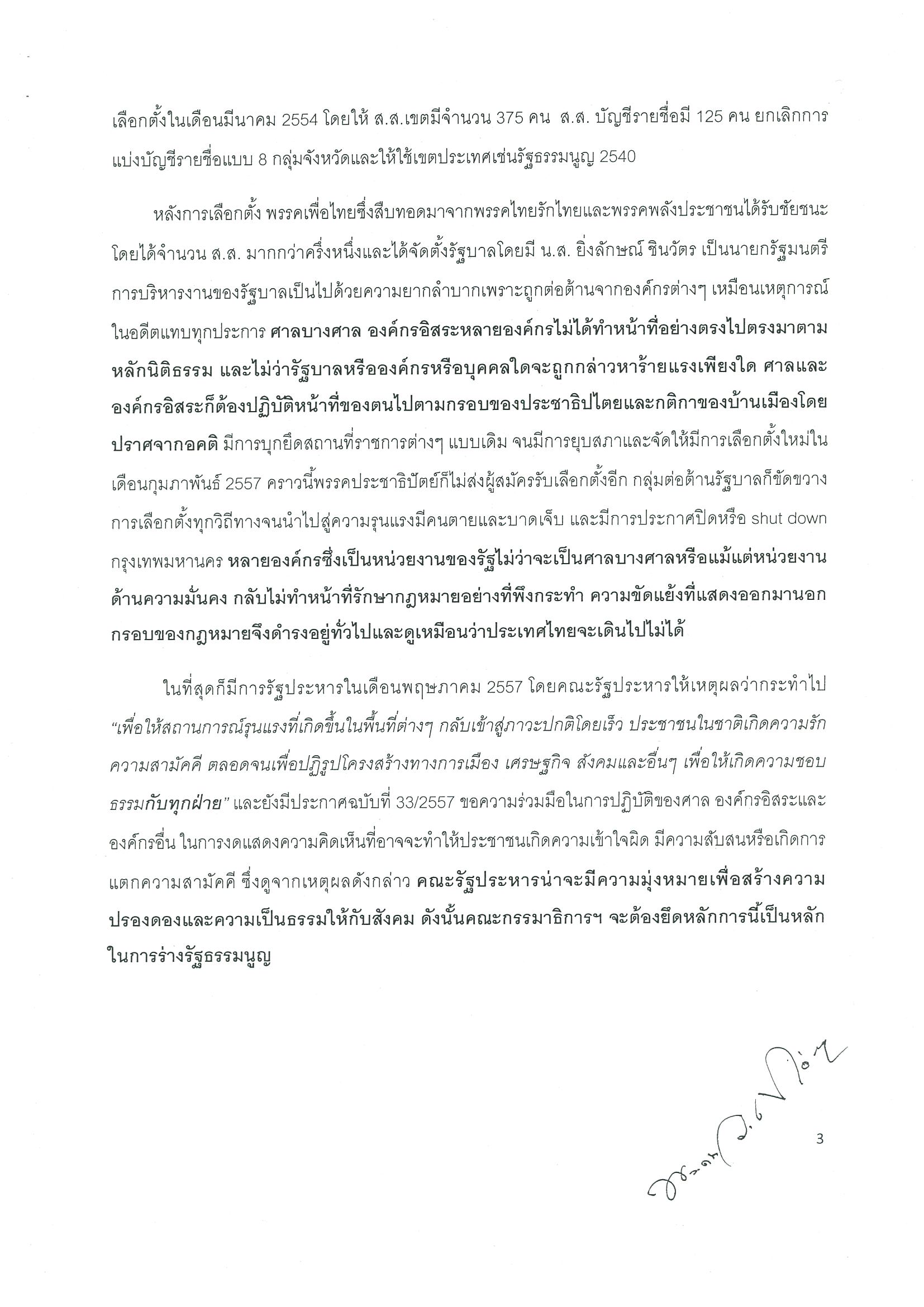
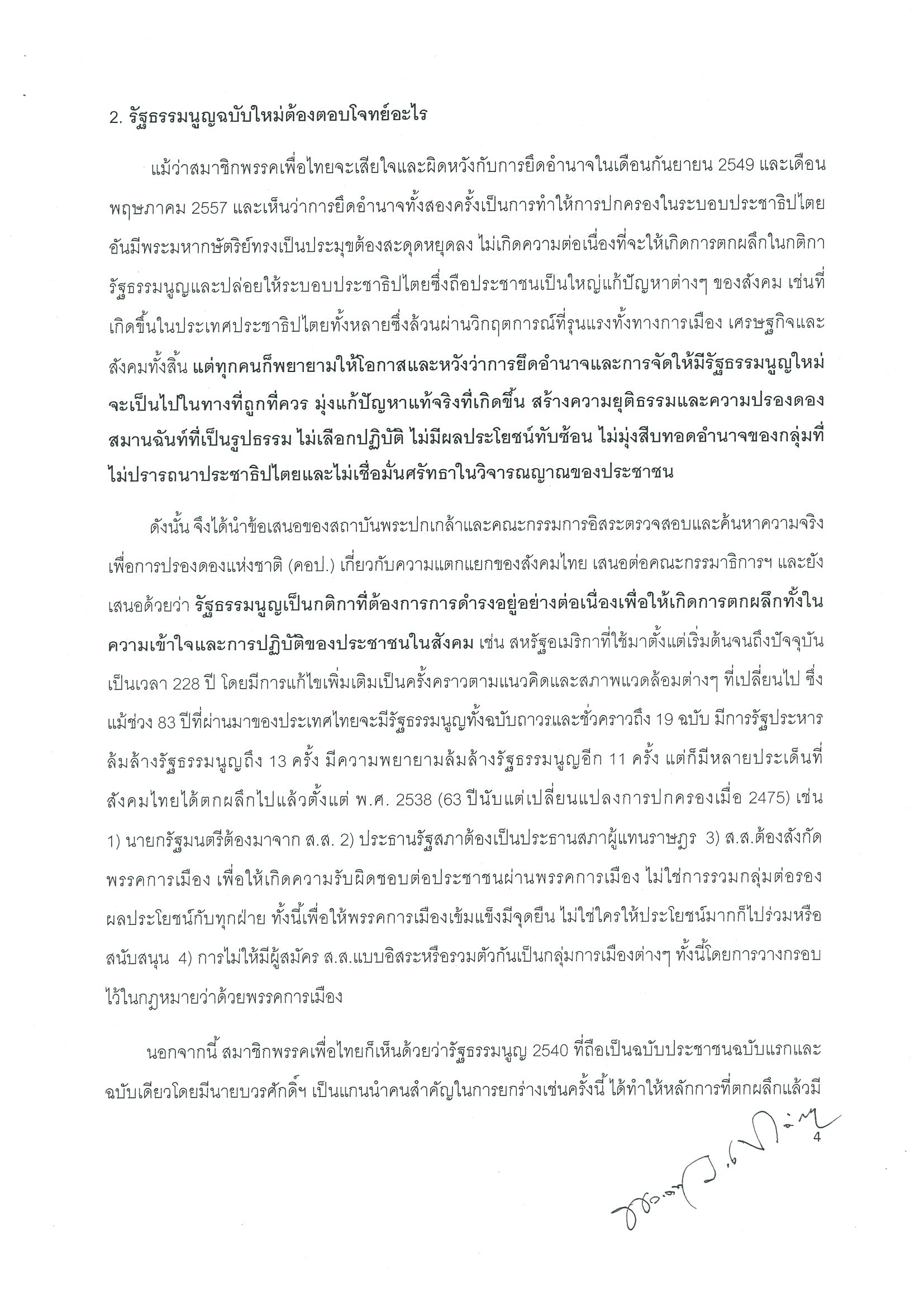
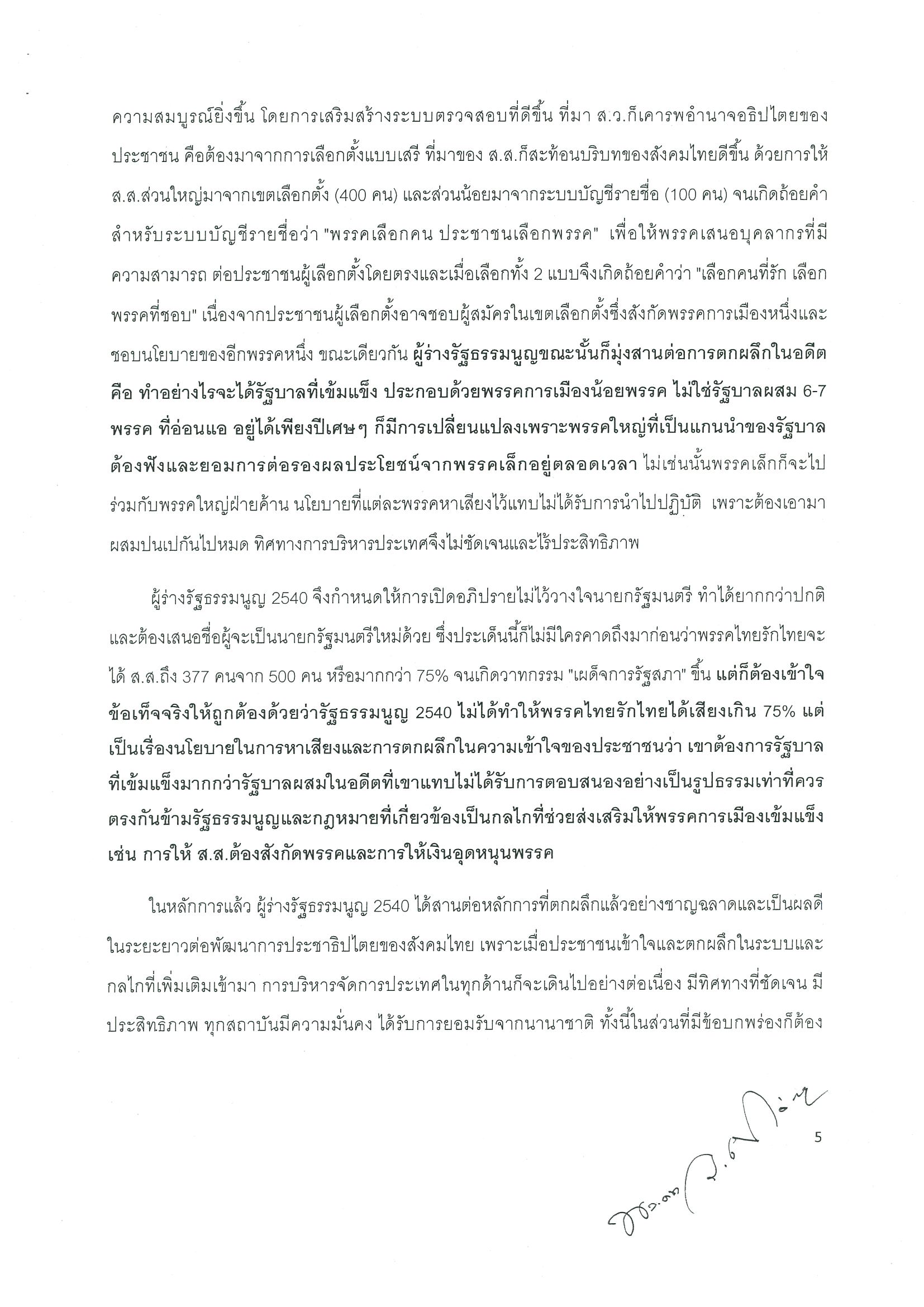
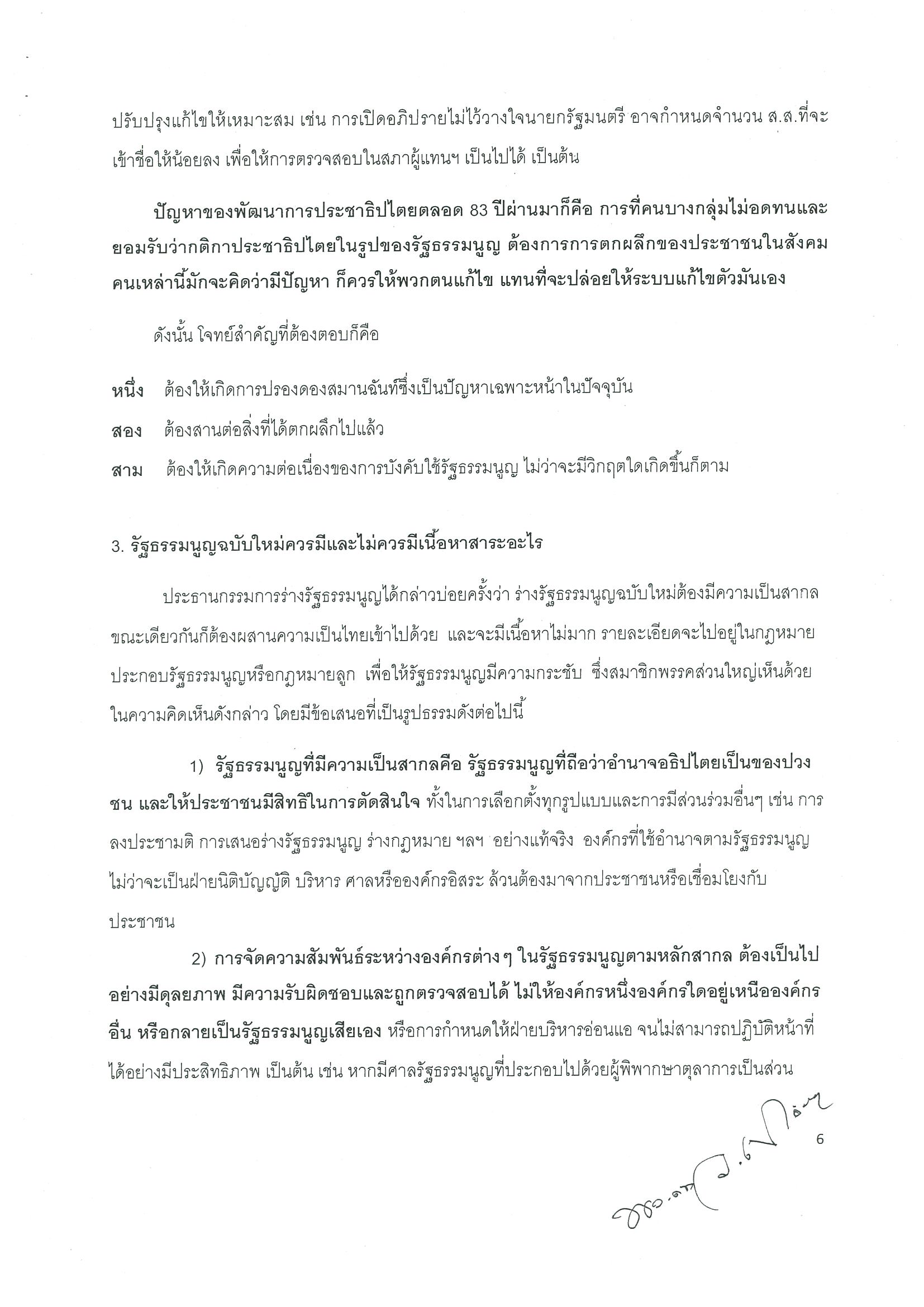
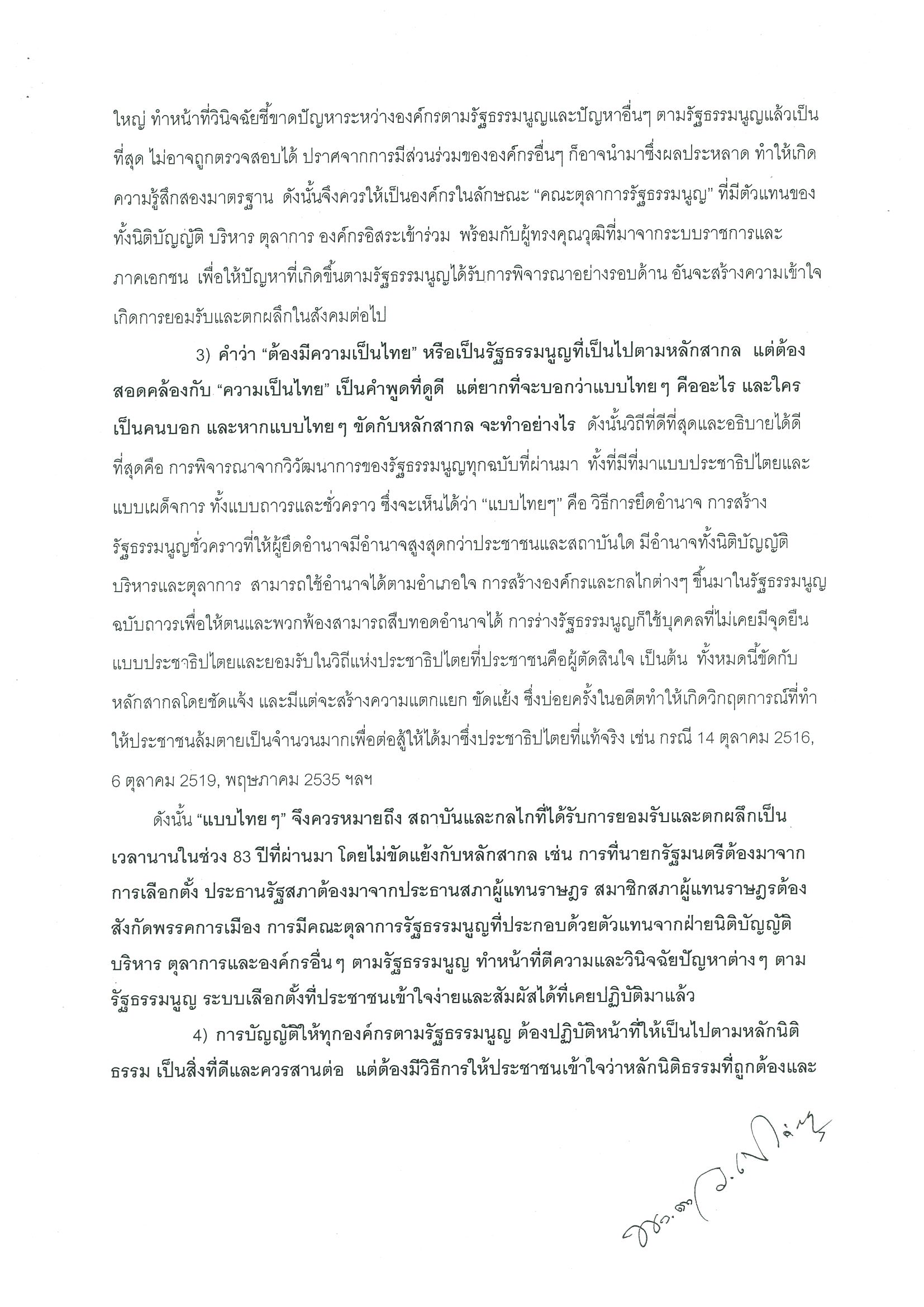
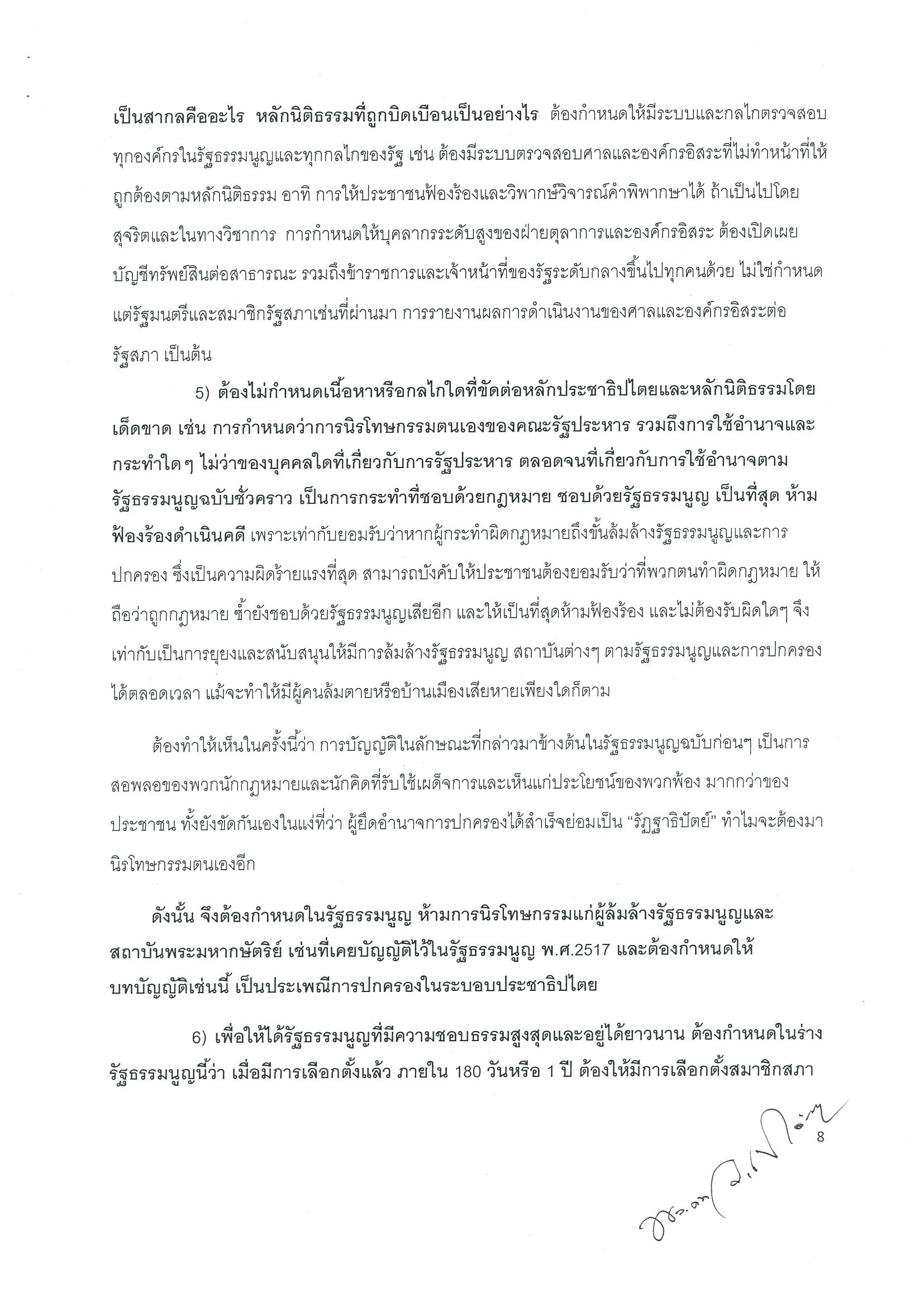
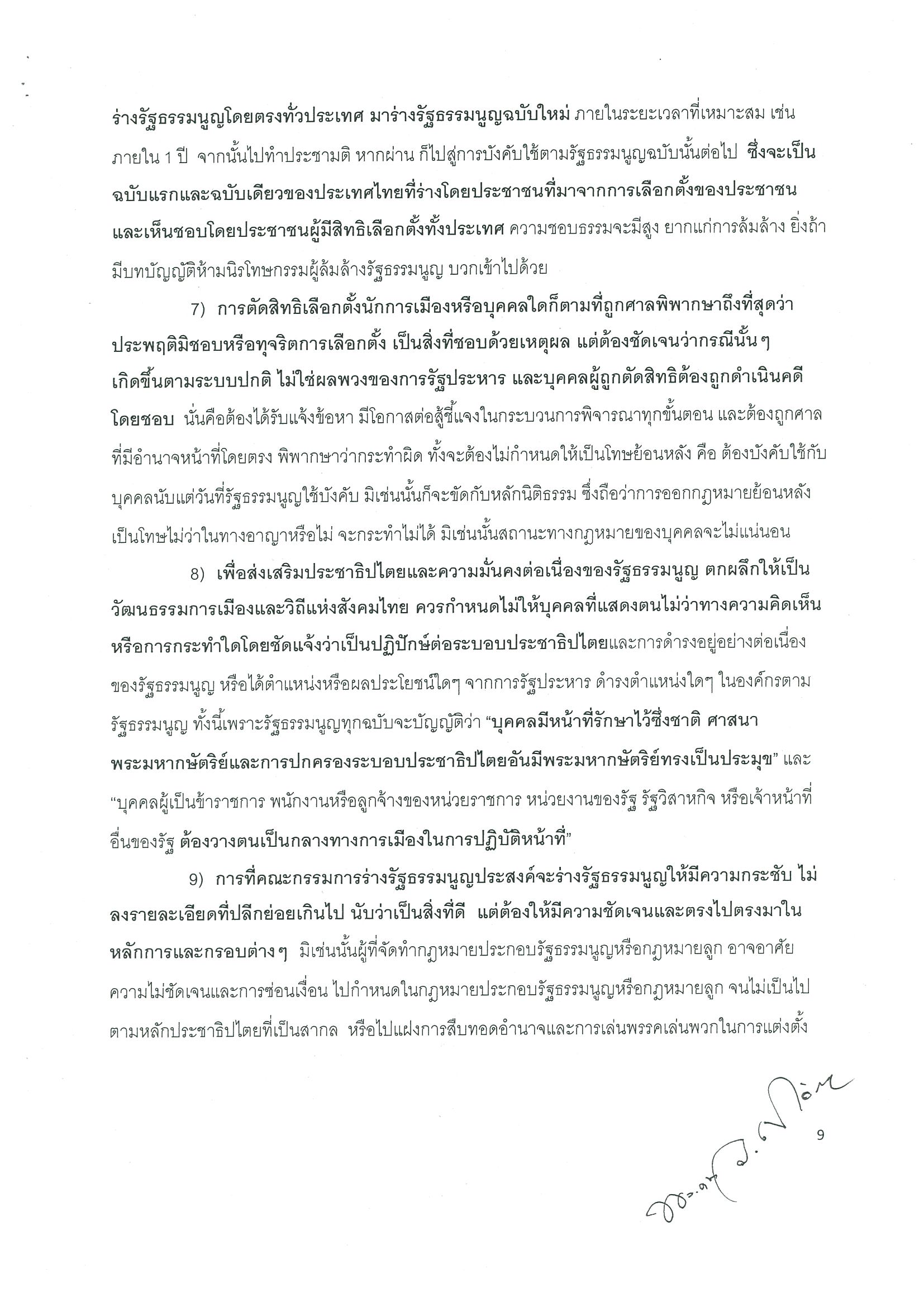
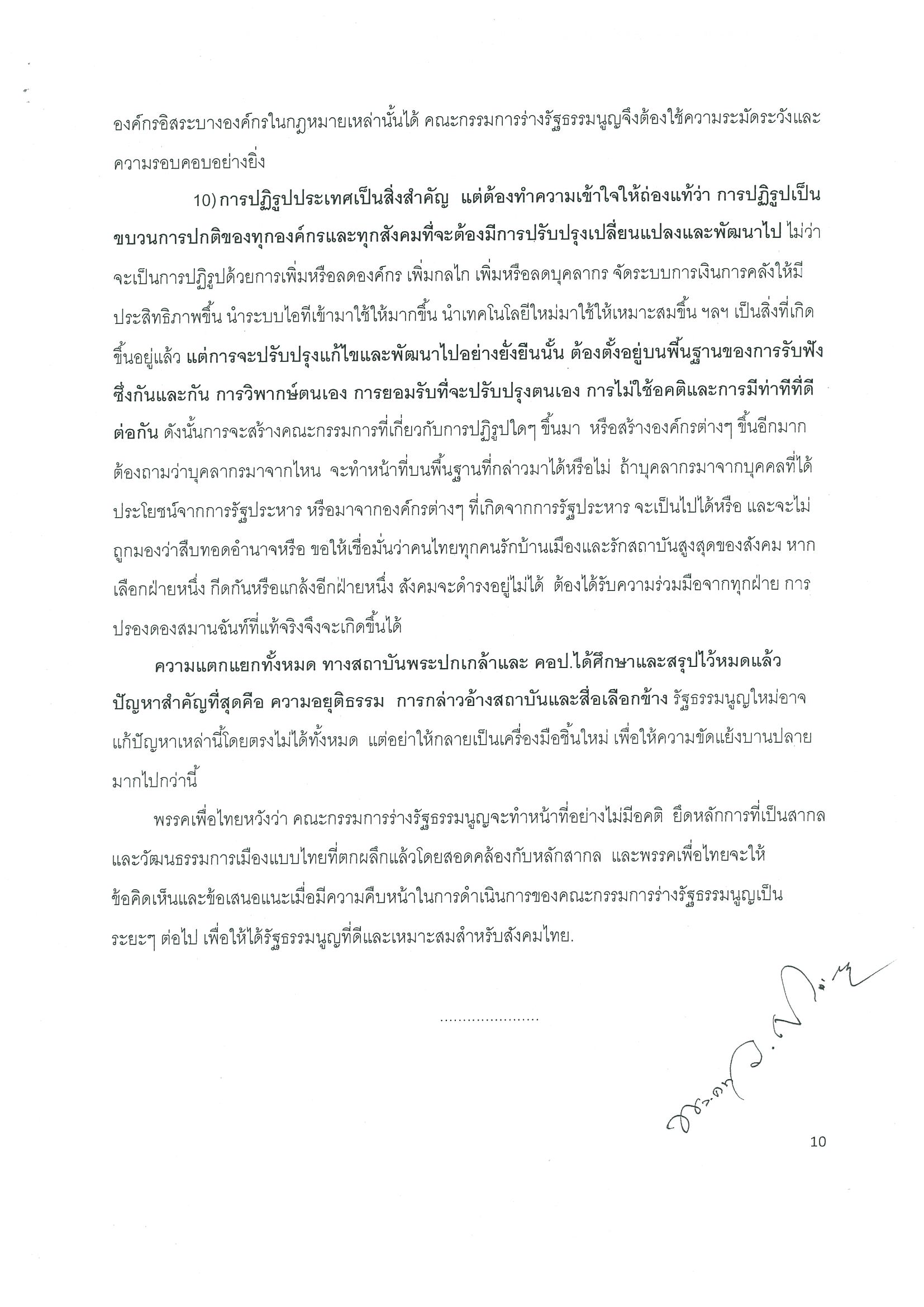
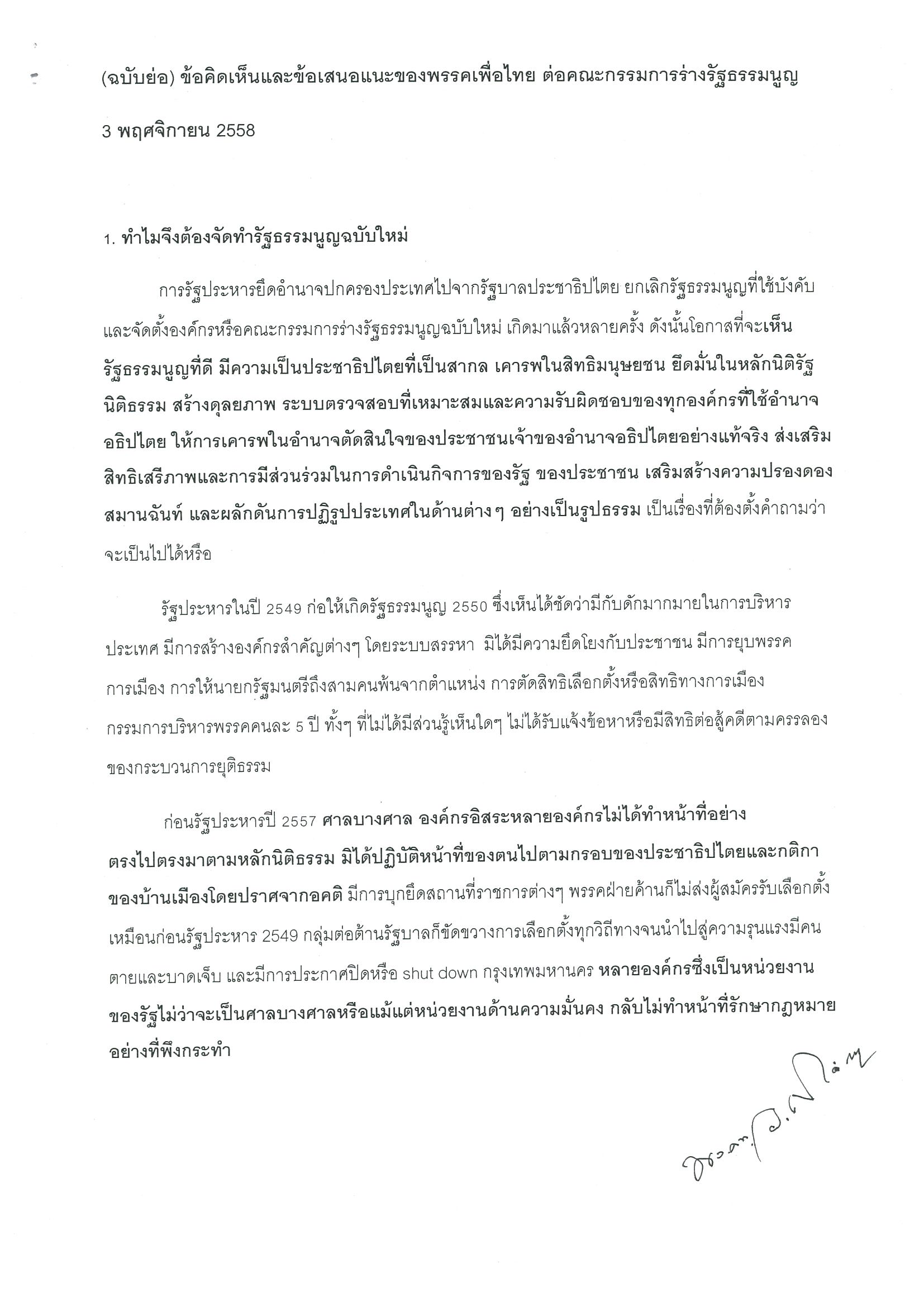
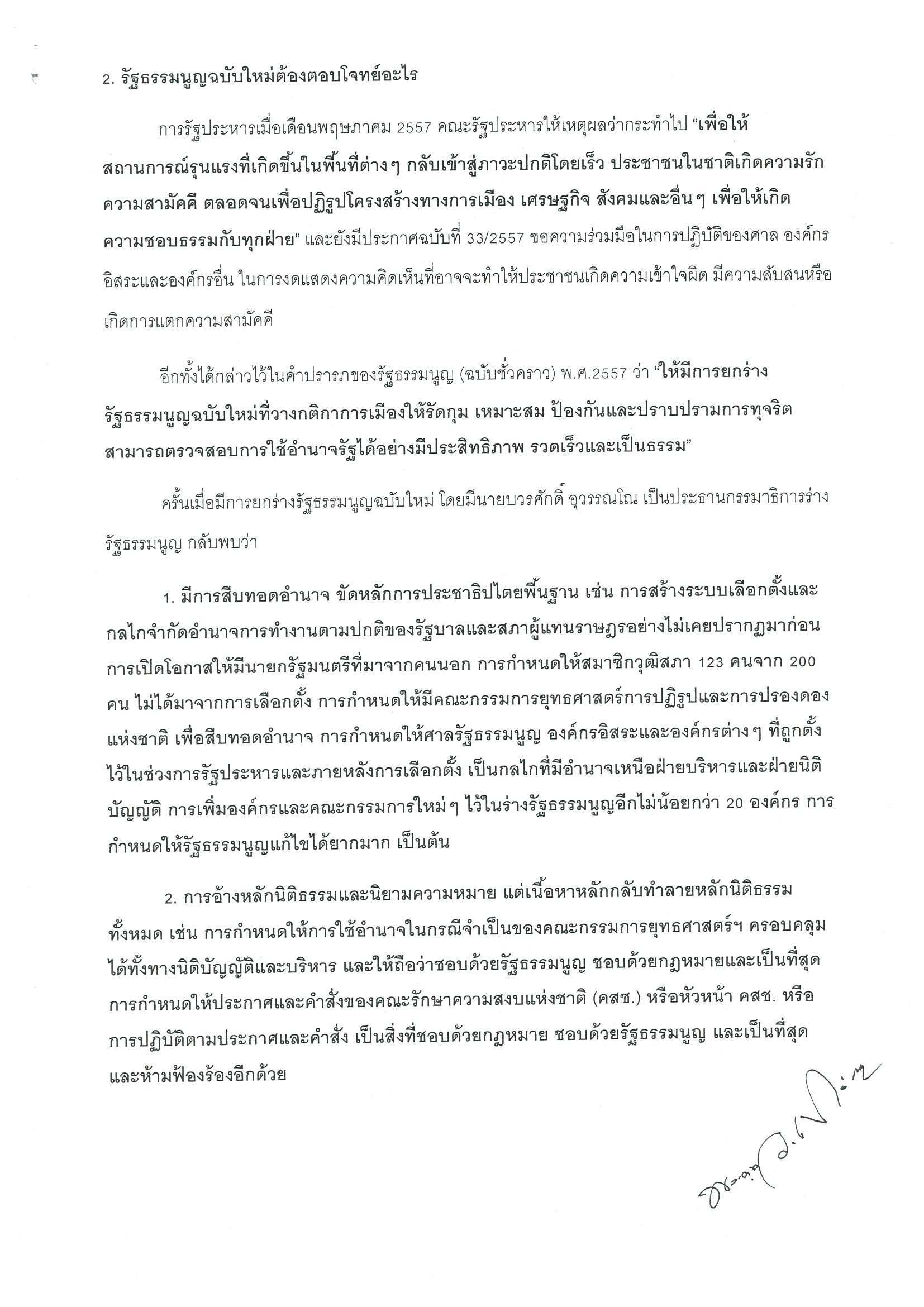
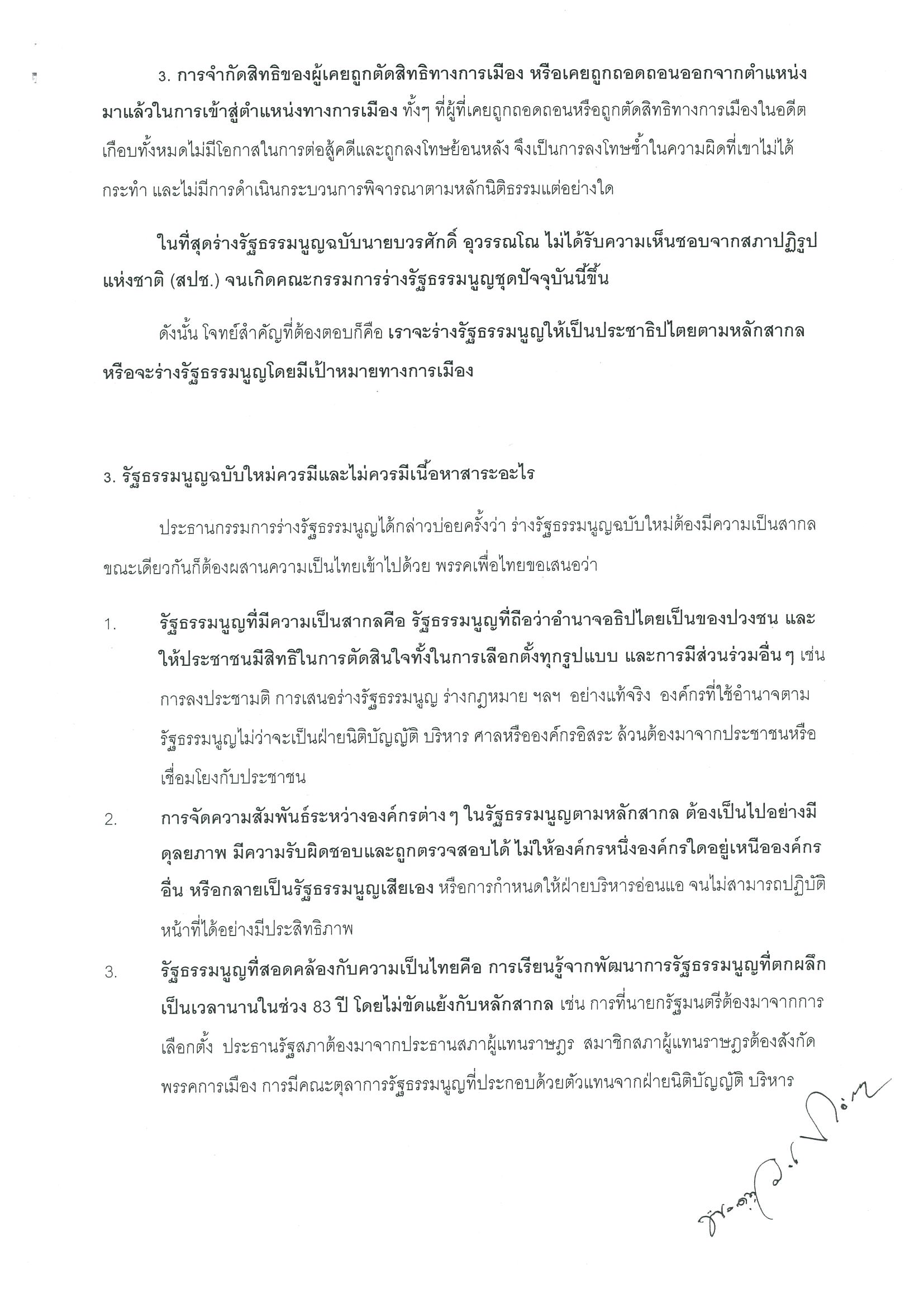
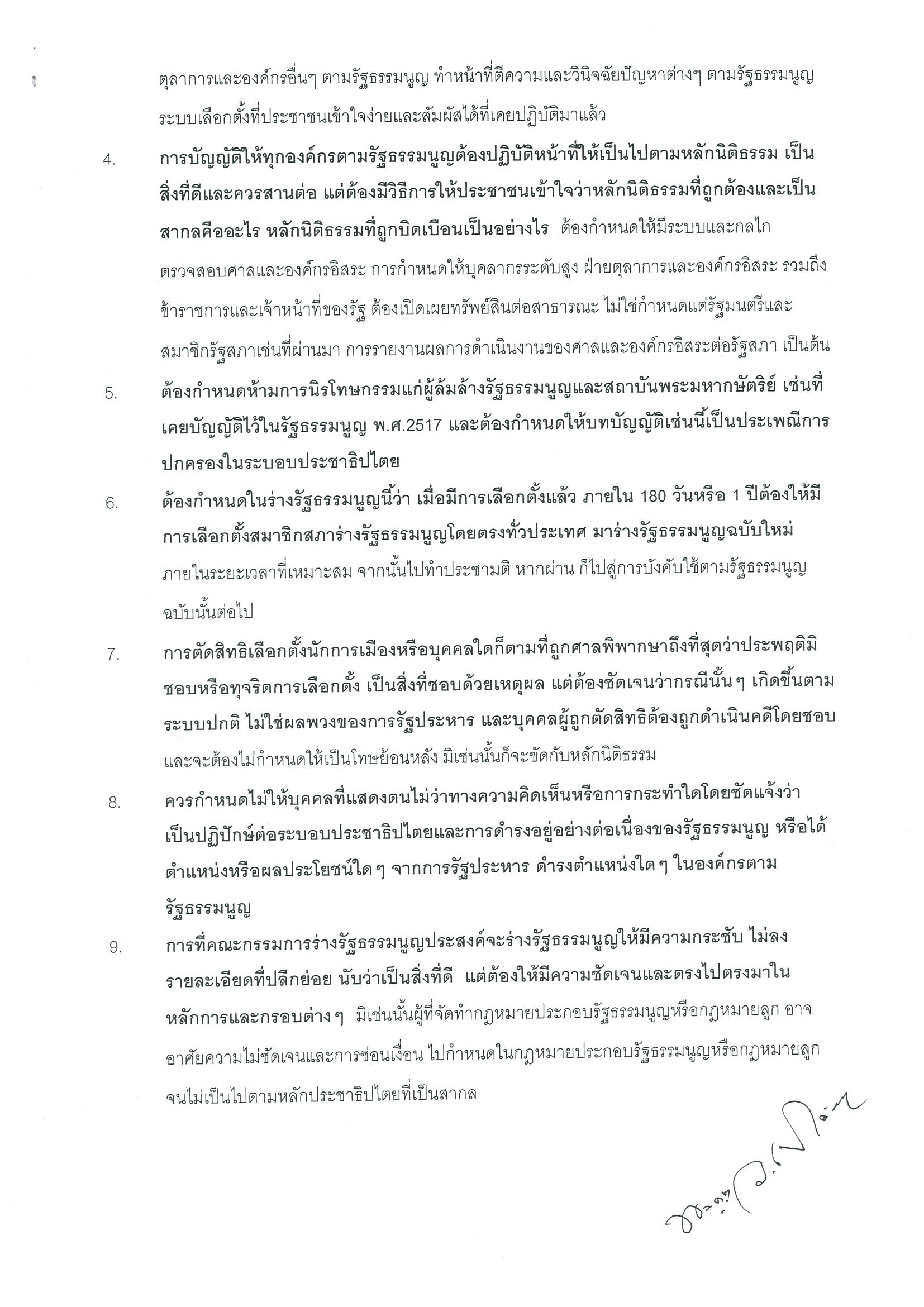
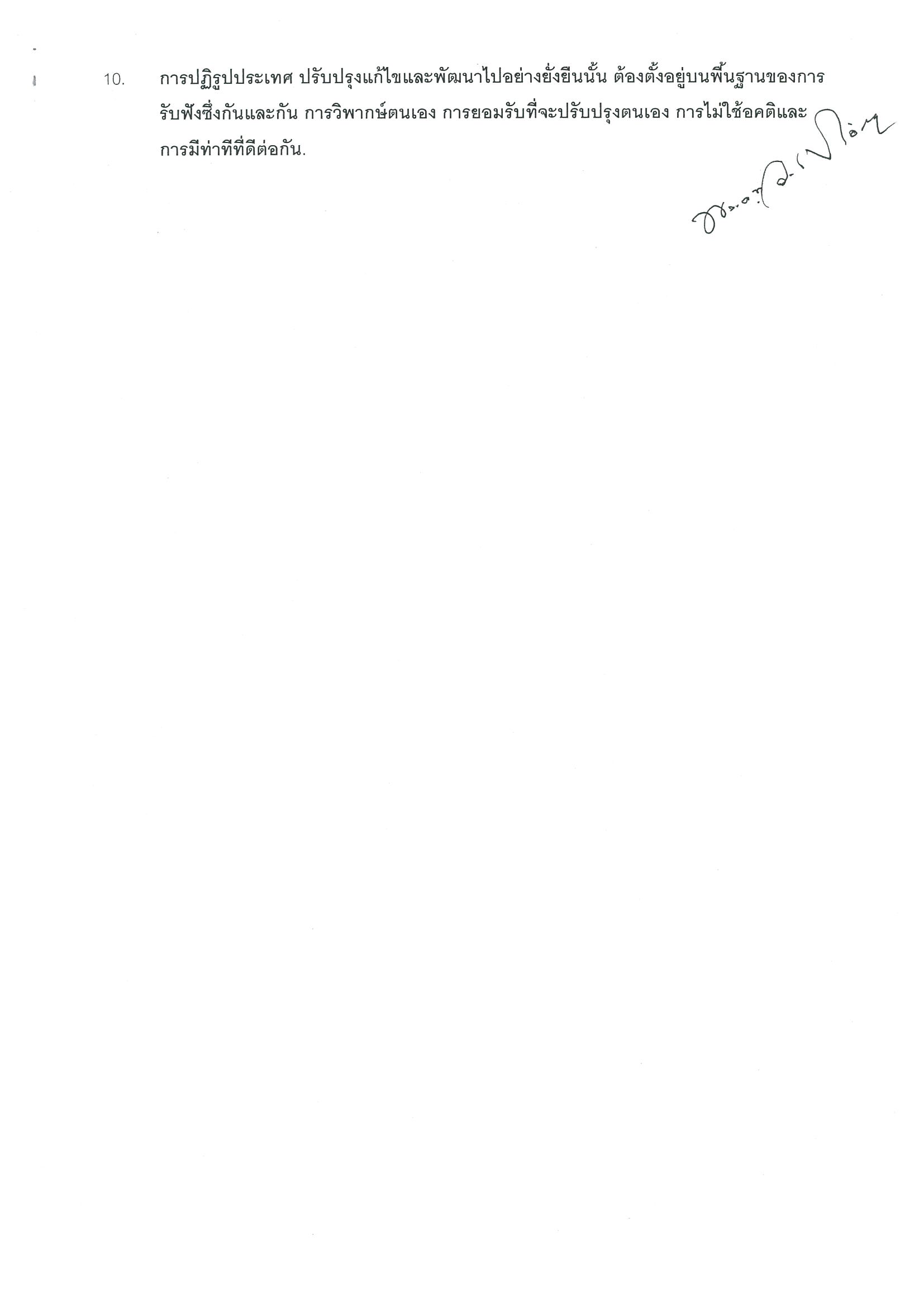
ที่ พท.0057/2558
3 พฤศจิกายน 2558
เรื่อง ข้อคิดเห็นและข้อเสนอแนะเกี่ยวกับร่างรัฐธรรมนูญ
เรียน ประธานกรรมการร่างรัฐธรรมนูญ
อ้างถึง หนังสือคณะกรรมการร่างรัฐธรรมนูญ
ที่ (รธน) 027/2558
สิ่งที่ส่งมาด้วย
1) ข้อคิดเห็นและข้อเสนอแนะของพรรคเพื่อไทย
ต่อคณะกรรมการยกร่างรัฐธรรมนูญ
2) (ฉบับย่อ) ข้อคิดเห็นและข้อเสนอแนะของพรรคเพื่อไทย
ต่อคณะกรรมการยกร่างรัฐธรรมนูญ
ตามหนังสือที่อ้างถึง
คณะกรรมการร่างรัฐธรรมนูญได้ขอความอนุเคราะห์จากพรรคเพื่อไทย
แสดงความคิดเห็นและข้อเสนอแนะเกี่ยวกับหลักการที่สมควรบัญญัติไว้ในรัฐธรรมนูญ
เพื่อที่คณะกรรมการร่างรัฐธรรมนูญจะได้นำไปประกอบการพิจารณายกร่างรัฐธรรมนูญต่อไป
นั้น
พรรคเพื่อไทยขอเรียนว่า
ตั้งแต่มีการยกร่างรัฐธรรมนูญสมัยนายบวรศักดิ์ อุวรรณโณ
เป็นประธานกรรมาธิการยกร่างรัฐธรรมนูญเมื่อ 4 พฤศจิกายน 2557
ก็ได้เคยขอให้พรรคเพื่อไทยแสดงความคิดเห็นหรือข้อเสนอแนะเกี่ยวกับร่างรัฐธรรมนูญ ซึ่งพรรคเพื่อไทยก็ได้ให้ความร่วมมือมาโดยตลอด
ทั้งในการส่งเอกสารและเชิญสมาชิกที่มีความสนใจด้านนี้ไปให้ความคิดเห็นและข้อเสนอแนะต่างๆ
หลายครั้ง
แต่ความคิดเห็นและข้อเสนอแนะดังกล่าวซึ่งตั้งอยู่บนพื้นฐานที่ต้องการให้สังคมไทยได้รัฐธรรมนูญที่ดี
มีความเป็นประชาธิปไตยที่เป็นสากล เคารพในสิทธิมนุษยชน ยึดมั่นในหลักนิติรัฐ
นิติธรรม สร้างดุลยภาพ
ระบบตรวจสอบที่เหมาะสมและความรับผิดชอบของทุกองค์กรที่ใช้อำนาจอธิปไตย
ให้การเคารพในอำนาจตัดสินใจของประชาชนเจ้าของอำนาจอธิปไตยอย่างแท้จริง
ส่งเสริมสิทธิเสรีภาพและการมีส่วนร่วมในการดำเนินกิจการของรัฐของประชาชน
เสริมสร้างความปรองดองสมานฉันท์ และผลักดันการปฏิรูปประเทศในด้านต่างๆ
อย่างเป็นรูปธรรม แทบไม่ได้รับการตอบสนองแต่อย่างใด ร่างรัฐธรรมนูญกลับออกมาแบบตรงกันข้าม ในที่สุดสภาปฏิรูปแห่งชาติ
(สปช.) ก็ได้มีมติไม่เห็นชอบ จนเกิดคณะกรรมการร่างรัฐธรรมนูญชุดปัจจุบันนี้ขึ้น
การที่คณะกรรมการร่างฯ
ได้แสดงเจตนาจะขอความคิดเห็นจากพรรคเพื่อไทยอีกครั้งนั้น
พรรคเพื่อไทยขอแจ้งว่า
ยังคงยืนยันในจุดยืนและหลักการเดิมที่ได้รวบรวมจากสมาชิกของพรรคเพื่อไทย
และมีการนำเสนอต่อสาธารณะอย่างต่อเนื่องมาโดยตลอด
พรรคเพื่อไทยขอประมวลสรุปสาระสำคัญตามเอกสารที่แนบมาพร้อมนี้
พรรคเพื่อไทยหวังว่า
คณะกรรมการร่างรัฐธรรมนูญจะทำหน้าที่อย่างไม่มีอคติ
ยึดหลักการที่เป็นสากลและวัฒนธรรมการเมืองแบบไทยที่ตกผลึกแล้วโดยสอดคล้อง
กับหลักสากล
และพรรคเพื่อไทยจะให้ข้อคิดเห็นและข้อเสนอแนะเมื่อมีความคืบหน้าในการดำเนิน
การของคณะกรรมการร่างรัฐธรรมนูญเป็นระยะๆ
ต่อไป เพื่อให้ได้รัฐธรรมนูญที่ดีและเหมาะสมสำหรับสังคมไทย
ขอแสดงความนับถือ
พลตำรวจโท…………………………………….
(พลตำรวจโท วิโรจน์
เปาอินทร์)
รักษาการหัวหน้าพรรคเพื่อไทย
—————————————————
ข้อคิดเห็นและข้อเสนอแนะของพรรคเพื่อไทย ต่อคณะกรรมการร่างรัฐธรรมนูญ
3 พฤศจิกายน 2558
พรรคเพื่อไทยได้รับฟังและรวบรวมความคิดเห็นและข้อเสนอแนะต่างๆ
จากสมาชิกของพรรค โดยจำแนกเป็น 3 ประเด็นใหญ่ๆ คือ 1)
ทำไมต้องจัดทำรัฐธรรมนูญฉบับใหม่ 2)
รัฐธรรมนูญฉบับใหม่ต้องตอบโจทย์อะไร 3)
รัฐธรรมนูญฉบับใหม่ควรมีและไม่ควรมีเนื้อหาสาระอะไร
1. ทำไมจึงต้องจัดทำรัฐธรรมนูญฉบับใหม่
คำถามในประเด็นนี้เกิดขึ้นตั้งแต่การยึดอำนาจการปกครองและล้มล้างรัฐธรรมนูญ
2540 นั่นคือเมื่อมีการยุบสภาและจัดให้มีการเลือกตั้งใหม่ในเดือนเมษายน
2549 ซึ่งเป็นกระบวนการปกติของระบอบประชาธิปไตยเพื่อให้ประชาชนเจ้าของอำนาจอธิปไตยตัดสินใจ
พรรคการเมืองบางพรรคกลับไม่ยอมส่งผู้สมัครรับเลือกตั้ง
และไปถึงขั้นเรียกร้องให้ใช้ ม.7 ของรัฐธรรมนูญ 2540 เพื่อขอให้มีการโปรดเกล้าฯ นายกรัฐมนตรีที่ไม่ได้มาจากการเลือกตั้ง
ซึ่งพระมหากษัตริย์ทรงไม่เห็นด้วย จนนำไปสู่การแก้ไขปัญหานอกบริบทประชาธิปไตย เกิด
“ตุลาการภิวัตน์” เพื่อล้มล้างการเลือกตั้ง
และในที่สุดก็ต้องใช้วิธีการรัฐประหารในเดือนกันยายน โดยคณะรัฐประหารได้ให้เหตุผลในการยึดอำนาจไว้ตอนหนึ่งในคำปรารภของรัฐธรรมนูญ
(ฉบับชั่วคราว) พ.ศ. 2549 ว่า “… ปัญหาความขัดแย้งในมวลหมู่ประชาชนที่
ถูกปลุกปั่นให้แบ่งแยกเป็นฝักเป็นฝ่าย
จนเสื่อมสลายความรู้รักสามัคคีของชนในชาติอันเป็นวิกฤติการณ์รุนแรงทางสังคม
แม้หลายภาคส่วนจะได้ใช้ความพยายามแก้ไขวิกฤติการณ์ดังกล่าวแล้ว
แต่ก็ยังไม่เป็นผล
กลับมีแนวโน้มว่าจะทวีความรุนแรงยิ่งขึ้น
จนถึงขั้นใช้กำลังเข้าปะทะกันซึ่งอาจมีการสูญเสียชีวิตและเลือดเนื้อได้
นับว่าเป็นภยันตรายใหญ่หลวงต่อระบอบการปกครอง
ระบบเศรษฐกิจและความสงบเรียบร้อยของประเทศ …”
แต่แทนที่การแก้ปัญหาด้วยการรัฐประหารจะสถาปนาระบอบประชาธิปไตยให้เข้มแข็งและตกผลึกยิ่งขึ้น
กลับตั้งเป้าไปที่การเล่นงานหัวหน้าพรรคและพรรคไทยรักไทยเพื่อให้ล่มสลายไป
จึงเกิดการตั้งทั้ง คตส.และป.ป.ช.
ตลอดจนออกประกาศคณะรัฐประหารให้ลงโทษย้อนหลังตัดสิทธิทางการเมืองกรรมการบริหารพรรคไทยรักไทยทุกคน
โดยคณะตุลาการรัฐธรรมนูญที่ตั้งโดยคณะรัฐประหารดำเนินการวินิจฉัยให้
แม้จะมีผู้ถูกกล่าวหาเพียง 2 คน แต่คนอื่นๆ อีก 99 คน
ไม่ได้มีส่วนรู้เห็นแต่อย่างใด ไม่เคยได้รับแจ้งข้อหาหรือมีโอกาสต่อสู้คดีเลย
กลับต้องถูกลงโทษตัดสิทธิทางการเมืองเป็นเวลา 5 ปี
เพราะมีการยุบพรรคไทยรักไทยและแม้ต่อมาศาลฎีกายกฟ้องผู้ที่เกี่ยวข้องในคดีไปแล้วก็ตาม
มีการประกาศใช้รัฐธรรมนูญ
2550 ซึ่งให้ ส.ว.ประมาณครึ่งหนึ่งมาจากการสรรหา
ไม่ใช่จากการเลือกตั้งทั้งหมดเช่นรัฐธรรมนูญ
2540 มีการให้อำนาจและกำหนดที่มาขององค์กรอิสระต่างๆ
และศาลรัฐธรรมนูญ
ให้อยู่ในกลุ่มบุคคลที่ต่อต้านพรรคไทยรักไทยอย่างชัดแจ้งเป็นหลัก
มีการแก้ไขระบบเลือกตั้งเสียใหม่ให้มี ส.ส. เขต 400 คน ส.ส.
ระบบบัญชีรายชื่อ 80 คน
โดยแบ่งเป็น 8 กลุ่มจังหวัด
ไม่ใช้เขตประเทศเป็นเขตเลือกตั้งเช่นรัฐธรรมนูญ 2540
การนำบทบัญญัติในประกาศของคณะรัฐประหารที่ให้ตัดสิทธิทางการเมืองกรรมการ
บริหารพรรคในกรณีพรรคถูกยุบ
มาบัญญัติไว้ ฯลฯ
ทั้งหมดก็เพื่อกันไม่ให้กลุ่มพรรคไทยรักไทยเดิมมีโอกาสชนะการเลือกตั้งอีก
รัฐธรรมนูญ 2550 ถูกต่อต้านและวิพากษ์วิจารณ์อย่างมากจากสังคม
จนผู้จัดให้มีและผู้ร่างขอให้รับไปก่อนและไปแก้ไขภายหลังเพื่อให้มีการเลือก
ตั้งโดยเร็ว
อย่างไรก็ตาม
เมื่อมีการเลือกตั้งในเดือนธันวาคม 2550 พรรคพลังประชาชนซึ่งสืบทอด
ต่อจากพรรคไทยรักไทยก็ชนะการเลือกตั้งมาเป็นอันดับหนึ่ง
ได้ ส.ส. เกือบครึ่งหนึ่ง คือ 233 คน จาก 480 คน และได้เป็นรัฐบาล
แต่ก็มีความพยายามโค่นล้มทั้งในและนอกสภา
มีการบุกยึดสถานีวิทยุโทรทัศน์ช่อง 11 กระทรวงการคลัง
ทำเนียบรัฐบาล จนในที่สุดศาลรัฐธรรมนูญได้วินิจฉัยในเดือนกันยายน 2551
ให้นายสมัคร สุนทรเวช พ้นจากตำแหน่งนายกรัฐมนตรีเพราะร่วมรายการ
“ชิมไปบ่นไป” นายสมชาย วงศ์สวัสดิ์ได้เป็นนายกรัฐมนตรี
ต่อมามีการบุกปิดล้อมรัฐสภาจนถึงปิดสนามบินสุวรรณภูมิ
ในที่สุดศาลรัฐธรรมนูญมีคำสั่งยุบพรรคร่วมรัฐบาล 3 พรรค คือ
พรรคพลังประชาชน พรรคชาติไทยและพรรคมัชฌิมาธิปไตยในเดือนธันวาคม 2551
กรรมการบริหารพรรคทั้ง 3
พรรคต้องถูกตัดสิทธิเลือกตั้งหรือสิทธิทางการเมืองคนละ
5 ปี ตามรัฐธรรมนูญ 2550 ทั้งๆ
ที่ไม่ได้มีส่วนรู้เห็นใดๆ และไม่ได้รับแจ้งข้อหา
หรือมีสิทธิต่อสู้คดีแต่อย่างใดเช่นเดิม
นายอภิสิทธิ์
เวชชาชีวะ หัวหน้าพรรคประชาธิปัตย์ได้เป็นนายกรัฐมนตรีต่อมา
โดยอาศัยเสียงสนับสนุนที่แตกออกมาจากพรรคพลังประชาชนและเกิดเหตุการณ์ต่อต้านรุนแรงในเดือนเมษายน
2552 และ 2553
ครั้งหลังนี้มีผู้เสียชีวิต 99 คน
บาดเจ็บมากกว่า 2,000 คน จนนำไปสู่การยุบสภาผู้แทนราษฎรในเดือนพฤษภาคม
2554 แต่ก่อนยุบสภาฯ รัฐบาลนายอภิสิทธิ์ฯ
ได้ผลักดันให้มีการแก้ไขรัฐธรรมนูญเรื่องระบบเลือกตั้งในเดือนมีนาคม 2554 โดยให้ ส.ส.เขตมีจำนวน 375 คน ส.ส. บัญชีรายชื่อมี 125 คน
ยกเลิกการแบ่งบัญชีรายชื่อแบบ 8 กลุ่มจังหวัดและให้ใช้เขตประเทศเช่นรัฐธรรมนูญ
2540
หลังการเลือกตั้ง
พรรคเพื่อไทยซึ่งสืบทอดมาจากพรรคไทยรักไทยและพรรคพลังประชาชนได้รับชัยชนะโดยได้จำนวน
ส.ส. มากกว่าครึ่งหนึ่งและได้จัดตั้งรัฐบาลโดยมี น.ส. ยิ่งลักษณ์ ชินวัตร
เป็นนายกรัฐมนตรี การบริหารงานของรัฐบาลเป็นไปด้วยความยากลำบากเพราะถูกต่อต้านจากองค์กรต่างๆ
เหมือนเหตุการณ์ในอดีตแทบทุกประการ ศาลบางศาล
องค์กรอิสระหลายองค์กรไม่ได้ทำหน้าที่อย่างตรงไปตรงมาตามหลักนิติธรรม
และไม่ว่ารัฐบาลหรือองค์กรหรือบุคคลใดจะถูกกล่าวหาร้ายแรงเพียงใด
ศาลและองค์กรอิสระก็ต้องปฏิบัติหน้าที่ของตนไปตามกรอบของประชาธิปไตยและกติกาของบ้านเมืองโดยปราศจากอคติ
มีการบุกยึดสถานที่ราชการต่างๆ แบบเดิม
จนมีการยุบสภาและจัดให้มีการเลือกตั้งใหม่ในเดือนกุมภาพันธ์ 2557 คราวนี้พรรคประชาธิปัตย์ก็ไม่ส่งผู้สมัครรับเลือกตั้งอีก
กลุ่มต่อต้านรัฐบาลก็ขัดขวางการเลือกตั้งทุกวิถีทางจนนำไปสู่ความรุนแรงมีคนตายและบาดเจ็บ
และมีการประกาศปิดหรือ shut down กรุงเทพมหานคร หลายองค์กรซึ่งเป็นหน่วย
งานของรัฐไม่ว่าจะเป็นศาลบางศาลหรือแม้แต่หน่วยงานด้านความมั่นคง
กลับไม่ทำหน้าที่รักษากฎหมายอย่างที่พึงกระทำ
ความขัดแย้งที่แสดงออกมานอกกรอบของกฎหมายจึงดำรงอยู่ทั่วไปและดูเหมือนว่า
ประเทศไทยจะเดินไปไม่ได้
ในที่สุดก็มีการรัฐประหารในเดือนพฤษภาคม
2557 โดยคณะรัฐประหารให้เหตุผลว่ากระทำไป
“เพื่อให้สถานการณ์รุนแรงที่เกิดขึ้นในพื้นที่ต่างๆ กลับเข้าสู่ภาวะปกติโดยเร็ว
ประชาชนในชาติเกิดความรัก ความสามัคคี ตลอดจนเพื่อปฏิรูปโครงสร้างทางการเมือง
เศรษฐกิจ สังคมและอื่นๆ เพื่อให้เกิดความชอบธรรมกับทุกฝ่าย”
และยังมีประกาศฉบับที่ 33/2557 ขอความร่วมมือในการปฏิบัติของศาล
องค์กรอิสระและองค์กรอื่น ในการงดแสดงความคิดเห็นที่อาจจะทำให้ประชาชนเกิดความเข้าใจผิด
มีความสับสนหรือเกิดการแตกความสามัคคี ซึ่งดูจากเหตุผลดังกล่าว คณะรัฐประหารน่าจะมีความมุ่งหมายเพื่อสร้างความปรองดองและความเป็นธรรมให้กับสังคม
ดังนั้นคณะกรรมาธิการฯ จะต้องยึดหลักการนี้เป็นหลักในการร่างรัฐธรรมนูญ
2. รัฐธรรมนูญฉบับใหม่ต้องตอบโจทย์อะไร
แม้ว่าสมาชิกพรรคเพื่อไทยจะเสียใจและผิดหวังกับการยึดอำนาจในเดือนกันยายน
2549 และเดือนพฤษภาคม
2557 และเห็นว่าการยึดอำนาจทั้งสองครั้งเป็นการทำให้การปกครองในระบอบประชาธิปไตยอันมีพระมหากษัตริย์ทรงเป็นประมุขต้องสะดุดหยุดลง
ไม่เกิดความต่อเนื่องที่จะให้เกิดการตกผลึกในกติการัฐธรรมนูญและปล่อยให้ระบอบประชาธิปไตยซึ่งถือประชาชนเป็นใหญ่แก้ปัญหาต่างๆ
ของสังคม เช่นที่เกิดขึ้นในประเทศประชาธิปไตยทั้งหลายซึ่งล้วนผ่านวิกฤตการณ์ที่รุนแรงทั้งทางการเมือง
เศรษฐกิจและสังคมทั้งสิ้น แต่ทุกคนก็พยายามให้โอกาสและหวังว่าการยึดอำนาจและการจัดให้มีรัฐธรรมนูญใหม่จะเป็นไปในทางที่ถูกที่ควร
มุ่งแก้ปัญหาแท้จริงที่เกิดขึ้น
สร้างความยุติธรรมและความปรองดองสมานฉันท์ที่เป็นรูปธรรม ไม่เลือกปฏิบัติ
ไม่มีผลประโยชน์ทับซ้อน ไม่มุ่งสืบทอดอำนาจของกลุ่มที่ไม่ปรารถนาประชาธิปไตยและไม่เชื่อมั่นศรัทธาในวิจารณญาณของประชาชน
ดังนั้น จึงได้นำข้อเสนอของสถาบันพระปกเกล้าและคณะกรรมการอิสระตรวจสอบและค้นหาความจริงเพื่อการปรองดองแห่งชาติ
(คอป.)
เกี่ยวกับความแตกแยกของสังคมไทย เสนอต่อคณะกรรมาธิการฯ และยังเสนอด้วยว่า รัฐธรรมนูญเป็นกติกาที่ต้องการการดำรงอยู่อย่างต่อเนื่องเพื่อให้เกิดการตกผลึกทั้งในความเข้าใจและการปฏิบัติของประชาชนในสังคม
เช่น สหรัฐอเมริกาที่ใช้มาตั้งแต่เริ่มต้นจนถึงปัจจุบันเป็นเวลา 228 ปี
โดยมีการแก้ไขเพิ่มเติมเป็นครั้งคราวตามแนวคิดและสภาพแวดล้อมต่างๆ
ที่เปลี่ยนไป
ซึ่งแม้ช่วง 83
ปีที่ผ่านมาของประเทศไทยจะมีรัฐธรรมนูญทั้งฉบับถาวรและชั่วคราวถึง
19 ฉบับ มีการรัฐประหารล้มล้างรัฐธรรมนูญถึง 13 ครั้ง
มีความพยายามล้มล้างรัฐธรรมนูญอีก 11 ครั้ง
แต่ก็มีหลายประเด็นที่สังคมไทยได้ตกผลึกไปแล้วตั้งแต่ พ.ศ. 2538 (63
ปีนับแต่เปลี่ยนแปลงการปกครองเมื่อ 2475)
เช่น 1) นายกรัฐมนตรีต้องมาจาก ส.ส. 2)
ประธานรัฐสภาต้องเป็นประธานสภาผู้แทนราษฎร
3) ส.ส.ต้องสังกัดพรรคการเมือง
เพื่อให้เกิดความรับผิดชอบต่อประชาชนผ่านพรรคการเมือง
ไม่ใช่การรวมกลุ่มต่อรองผลประโยชน์กับทุกฝ่าย
ทั้งนี้เพื่อให้พรรคการเมืองเข้มแข็งมีจุดยืน
ไม่ใช่ใครให้ประโยชน์มากก็ไปร่วมหรือสนับสนุน 4) การไม่ให้มีผู้สมัคร
ส.ส.แบบอิสระหรือรวมตัวกันเป็นกลุ่มการเมืองต่างๆ
ทั้งนี้โดยการวางกรอบไว้ในกฎหมายว่าด้วยพรรคการเมือง
นอกจากนี้
สมาชิกพรรคเพื่อไทยก็เห็นด้วยว่ารัฐธรรมนูญ 2540 ที่ถือเป็นฉบับ
ประชาชนฉบับแรกและฉบับเดียวโดยมีนายบวรศักดิ์ฯ
เป็นแกนนำคนสำคัญในการยกร่างเช่นครั้งนี้
ได้ทำให้หลักการที่ตกผลึกแล้วมีความสมบูรณ์ยิ่งขึ้น
โดยการเสริมสร้างระบบตรวจสอบที่ดีขึ้น
ที่มา ส.ว.ก็เคารพอำนาจอธิปไตยของประชาชน คือต้องมาจากการเลือกตั้งแบบเสรี
ที่มาของ ส.ส.ก็สะท้อนบริบทของสังคมไทยดีขึ้น ด้วยการให้
ส.ส.ส่วนใหญ่มาจากเขตเลือกตั้ง
(400 คน) และส่วนน้อยมาจากระบบบัญชีรายชื่อ (100 คน)
จนเกิดถ้อยคำสำหรับระบบบัญชีรายชื่อว่า “พรรคเลือกคน ประชาชนเลือกพรรค”
เพื่อให้พรรคเสนอบุคลากรที่มีความสามารถ
ต่อประชาชนผู้เลือกตั้งโดยตรงและเมื่อเลือกทั้ง
2 แบบจึงเกิดถ้อยคำว่า “เลือกคนที่รัก
เลือกพรรคที่ชอบ”
เนื่องจากประชาชนผู้เลือกตั้งอาจชอบผู้สมัครในเขตเลือกตั้งซึ่งสังกัดพรรค
การเมืองหนึ่งและชอบนโยบายของอีกพรรคหนึ่ง
ขณะเดียวกัน ผู้ร่างรัฐธรรมนูญขณะนั้นก็มุ่งสานต่อการตกผลึกในอดีต คือ
ทำอย่างไรจะได้รัฐบาลที่เข้มแข็ง ประกอบด้วยพรรคการเมืองน้อยพรรค ไม่ใช่รัฐบาลผสม 6-7
พรรค ที่อ่อนแอ อยู่ได้เพียงปีเศษๆ
ก็มีการเปลี่ยนแปลงเพราะพรรคใหญ่ที่เป็นแกนนำของรัฐบาลต้องฟังและยอมการต่อรองผลประโยชน์จากพรรคเล็กอยู่ตลอดเวลา ไม่เช่นนั้นพรรคเล็กก็จะไปร่วมกับพรรคใหญ่ฝ่ายค้าน
นโยบายที่แต่ละพรรคหาเสียงไว้แทบไม่ได้รับการนำไปปฏิบัติ เพราะต้องเอามาผสมปนเปกันไปหมด
ทิศทางการบริหารประเทศจึงไม่ชัดเจนและไร้ประสิทธิภาพ
ผู้ร่างรัฐธรรมนูญ 2540 จึงกำหนดให้การเปิดอภิปรายไม่ไว้วางใจนายกรัฐมนตรี
ทำได้ยากกว่าปกติและต้องเสนอชื่อผู้จะเป็นนายกรัฐมนตรีใหม่ด้วย
ซึ่งประเด็นนี้ก็ไม่มีใครคาดถึงมาก่อนว่าพรรคไทยรักไทยจะได้ ส.ส.ถึง 377 คนจาก 500 คน หรือมากกว่า 75% จนเกิดวาทกรรม
“เผด็จการรัฐสภา” ขึ้น แต่ก็ต้องเข้าใจข้อเท็จจริงให้ถูกต้องด้วยว่ารัฐธรรมนูญ
2540 ไม่ได้ทำให้พรรคไทยรักไทยได้เสียงเกิน 75%
แต่เป็นเรื่องนโยบายในการหาเสียงและการตกผลึกในความเข้าใจของประชาชนว่า
เขาต้องการรัฐบาลที่เข้มแข็งมากกว่ารัฐบาลผสมในอดีตที่เขาแทบไม่ได้รับการตอบสนองอย่างเป็นรูปธรรมเท่าที่ควร
ตรงกันข้ามรัฐธรรมนูญและกฎหมายที่เกี่ยวข้องเป็นกลไกที่ช่วยส่งเสริมให้พรรคการเมืองเข้มแข็ง
เช่น การให้ ส.ส.ต้องสังกัดพรรคและการให้เงินอุดหนุนพรรค
ในหลักการแล้ว
ผู้ร่างรัฐธรรมนูญ 2540 ได้สานต่อหลักการที่ตกผลึกแล้วอย่างชาญฉลาดและเป็นผลดีในระยะยาวต่อพัฒนาการประชาธิปไตยของสังคมไทย
เพราะเมื่อประชาชนเข้าใจและตกผลึกในระบบและกลไกที่เพิ่มเติมเข้ามา
การบริหารจัดการประเทศในทุกด้านก็จะเดินไปอย่างต่อเนื่อง มีทิศทางที่ชัดเจน
มีประสิทธิภาพ ทุกสถาบันมีความมั่นคง ได้รับการยอมรับจากนานาชาติ
ทั้งนี้ในส่วนที่มีข้อบกพร่องก็ต้องปรับปรุงแก้ไขให้เหมาะสม เช่น
การเปิดอภิปรายไม่ไว้วางใจนายกรัฐมนตรี อาจกำหนดจำนวน ส.ส.ที่จะเข้าชื่อให้น้อยลง
เพื่อให้การตรวจสอบในสภาผู้แทนฯ เป็นไปได้ เป็นต้น
ปัญหาของพัฒนาการประชาธิปไตยตลอด
83 ปีผ่านมาก็คือ การที่คนบางกลุ่มไม่อดทนและยอมรับว่ากติกาประชาธิปไตยในรูปของรัฐธรรมนูญ
ต้องการการตกผลึกของประชาชนในสังคม คนเหล่านี้มักจะคิดว่ามีปัญหา ก็ควรให้พวกตนแก้ไข
แทนที่จะปล่อยให้ระบบแก้ไขตัวมันเอง
ดังนั้น โจทย์สำคัญที่ต้องตอบก็คือ
หนึ่ง ต้องให้เกิดการปรองดองสมานฉันท์ซึ่งเป็นปัญหาเฉพาะหน้าในปัจจุบัน
สอง ต้องสานต่อสิ่งที่ได้ตกผลึกไปแล้ว
สาม
ต้องให้เกิดความต่อเนื่องของการบังคับใช้รัฐธรรมนูญ ไม่ว่าจะมีวิกฤตใดเกิดขึ้นก็ตาม
3. รัฐธรรมนูญฉบับใหม่ควรมีและไม่ควรมีเนื้อหาสาระอะไร
ประธานกรรมการร่างรัฐธรรมนูญได้กล่าวบ่อยครั้งว่า
ร่างรัฐธรรมนูญฉบับใหม่ต้องมีความเป็นสากล
ขณะเดียวกันก็ต้องผสานความเป็นไทยเข้าไปด้วย
และจะมีเนื้อหาไม่มาก
รายละเอียดจะไปอยู่ในกฎหมายประกอบรัฐธรรมนูญหรือกฎหมายลูก
เพื่อให้รัฐธรรมนูญมีความกระชับ
ซึ่งสมาชิกพรรคส่วนใหญ่เห็นด้วยในความคิดเห็นดังกล่าว
โดยมีข้อเสนอที่เป็นรูปธรรมดังต่อไปนี้
1) รัฐธรรมนูญที่มีความเป็นสากลคือ
รัฐธรรมนูญที่ถือว่าอำนาจอธิปไตยเป็นของปวงชน และให้ประชาชนมีสิทธิในการตัดสินใจ ทั้งในการเลือกตั้งทุกรูปแบบและการมีส่วนร่วมอื่นๆ
เช่น การลงประชามติ การเสนอร่างรัฐธรรมนูญ ร่างกฎหมาย ฯลฯ อย่างแท้จริง
องค์กรที่ใช้อำนาจตามรัฐธรรมนูญไม่ว่าจะเป็นฝ่ายนิติบัญญัติ บริหาร
ศาลหรือองค์กรอิสระ ล้วนต้องมาจากประชาชนหรือเชื่อมโยงกับประชาชน
2) การจัดความสัมพันธ์ระหว่างองค์กรต่างๆ
ในรัฐธรรมนูญตามหลักสากล ต้องเป็นไปอย่างมีดุลยภาพ มีความรับผิดชอบและถูกตรวจสอบได้
ไม่ให้องค์กรหนึ่งองค์กรใดอยู่เหนือองค์กรอื่น หรือกลายเป็นรัฐธรรมนูญเสียเอง หรือการกำหนดให้ฝ่ายบริหารอ่อนแอ จนไม่สามารถปฏิบัติหน้าที่ได้อย่างมีประสิทธิภาพ
เป็นต้น เช่น หากมีศาลรัฐธรรมนูญที่ประกอบไปด้วยผู้พิพากษาตุลาการเป็นส่วนใหญ่
ทำหน้าที่วินิจฉัยชี้ขาดปัญหาระหว่างองค์กรตามรัฐธรรมนูญและปัญหาอื่นๆ
ตามรัฐธรรมนูญแล้วเป็นที่สุด ไม่อาจถูกตรวจสอบได้
ปราศจากการมีส่วนร่วมขององค์กรอื่นๆ ก็อาจนำมาซึ่งผลประหลาด
ทำให้เกิดความรู้สึกสองมาตรฐาน
ดังนั้นจึงควรให้เป็นองค์กรในลักษณะ “คณะตุลาการรัฐธรรมนูญ”
ที่มีตัวแทนของทั้งนิติบัญญัติ บริหาร ตุลาการ องค์กรอิสระเข้าร่วม พร้อมกับผู้ทรงคุณวุฒิที่มาจากระบบราชการและภาคเอกชน
เพื่อให้ปัญหาที่เกิดขึ้นตามรัฐธรรมนูญได้รับการพิจารณาอย่างรอบด้าน
อันจะสร้างความเข้าใจ เกิดการยอมรับและตกผลึกในสังคมต่อไป
3) คำว่า “ต้องมีความเป็นไทย”
หรือเป็นรัฐธรรมนูญที่เป็นไปตามหลักสากล
แต่ต้องสอดคล้องกับ “ความเป็นไทย” เป็นคำพูดที่ดูดี แต่ยากที่จะบอกว่าแบบไทยๆ คืออะไร
และใครเป็นคนบอก และหากแบบไทยๆ ขัดกับหลักสากล จะทำอย่างไร ดังนั้น
วิถีที่ดีที่สุดและอธิบายได้ดีที่สุดคือ
การพิจารณาจากวิวัฒนาการของรัฐธรรมนูญทุกฉบับที่ผ่านมา
ทั้งที่มีที่มาแบบประชาธิปไตยและแบบเผด็จการ
ทั้งแบบถาวรและชั่วคราว ซึ่งจะเห็นได้ว่า “แบบไทยๆ” คือ วิธีการยึดอำนาจ
การสร้างรัฐธรรมนูญชั่วคราวที่ให้ผู้ยึดอำนาจมีอำนาจสูงสุดกว่าประชาชนและ
สถาบันใด
มีอำนาจทั้งนิติบัญญัติ บริหารและตุลาการ
สามารถใช้อำนาจได้ตามอำเภอใจ การสร้างองค์กรและกลไกต่างๆ
ขึ้นมาในรัฐธรรมนูญฉบับถาวรเพื่อให้ตนและพวกพ้องสามารถสืบทอดอำนาจได้
การร่างรัฐธรรมนูญก็ใช้บุคคลที่ไม่เคยมีจุดยืนแบบประชาธิปไตยและยอมรับใน
วิถีแห่งประชาธิปไตยที่ประชาชนคือผู้ตัดสินใจ
เป็นต้น ทั้งหมดนี้ขัดกับหลักสากลโดยชัดแจ้ง
และมีแต่จะสร้างความแตกแยก ขัดแย้ง
ซึ่งบ่อยครั้งในอดีตทำให้เกิดวิกฤตการณ์ที่ทำให้ประชาชนล้มตายเป็นจำนวนมาก
เพื่อต่อสู้ให้ได้มาซึ่งประชาธิปไตยที่แท้จริง
เช่น กรณี 14
ตุลาคม 2516, 6 ตุลาคม 2519, พฤษภาคม 2535 ฯลฯ
ดังนั้น “แบบไทยๆ” จึงควรหมายถึง
สถาบันและกลไกที่ได้รับการยอมรับและตกผลึกเป็นเวลานานในช่วง 83 ปีที่ผ่านมา
โดยไม่ขัดแย้งกับหลักสากล เช่น การที่นายกรัฐมนตรีต้องมาจากการเลือกตั้ง
ประธานรัฐสภาต้องมาจากประธานสภาผู้แทนราษฎร
สมาชิกสภาผู้แทนราษฎรต้องสังกัดพรรคการเมือง การมีคณะตุลาการรัฐธรรมนูญที่ประกอบด้วยตัวแทนจากฝ่ายนิติบัญญัติ
บริหาร ตุลาการและองค์กรอื่นๆ ตามรัฐธรรมนูญ ทำหน้าที่ตีความและวินิจฉัยปัญหาต่างๆ
ตามรัฐธรรมนูญ ระบบเลือกตั้งที่ประชาชนเข้าใจง่ายและสัมผัสได้ที่เคยปฏิบัติมาแล้ว
4) การบัญญัติให้ทุกองค์กรตามรัฐธรรมนูญ
ต้องปฏิบัติหน้าที่ให้เป็นไปตามหลักนิติธรรม เป็นสิ่งที่ดีและควรสานต่อ
แต่ต้องมีวิธีการให้ประชาชนเข้าใจว่าหลักนิติธรรมที่ถูกต้องและเป็นสากลคืออะไร หลักนิติธรรมที่ถูกบิดเบือนเป็นอย่างไร ต้องกำหนดให้มีระบบและกลไกตรวจสอบทุกองค์กรในรัฐธรรมนูญและทุกกลไกของรัฐ
เช่น ต้องมีระบบตรวจสอบศาลและองค์กรอิสระที่ไม่ทำหน้าที่ให้ถูกต้องตามหลักนิติธรรม
อาทิ การให้ประชาชนฟ้องร้องและวิพากษ์วิจารณ์คำพิพากษาได้
ถ้าเป็นไปโดยสุจริตและในทางวิชาการ
การกำหนดให้บุคลากรระดับสูงของฝ่ายตุลาการและองค์กรอิสระ ต้องเปิดเผยบัญชีทรัพย์สินต่อสาธารณะ
รวมถึงข้าราชการและเจ้าหน้าที่ของรัฐระดับกลางขึ้นไปทุกคนด้วย
ไม่ใช่กำหนดแต่รัฐมนตรีและสมาชิกรัฐสภาเช่นที่ผ่านมา การรายงานผลการดำเนินงานของศาลและองค์กรอิสระต่อรัฐสภา
เป็นต้น
5) ต้องไม่กำหนดเนื้อหาหรือกลไกใดที่ขัดต่อหลักประชาธิปไตยและหลักนิติธรรมโดยเด็ดขาด
เช่น การกำหนดว่าการนิรโทษกรรมตนเองของคณะรัฐประหาร รวมถึงการใช้อำนาจและกระทำใดๆ
ไม่ว่าของบุคคลใดที่เกี่ยวกับการรัฐประหาร ตลอดจนที่เกี่ยวกับการใช้อำนาจตามรัฐธรรมนูญฉบับชั่วคราว
เป็นการกระทำที่ชอบด้วยกฎหมาย ชอบด้วยรัฐธรรมนูญ เป็นที่สุด ห้ามฟ้องร้องดำเนินคดี เพราะเท่ากับยอมรับว่าหากผู้กระทำผิดกฎหมายถึงขั้นล้มล้างรัฐธรรมนูญและการปกครอง
ซึ่งเป็นความผิดร้ายแรงที่สุด
สามารถบังคับให้ประชาชนต้องยอมรับว่าที่พวกตนทำผิดกฎหมาย ให้ถือว่าถูกกฎหมาย ซ้ำยังชอบด้วยรัฐธรรมนูญเสียอีก
และให้เป็นที่สุดห้ามฟ้องร้อง และไม่ต้องรับผิดใดๆ จึงเท่ากับเป็นการยุยงและสนับสนุนให้มีการล้มล้างรัฐธรรมนูญ
สถาบันต่างๆ ตามรัฐธรรมนูญและการปกครองได้ตลอดเวลา แม้จะทำให้มีผู้คนล้มตายหรือบ้านเมืองเสียหายเพียงใดก็ตาม
ต้องทำให้เห็นในครั้งนี้ว่า
การบัญญัติในลักษณะที่กล่าวมาข้างต้นในรัฐธรรมนูญฉบับก่อนๆ
เป็นการสอพลอของพวกนักกฎหมายและนักคิดที่รับใช้เผด็จการและเห็นแก่ประโยชน์
ของพวกพ้อง
มากกว่าของประชาชน ทั้งยังขัดกันเองในแง่ที่ว่า
ผู้ยึดอำนาจการปกครองได้สำเร็จย่อมเป็น
“รัฏฐาธิปัตย์” ทำไมจะต้องมานิรโทษกรรมตนเองอีก
ดังนั้น จึงต้องกำหนดในรัฐธรรมนูญ ห้ามการนิรโทษกรรมแก่ผู้ล้มล้างรัฐธรรมนูญและสถาบันพระมหากษัตริย์
เช่นที่เคยบัญญัติไว้ในรัฐธรรมนูญ พ.ศ.2517 และต้องกำหนดให้บทบัญญัติเช่นนี้
เป็นประเพณีการปกครองในระบอบประชาธิปไตย
6) เพื่อให้ได้รัฐธรรมนูญที่มีความชอบธรรมสูงสุดและอยู่ได้ยาวนาน
ต้องกำหนดในร่างรัฐธรรมนูญนี้ว่า เมื่อมีการเลือกตั้งแล้วภายใน 180 วันหรือ 1 ปี ต้องให้มีการเลือกตั้งสมาชิกสภาร่างรัฐธรรมนูญโดยตรงทั่วประเทศ
มาร่างรัฐธรรมนูญฉบับใหม่ ภายในระยะเวลาที่เหมาะสม เช่นภายใน 1 ปี จากนั้นไปทำประชามติ หากผ่าน ก็ไปสู่การบังคับใช้ตามรัฐธรรมนูญฉบับนั้นต่อไป ซึ่งจะเป็นฉบับแรกและฉบับเดียวของประเทศไทยที่ร่างโดยประชาชนที่มาจากการเลือกตั้งของประชาชน
และเห็นชอบโดยประชาชนผู้มีสิทธิเลือกตั้งทั้งประเทศ ความชอบธรรมจะมีสูง
ยากแก่การล้มล้าง ยิ่งถ้ามีบทบัญญัติห้ามนิรโทษกรรมผู้ล้มล้างรัฐธรรมนูญ บวกเข้าไปด้วย
7) การตัดสิทธิเลือกตั้งนักการเมืองหรือบุคคลใดก็ตามที่ถูกศาลพิพากษาถึงที่สุดว่าประพฤติมิชอบหรือทุจริตการเลือกตั้ง
เป็นสิ่งที่ชอบด้วยเหตุผล แต่ต้องชัดเจนว่ากรณีนั้นๆ เกิดขึ้นตามระบบปกติ ไม่ใช่ผลพวงของการรัฐประหาร
และบุคคลผู้ถูกตัดสิทธิต้องถูกดำเนินคดีโดยชอบ
นั่นคือต้องได้รับแจ้งข้อหา
มีโอกาสต่อสู้ชี้แจงในกระบวนการพิจารณาทุกขั้นตอน
และต้องถูกศาลที่มีอำนาจหน้าที่โดยตรง พิพากษาว่ากระทำผิด
ทั้งจะต้องไม่กำหนดให้เป็นโทษย้อนหลัง คือ ต้องบังคับใช้กับบุคคลนับแต่วันที่รัฐธรรมนูญใช้บังคับ
มิเช่นนั้นก็จะขัดกับหลักนิติธรรม ซึ่งถือว่าการออกกฎหมายย้อนหลังเป็นโทษไม่ว่าในทางอาญาหรือไม่
จะกระทำไม่ได้ มิเช่นนั้นสถานะทางกฎหมายของบุคคลจะไม่แน่นอน
8) เพื่อส่งเสริมประชาธิปไตยและความมั่นคงต่อเนื่องของรัฐธรรมนูญ
ตกผลึกให้เป็นวัฒนธรรมการเมืองและวิถีแห่งสังคมไทย
ควรกำหนดไม่ให้บุคคลที่แสดงตนไม่ว่าทางความคิดเห็นหรือการกระทำใดโดยชัดแจ้งว่าเป็นปฏิปักษ์ต่อระบอบประชาธิปไตยและการดำรงอยู่อย่างต่อเนื่องของรัฐธรรมนูญ
หรือได้ตำแหน่งหรือผลประโยชน์ใดๆ จากการรัฐประหาร ดำรงตำแหน่งใดๆ
ในองค์กรตามรัฐธรรมนูญ ทั้งนี้เพราะรัฐธรรมนูญทุกฉบับจะบัญญัติว่า “บุคคลมีหน้าที่รักษาไว้ซึ่งชาติ
ศาสนา
พระมหากษัตริย์และการปกครองระบอบประชาธิปไตยอันมีพระมหากษัตริย์ทรงเป็นประมุข”
และ “บุคคลผู้เป็นข้าราชการ พนักงานหรือลูกจ้างของหน่วยราชการ หน่วยงานของรัฐ
รัฐวิสาหกิจ หรือเจ้าหน้าที่อื่นของรัฐ ต้องวางตนเป็นกลางทางการเมืองในการปฏิบัติหน้าที่”
9) การที่คณะกรรมการร่างรัฐธรรมนูญประสงค์จะร่างรัฐธรรมนูญให้มีความกระชับ
ไม่ลงรายละเอียดที่ปลีกย่อยเกินไป นับว่าเป็นสิ่งที่ดี แต่ต้องให้มีความชัดเจนและตรงไปตรงมาในหลักการและกรอบต่างๆ มิ
เช่นนั้นผู้ที่จัดทำกฎหมายประกอบรัฐธรรมนูญหรือกฎหมายลูก
อาจอาศัยความไม่ชัดเจนและการซ่อนเงื่อน
ไปกำหนดในกฎหมายประกอบรัฐธรรมนูญหรือกฎหมายลูก
จนไม่เป็นไปตามหลักประชาธิปไตยที่เป็นสากล
หรือไปแฝงการสืบทอดอำนาจและการเล่นพรรคเล่นพวกในการแต่งตั้งองค์กรอิสระบาง
องค์กรในกฎหมายเหล่านั้นได้
คณะกรรมการร่างรัฐธรรมนูญจึงต้องใช้ความระมัดระวังและความรอบคอบอย่างยิ่ง
10) การปฏิรูปประเทศเป็นสิ่งสำคัญ แต่ต้องทำความเข้าใจให้ถ่องแท้ว่า
การปฏิรูปเป็นขบวนการปกติของทุกองค์กรและทุกสังคมที่จะต้องมีการปรับปรุงเปลี่ยนแปลงและพัฒนาไป
ไม่ว่าจะเป็นการปฏิรูปด้วยการเพิ่มหรือลดองค์กร เพิ่มกลไก เพิ่มหรือลดบุคลากร
จัดระบบการเงินการคลังให้มีประสิทธิภาพขึ้น นำระบบไอทีเข้ามาใช้ให้มากขึ้น
นำเทคโนโลยีใหม่มาใช้ให้เหมาะสมขึ้น ฯลฯ เป็นสิ่งที่เกิดขึ้นอยู่แล้ว แต่การจะปรับปรุงแก้ไขและพัฒนาไปอย่างยั่งยืนนั้น
ต้องตั้งอยู่บนพื้นฐานของการรับฟังซึ่งกันและกัน การวิพากษ์ตนเอง
การยอมรับที่จะปรับปรุงตนเอง การไม่ใช้อคติและการมีท่าทีที่ดีต่อกัน
ดังนั้นการจะสร้างคณะกรรมการที่เกี่ยวกับการปฏิรูปใดๆ ขึ้นมา หรือสร้างองค์กรต่างๆ ขึ้นอีกมาก
ต้องถามว่าบุคลากรมาจากไหน จะทำหน้าที่บนพื้นฐานที่กล่าวมาได้หรือไม่ ถ้าบุคลากรมาจากบุคคลที่ได้ประโยชน์จากการรัฐประหาร
หรือมาจากองค์กรต่างๆ ที่เกิดจากการรัฐประหาร จะเป็นไปได้หรือ และจะไม่ถูกมองว่าสืบทอดอำนาจหรือ
ขอให้เชื่อมั่นว่าคนไทยทุกคนรักบ้านเมืองและรักสถาบันสูงสุดของสังคม หากเลือกฝ่ายหนึ่ง
กีดกันหรือแกล้งอีกฝ่ายหนึ่ง สังคมจะดำรงอยู่ไม่ได้ ต้องได้รับความร่วมมือจากทุกฝ่าย
การปรองดองสมานฉันท์ที่แท้จริงจึงจะเกิดขึ้นได้
ความแตกแยกทั้งหมด ทางสถาบันพระปกเกล้าและ
คอป.ได้ศึกษาและสรุปไว้หมดแล้ว
ปัญหาสำคัญที่สุดคือ ความอยุติธรรม
การกล่าวอ้างสถาบันและสื่อเลือกข้าง
รัฐธรรมนูญใหม่อาจแก้ปัญหาเหล่านี้โดยตรงไม่ได้ทั้งหมด
แต่อย่าให้กลายเป็นเครื่องมือชิ้นใหม่
เพื่อให้ความขัดแย้งบานปลายมากไปกว่านี้
พรรคเพื่อไทยหวังว่า
คณะกรรมการร่างรัฐธรรมนูญจะทำหน้าที่อย่างไม่มีอคติ
ยึดหลักการที่เป็นสากลและวัฒนธรรมการเมืองแบบไทยที่ตกผลึกแล้วโดยสอดคล้อง
กับหลักสากล
และพรรคเพื่อไทยจะให้ข้อคิดเห็นและข้อเสนอแนะเมื่อมีความคืบหน้าในการดำเนิน
การของคณะกรรมการร่างรัฐธรรมนูญเป็นระยะๆ
ต่อไป เพื่อให้ได้รัฐธรรมนูญที่ดีและเหมาะสมสำหรับสังคมไทย.
………………….
(ฉบับย่อ) ข้อคิดเห็นและข้อเสนอแนะของพรรคเพื่อไทย ต่อคณะกรรมการร่างรัฐธรรมนูญ
3 พฤศจิกายน 2558
1. ทำไมจึงต้องจัดทำรัฐธรรมนูญฉบับใหม่
การรัฐประหารยึดอำนาจปกครองประเทศไปจากรัฐบาลประชาธิปไตย
ยกเลิกรัฐธรรมนูญที่ใช้บังคับ และจัดตั้งองค์กรหรือคณะกรรมการร่างรัฐธรรมนูญฉบับใหม่
เกิดมาแล้วหลายครั้ง ดังนั้นโอกาสที่จะเห็น รัฐธรรมนูญที่ดี
มีความเป็นประชาธิปไตยที่เป็นสากล เคารพในสิทธิมนุษยชน
ยึดมั่นในหลักนิติรัฐ
นิติธรรม สร้างดุลยภาพ
ระบบตรวจสอบที่เหมาะสมและความรับผิดชอบของทุกองค์กรที่ใช้อำนาจอธิปไตย
ให้การเคารพในอำนาจตัดสินใจของประชาชนเจ้าของอำนาจอธิปไตยอย่างแท้จริง
ส่งเสริมสิทธิเสรีภาพและการมีส่วนร่วมในการดำเนินกิจการของรัฐ ของประชาชน
เสริมสร้างความปรองดองสมานฉันท์ และผลักดันการปฏิรูปประเทศในด้านต่างๆ
อย่างเป็นรูปธรรม เป็นเรื่องที่ต้องตั้งคำถามว่าจะเป็นไปได้หรือ
รัฐประหารในปี
2549 ก่อให้เกิดรัฐธรรมนูญ 2550 ซึ่งเห็นได้ชัดว่ามีกับดักมากมายในการบริหารประเทศ
มีการสร้างองค์กรสำคัญต่างๆ โดยระบบสรรหา มิได้มีความยึดโยงกับประชาชน
มีการยุบพรรคการเมือง การให้นายกรัฐมนตรีถึงสามคนพ้นจากตำแหน่ง
การตัดสิทธิเลือกตั้งหรือสิทธิทางการเมืองกรรมการบริหารพรรคคนละ 5 ปี ทั้งๆ
ที่ไม่ได้มีส่วนรู้เห็นใดๆ ไม่ได้รับแจ้งข้อหาหรือมีสิทธิต่อสู้คดีตามครรลองของกระบวนการยุติธรรม
ก่อนรัฐประหารปี
2557 ศาลบางศาล
องค์กรอิสระหลายองค์กรไม่ได้ทำหน้าที่อย่างตรงไปตรงมาตามหลักนิติธรรม
มิได้ปฏิบัติหน้าที่ของตนไปตามกรอบของประชาธิปไตยและกติกาของบ้านเมืองโดย
ปราศจากอคติ
มีการบุกยึดสถานที่ราชการต่างๆ พรรคฝ่ายค้านก็ไม่ส่งผู้สมัครรับเลือกตั้งเหมือนก่อนรัฐประหาร
2549 กลุ่มต่อต้านรัฐบาลก็ขัดขวางการเลือกตั้งทุกวิถีทางจนนำไปสู่ความรุนแรงมีคนตายและบาดเจ็บ
และมีการประกาศปิดหรือ shut down กรุงเทพมหานคร หลายองค์กรซึ่งเป็นหน่วยงานของรัฐไม่ว่าจะเป็นศาลบางศาลหรือแม้แต่หน่วยงานด้านความมั่นคง
กลับไม่ทำหน้าที่รักษากฎหมายอย่างที่พึงกระทำ
2. รัฐธรรมนูญฉบับใหม่ต้องตอบโจทย์อะไร
การรัฐประหารเมื่อเดือนพฤษภาคม
2557 คณะรัฐประหารให้เหตุผลว่ากระทำไป “เพื่อให้สถานการณ์รุนแรงที่เกิดขึ้นในพื้นที่ต่างๆ
กลับเข้าสู่ภาวะปกติโดยเร็ว ประชาชนในชาติเกิดความรัก ความสามัคคี
ตลอดจนเพื่อปฏิรูปโครงสร้างทางการเมือง เศรษฐกิจ สังคมและอื่นๆ
เพื่อให้เกิดความชอบธรรมกับทุกฝ่าย” และยังมีประกาศฉบับที่ 33/2557
ขอความร่วมมือในการปฏิบัติของศาล องค์กรอิสระและองค์กรอื่น
ในการงดแสดงความคิดเห็นที่อาจจะทำให้ประชาชนเกิดความเข้าใจผิด
มีความสับสนหรือเกิดการแตกความสามัคคี
อีกทั้งได้กล่าวไว้ในคำปรารภของรัฐธรรมนูญ
(ฉบับชั่วคราว) พ.ศ.2557 ว่า “ให้มีการยกร่างรัฐธรรมนูญฉบับใหม่ที่วางกติกาการเมืองให้รัดกุม
เหมาะสม ป้องกันและปราบปรามการทุจริต สามารถตรวจสอบการใช้อำนาจรัฐได้อย่างมีประสิทธิภาพ
รวดเร็วและเป็นธรรม”
ครั้นเมื่อมีการยกร่างรัฐธรรมนูญฉบับใหม่
โดยมีนายบวรศักดิ์ อุวรรณโณ เป็นประธานกรรมาธิการร่างรัฐธรรมนูญ กลับพบว่า
1.
มีการสืบทอดอำนาจ ขัดหลักการประชาธิปไตยพื้นฐาน เช่น
การสร้างระบบเลือกตั้งและกลไกจำกัดอำนาจการทำงานตามปกติของรัฐบาลและสภาผู้แทนราษฎรอย่างไม่เคยปรากฏมาก่อน
การเปิดโอกาสให้มีนายกรัฐมนตรีที่มาจากคนนอก การกำหนดให้สมาชิกวุฒิสภา 123 คนจาก
200 คน ไม่ได้มาจากการเลือกตั้ง
การกำหนดให้มีคณะกรรมการยุทธศาสตร์การปฏิรูปและการปรองดองแห่งชาติ
เพื่อสืบทอดอำนาจ การกำหนดให้ศาลรัฐธรรมนูญ องค์กรอิสระและองค์กรต่างๆ ที่ถูกตั้งไว้ในช่วงการรัฐประหารและภายหลังการเลือกตั้ง
เป็นกลไกที่มีอำนาจเหนือฝ่ายบริหารและฝ่ายนิติบัญญัติ
การเพิ่มองค์กรและคณะกรรมการใหม่ๆ ไว้ในร่างรัฐธรรมนูญอีกไม่น้อยกว่า 20 องค์กร
การกำหนดให้รัฐธรรมนูญแก้ไขได้ยากมาก เป็นต้น
2.
การอ้างหลักนิติธรรมและนิยามความหมาย แต่เนื้อหาหลักกลับทำลายหลักนิติธรรมทั้งหมด
เช่น การกำหนดให้การใช้อำนาจในกรณีจำเป็นของคณะกรรมการยุทธศาสตร์ฯ
ครอบคลุมได้ทั้งทางนิติบัญญัติและบริหาร และให้ถือว่าชอบด้วยรัฐธรรมนูญ
ชอบด้วยกฎหมายและเป็นที่สุด การกำหนดให้ประกาศและคำสั่งของคณะรักษาความสงบแห่งชาติ
(คสช.) หรือหัวหน้า คสช. หรือการปฏิบัติตามประกาศและคำสั่ง เป็นสิ่งที่ชอบด้วยกฎหมาย
ชอบด้วยรัฐธรรมนูญ และเป็นที่สุด และห้ามฟ้องร้องอีกด้วย
3.
การจำกัดสิทธิของผู้เคยถูกตัดสิทธิทางการเมือง
หรือเคยถูกถอดถอนออกจากตำแหน่งมาแล้วในการเข้าสู่ตำแหน่งทางการเมือง ทั้งๆ
ที่ผู้ที่เคยถูกถอดถอนหรือถูกตัดสิทธิทางการเมืองในอดีตเกือบทั้งหมดไม่มีโอกาสในการต่อสู้คดีและถูกลงโทษย้อนหลัง
จึงเป็นการลงโทษซ้ำในความผิดที่เขาไม่ได้กระทำ
และไม่มีการดำเนินกระบวนการพิจารณาตามหลักนิติธรรมแต่อย่างใด
ในที่สุดร่างรัฐธรรมนูญฉบับนายบวรศักดิ์
อุวรรณโณ ไม่ได้รับความเห็นชอบจากสภาปฏิรูปแห่งชาติ (สปช.)
จนเกิดคณะกรรมการร่างรัฐธรรมนูญชุดปัจจุบันนี้ขึ้น
ดังนั้น
โจทย์สำคัญที่ต้องตอบก็คือ เราจะร่างรัฐธรรมนูญให้เป็นประชาธิปไตยตามหลักสากล
หรือจะร่างรัฐธรรมนูญโดยมีเป้าหมายทางการเมือง
3.
รัฐธรรมนูญฉบับใหม่ควรมีและไม่ควรมีเนื้อหาสาระอะไร
ประธานกรรมการร่างรัฐธรรมนูญได้กล่าวบ่อยครั้งว่า
ร่างรัฐธรรมนูญฉบับใหม่ต้องมีความเป็นสากล
ขณะเดียวกันก็ต้องผสานความเป็นไทยเข้าไปด้วย พรรคเพื่อไทยขอเสนอว่า
1.
รัฐธรรมนูญที่มีความเป็นสากลคือ
รัฐธรรมนูญที่ถือว่าอำนาจอธิปไตยเป็นของปวงชน และให้ประชาชนมีสิทธิในการตัดสินใจทั้งในการเลือกตั้งทุกรูปแบบ
และการมีส่วนร่วมอื่นๆ เช่น การลงประชามติ
การเสนอร่างรัฐธรรมนูญ ร่างกฎหมาย ฯลฯ
อย่างแท้จริง
องค์กรที่ใช้อำนาจตามรัฐธรรมนูญไม่ว่าจะเป็นฝ่ายนิติบัญญัติ บริหาร
ศาลหรือองค์กรอิสระ ล้วนต้องมาจากประชาชนหรือเชื่อมโยงกับประชาชน
2.
การจัดความสัมพันธ์ระหว่างองค์กรต่างๆ
ในรัฐธรรมนูญตามหลักสากล ต้องเป็นไปอย่างมีดุลยภาพ
มีความรับผิดชอบและถูกตรวจสอบได้ ไม่ให้องค์กรหนึ่งองค์กรใดอยู่เหนือองค์กรอื่น
หรือกลายเป็นรัฐธรรมนูญเสียเอง หรือการกำหนดให้ฝ่ายบริหารอ่อนแอ จนไม่สามารถปฏิบัติหน้าที่ได้อย่างมีประสิทธิภาพ
3.
รัฐธรรมนูญที่สอดคล้องกับความเป็นไทยคือ การเรียนรู้จากพัฒนาการรัฐธรรมนูญที่ตกผลึกเป็นเวลานานในช่วง
83 ปี
โดยไม่ขัดแย้งกับหลักสากล เช่น
การที่นายกรัฐมนตรีต้องมาจากการเลือกตั้ง
ประธานรัฐสภาต้องมาจากประธานสภาผู้แทนราษฎร
สมาชิกสภาผู้แทนราษฎรต้องสังกัดพรรคการเมือง
การมีคณะตุลาการรัฐธรรมนูญที่ประกอบด้วยตัวแทนจากฝ่ายนิติบัญญัติ
บริหาร ตุลาการและองค์กรอื่นๆ
ตามรัฐธรรมนูญ ทำหน้าที่ตีความและวินิจฉัยปัญหาต่างๆ ตามรัฐธรรมนูญ
ระบบเลือกตั้งที่ประชาชนเข้าใจง่ายและสัมผัสได้ที่เคยปฏิบัติมาแล้ว
4.
การบัญญัติให้ทุกองค์กรตามรัฐธรรมนูญต้องปฏิบัติหน้าที่ให้เป็นไปตามหลักนิติธรรม
เป็นสิ่งที่ดีและควรสานต่อ แต่ต้องมีวิธีการให้ประชาชนเข้าใจว่าหลักนิติธรรมที่ถูกต้องและเป็นสากลคืออะไร
หลักนิติธรรมที่ถูกบิดเบือนเป็นอย่างไร ต้องกำหนดให้มีระบบและกลไกตรวจสอบศาลและองค์กรอิสระ
การกำหนดให้บุคลากรระดับสูง ฝ่ายตุลาการและองค์กรอิสระ
รวมถึงข้าราชการและเจ้าหน้าที่ของรัฐ ต้องเปิดเผยทรัพย์สินต่อสาธารณะ ไม่ใช่กำหนดแต่รัฐมนตรีและสมาชิกรัฐสภาเช่นที่ผ่านมา
การรายงานผลการดำเนินงานของศาลและองค์กรอิสระต่อรัฐสภา เป็นต้น
5.
ต้องกำหนดห้ามการนิรโทษกรรมแก่ผู้ล้มล้างรัฐธรรมนูญและสถาบันพระมหากษัตริย์
เช่นที่เคยบัญญัติไว้ในรัฐธรรมนูญ พ.ศ.2517 และต้องกำหนดให้บทบัญญัติเช่นนี้เป็นประเพณีการปกครองในระบอบประชาธิปไตย
6.
ต้องกำหนดในร่างรัฐธรรมนูญนี้ว่า
เมื่อมีการเลือกตั้งแล้วภายใน 180 วันหรือ 1
ปีต้องให้มีการเลือกตั้งสมาชิกสภาร่างรัฐธรรมนูญโดยตรงทั่วประเทศ มาร่างรัฐธรรมนูญฉบับใหม่ภายในระยะเวลาที่เหมาะสม
จากนั้นไปทำประชามติ หากผ่าน ก็ไปสู่การบังคับใช้ตามรัฐธรรมนูญฉบับนั้นต่อไป
7.
การตัดสิทธิเลือกตั้งนักการเมืองหรือบุคคลใดก็ตามที่ถูกศาลพิพากษาถึงที่สุดว่าประพฤติมิชอบหรือทุจริตการเลือกตั้ง
เป็นสิ่งที่ชอบด้วยเหตุผล แต่ต้องชัดเจนว่ากรณีนั้นๆ เกิดขึ้นตามระบบปกติ ไม่ใช่ผลพวงของการรัฐประหาร
และบุคคลผู้ถูกตัดสิทธิต้องถูกดำเนินคดีโดยชอบ และจะต้องไม่กำหนดให้เป็นโทษย้อนหลัง
มิเช่นนั้นก็จะขัดกับหลักนิติธรรม
8.
ควรกำหนดไม่ให้บุคคลที่แสดงตนไม่ว่าทางความคิดเห็นหรือการกระทำใด
โดยชัดแจ้งว่า
เป็นปฏิปักษ์ต่อระบอบประชาธิปไตยและการดำรงอยู่อย่างต่อเนื่องของรัฐธรรมนูญ
หรือได้ตำแหน่งหรือผลประโยชน์ใดๆ จากการรัฐประหาร ดำรงตำแหน่งใดๆ
ในองค์กรตามรัฐธรรมนูญ
9.
การที่คณะกรรมการร่างรัฐธรรมนูญประสงค์จะร่างรัฐธรรมนูญให้มีความกระชับ
ไม่ลงรายละเอียดที่ปลีกย่อย นับว่าเป็นสิ่งที่ดี
แต่ต้องให้มีความชัดเจนและตรงไปตรงมาในหลักการและกรอบต่างๆ มิเช่นนั้นผู้ที่จัดทำกฎหมายประกอบรัฐธรรมนูญหรือกฎหมายลูก
อาจอาศัยความไม่ชัดเจนและการซ่อนเงื่อน
ไปกำหนดในกฎหมายประกอบรัฐธรรมนูญหรือกฎหมายลูก
จนไม่เป็นไปตามหลักประชาธิปไตยที่เป็นสากล
10.
การปฏิรูปประเทศ ปรับปรุงแก้ไขและพัฒนาไปอย่างยั่งยืนนั้น
ต้องตั้งอยู่บนพื้นฐานของการรับฟังซึ่งกันและกัน การวิพากษ์ตนเอง
การยอมรับที่จะปรับปรุงตนเอง การไม่ใช้อคติและการมีท่าทีที่ดีต่อกัน.
—————————————————-
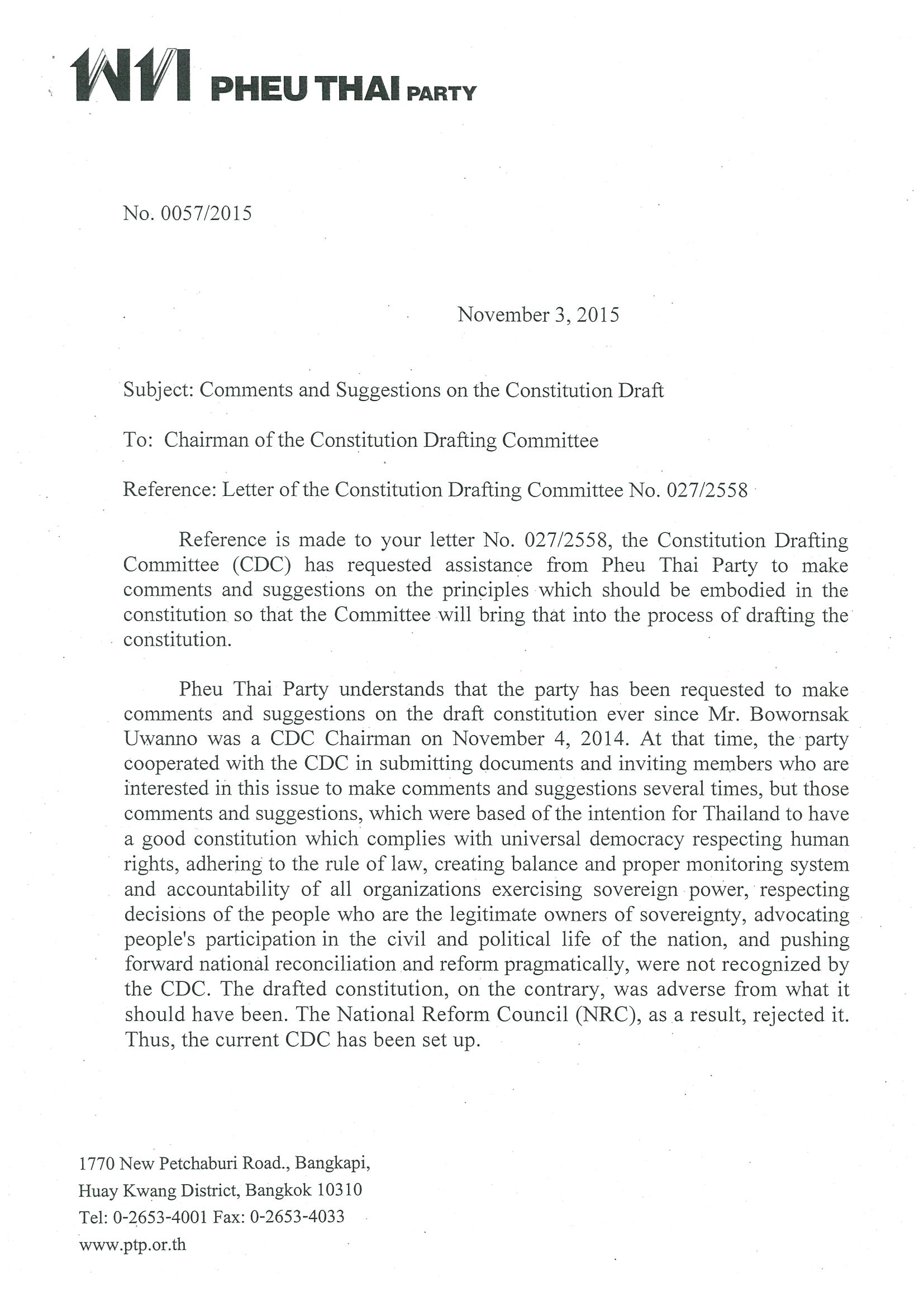
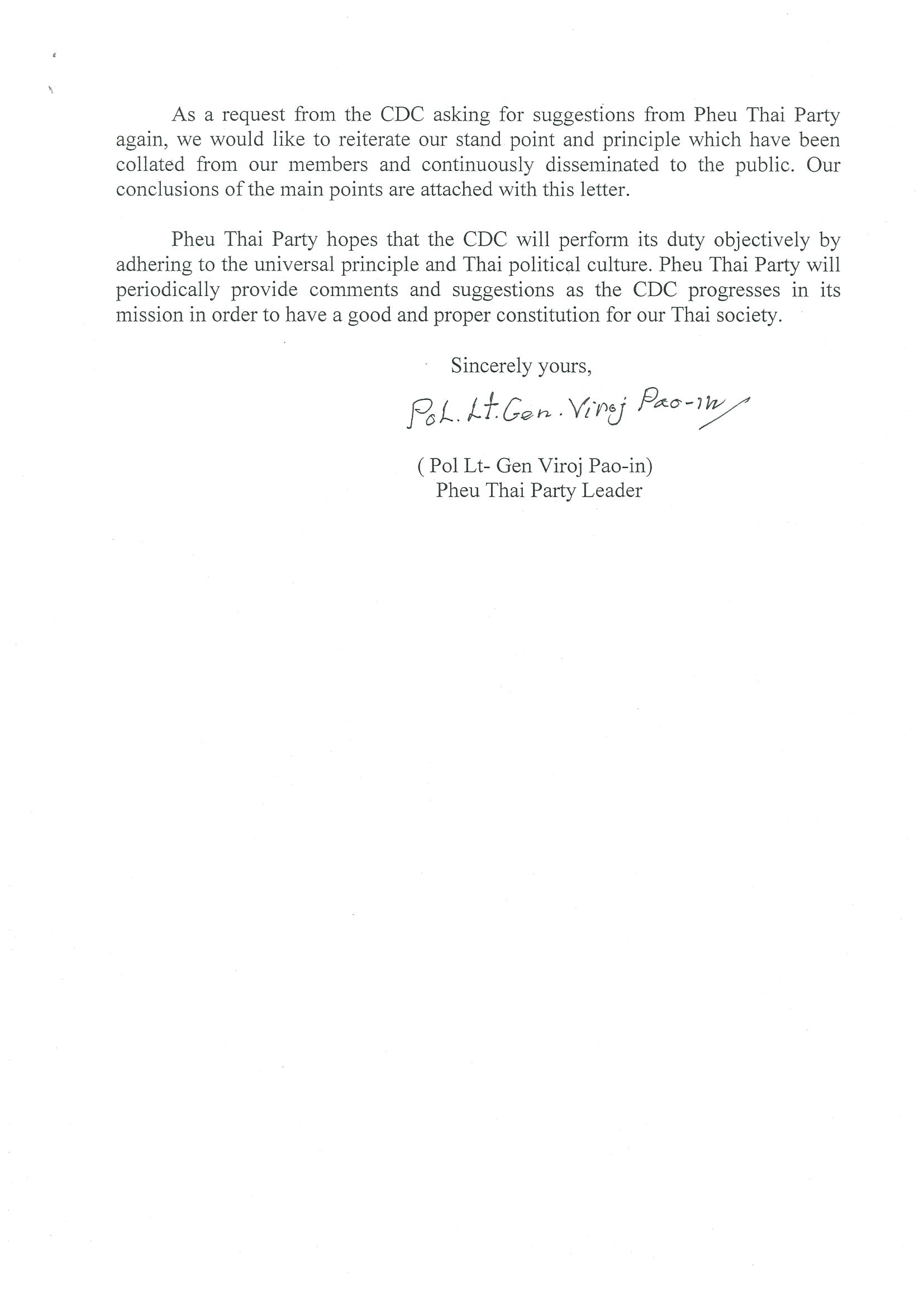
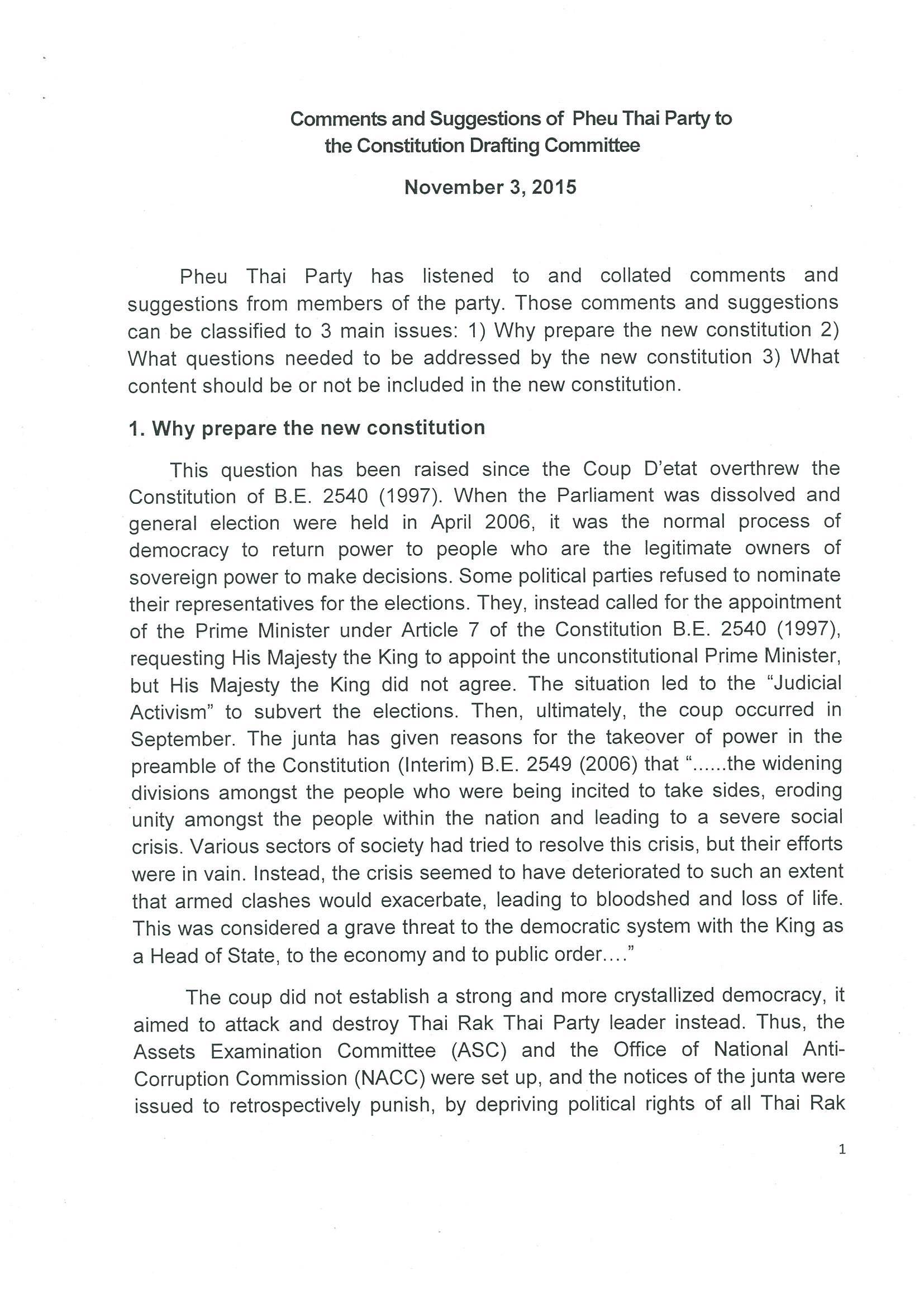
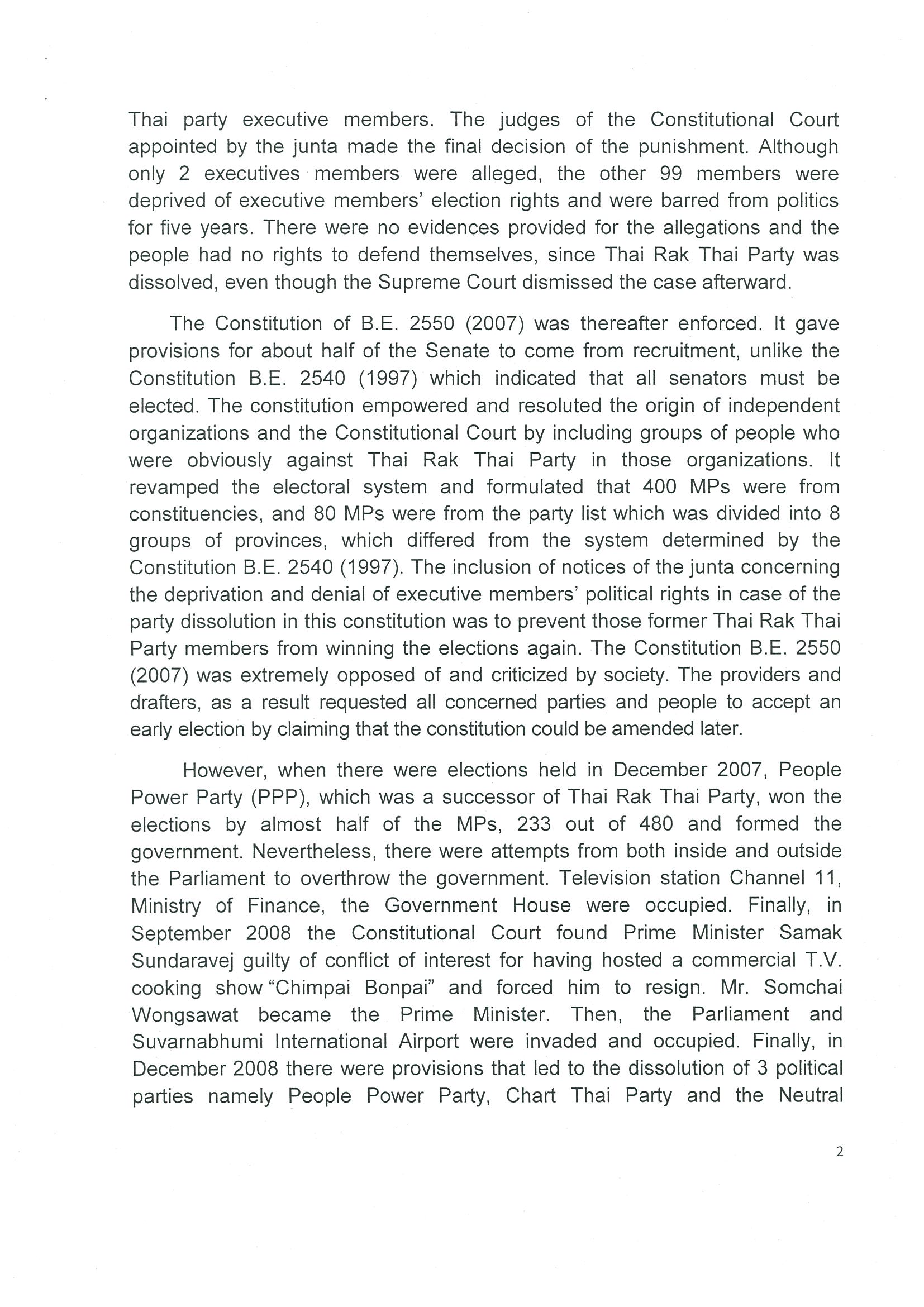
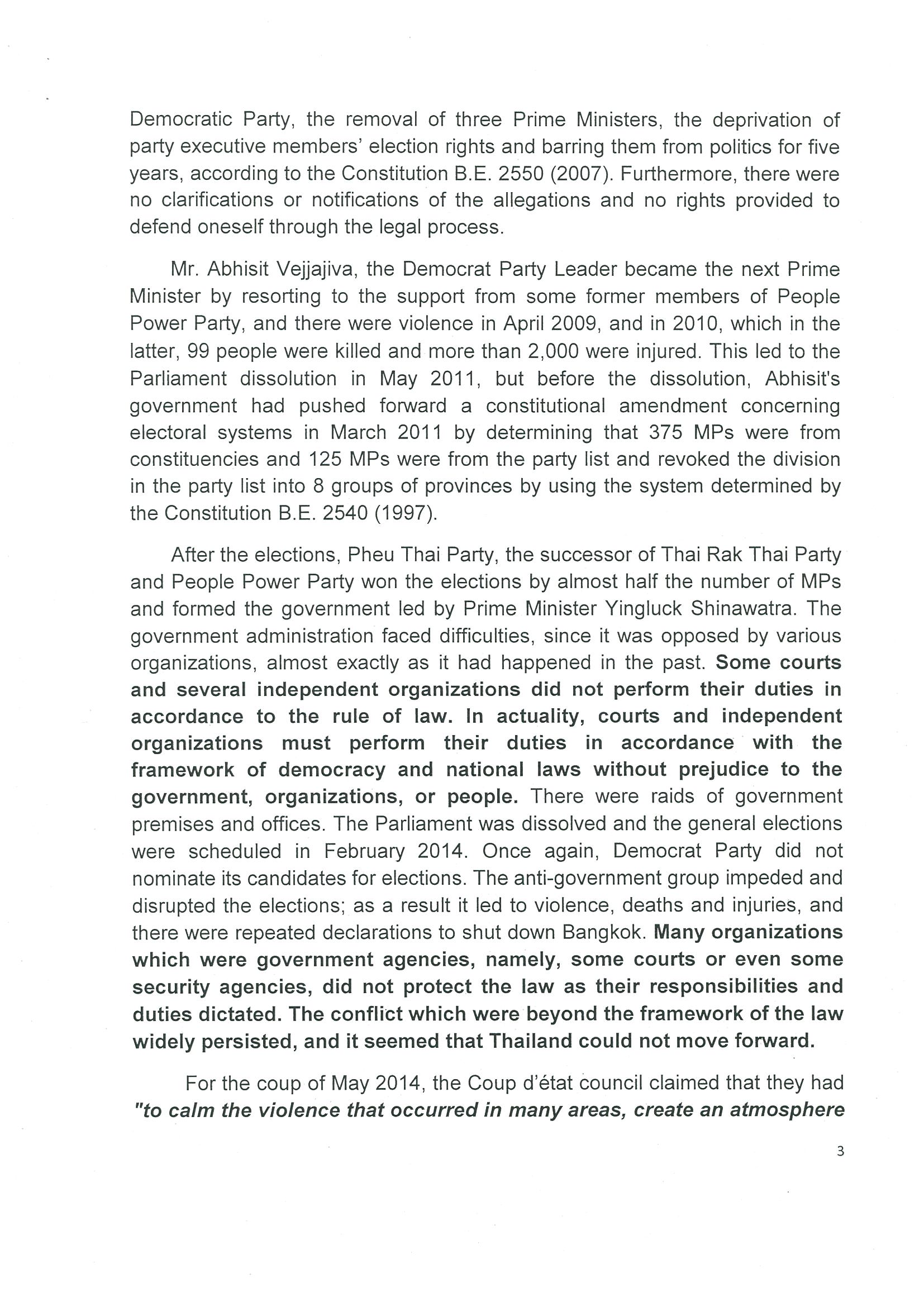
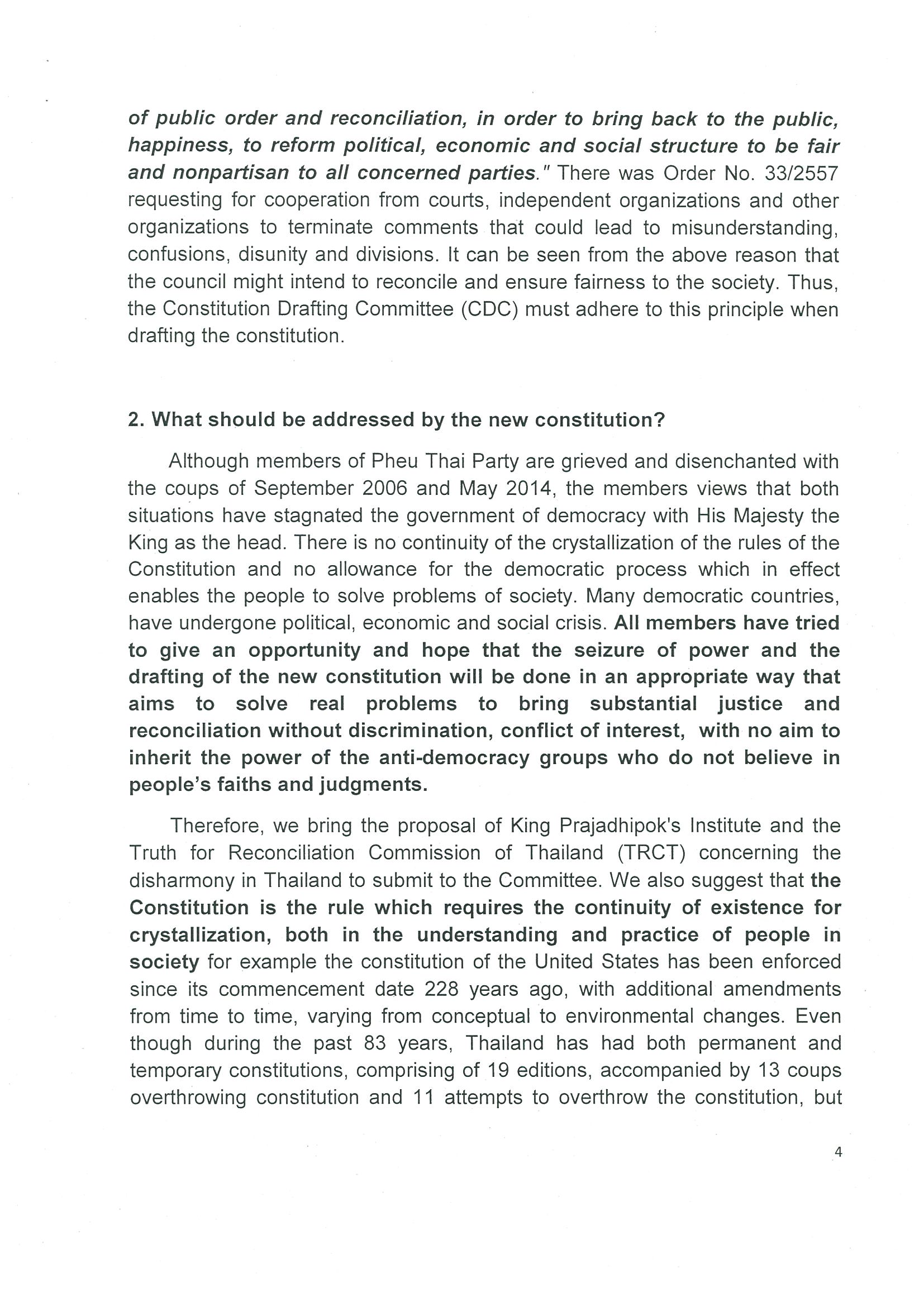
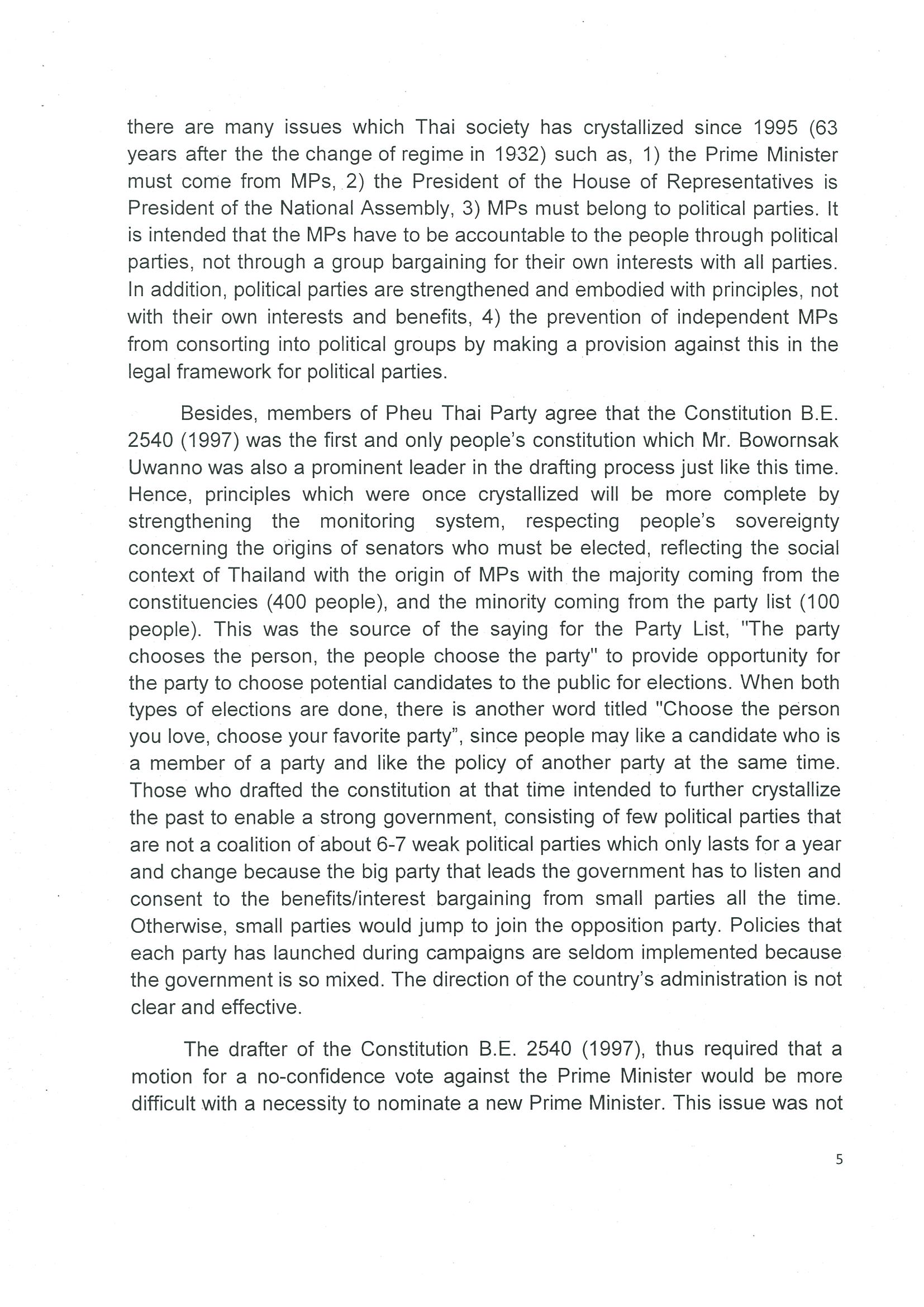
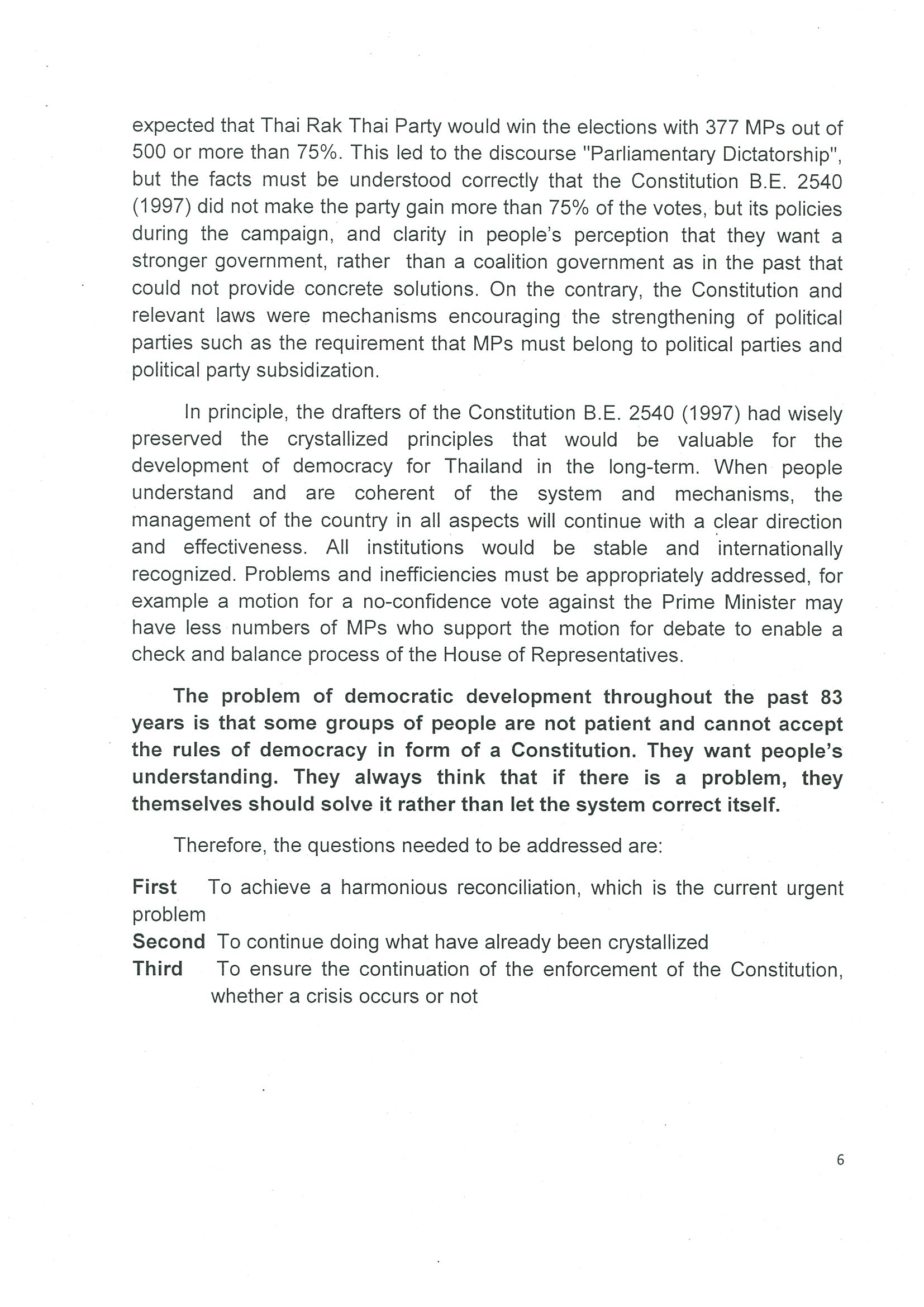
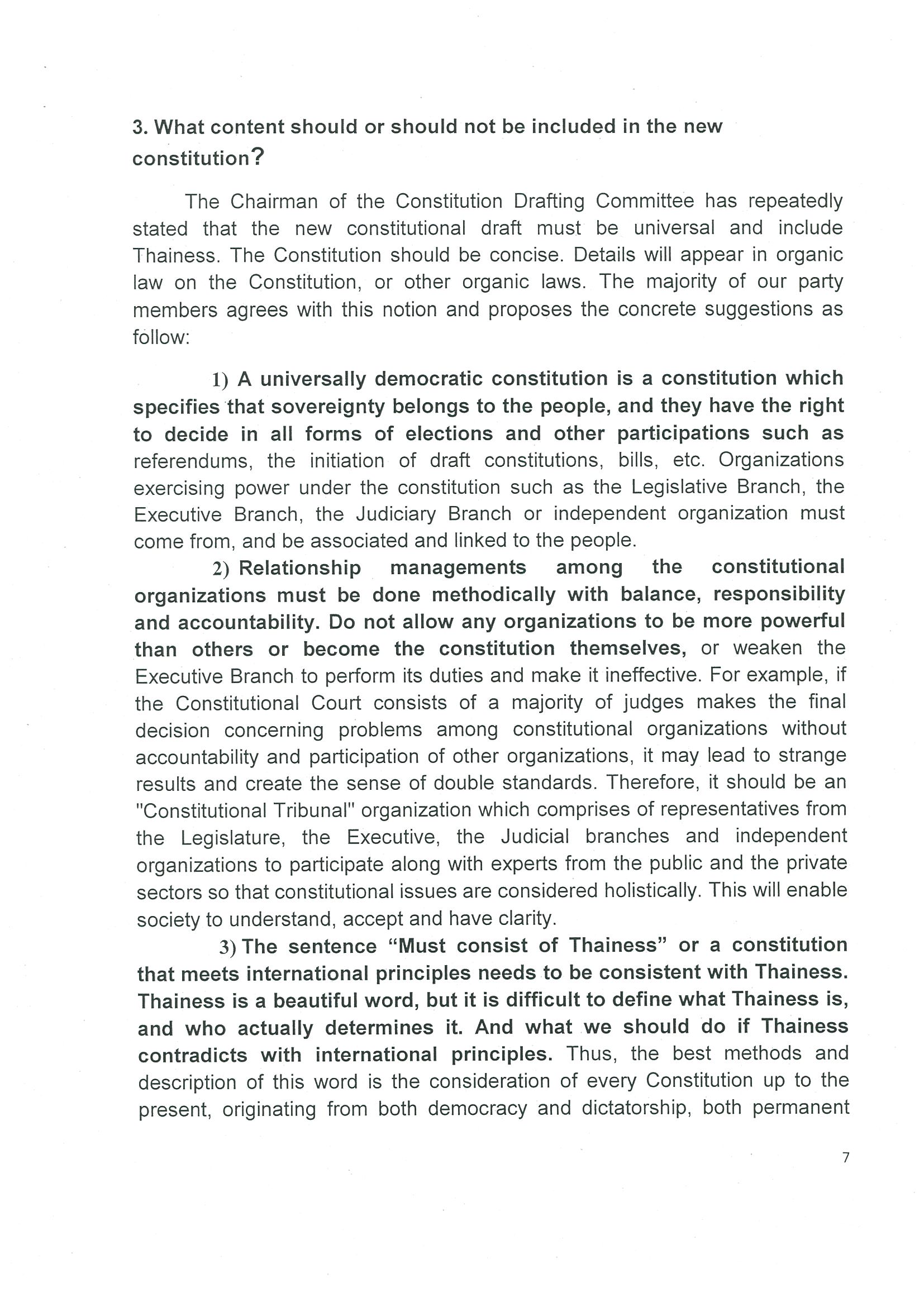
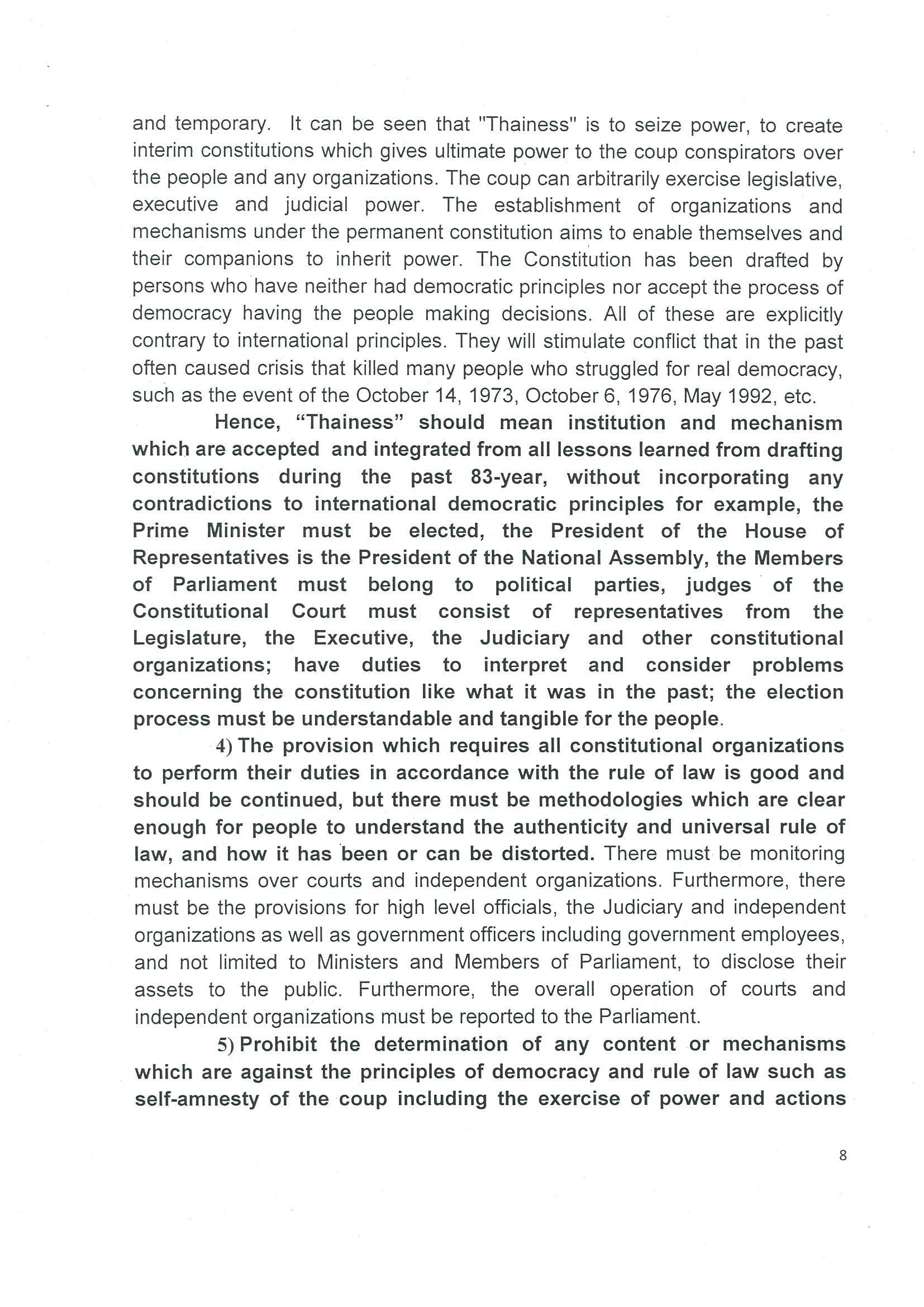
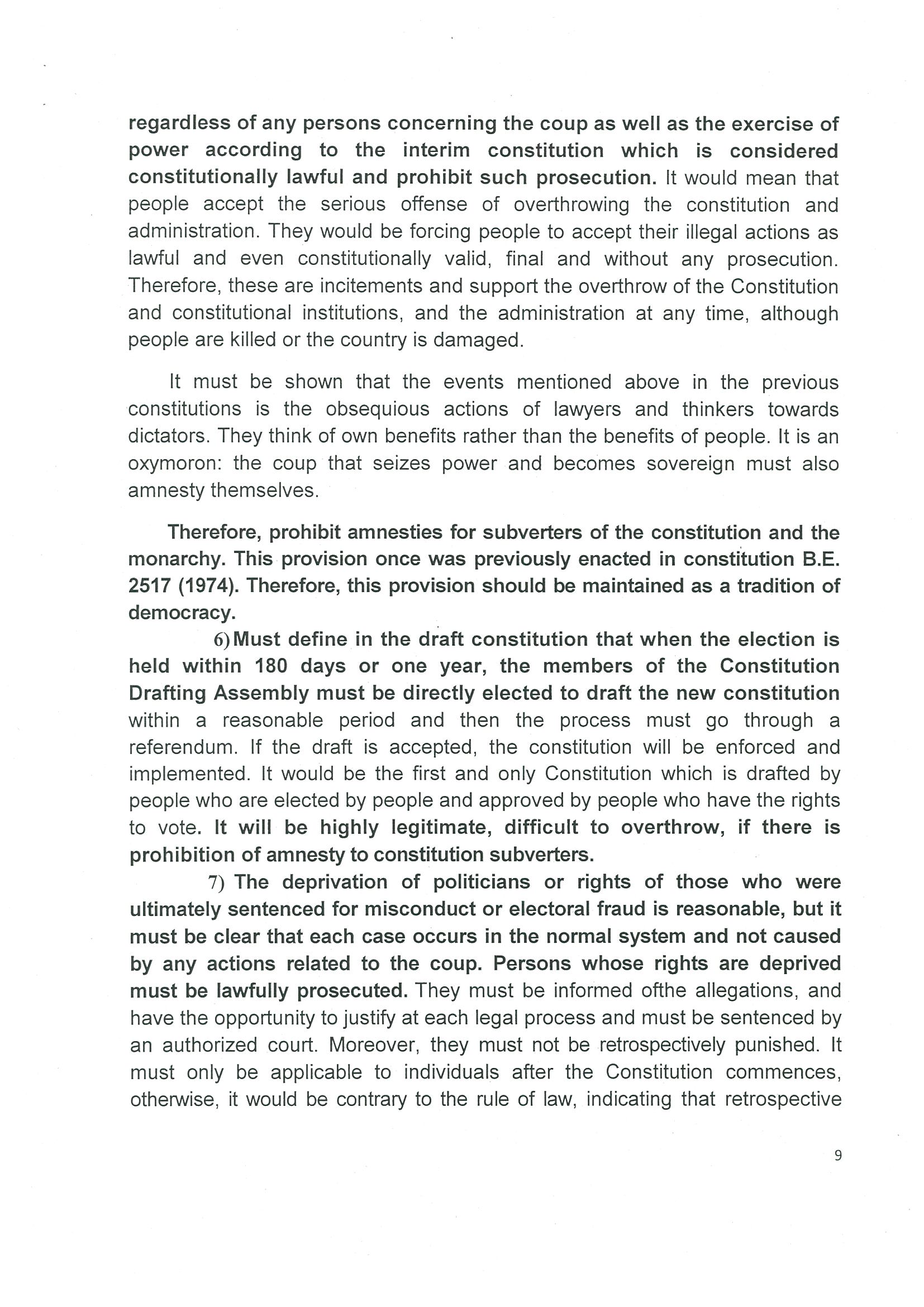
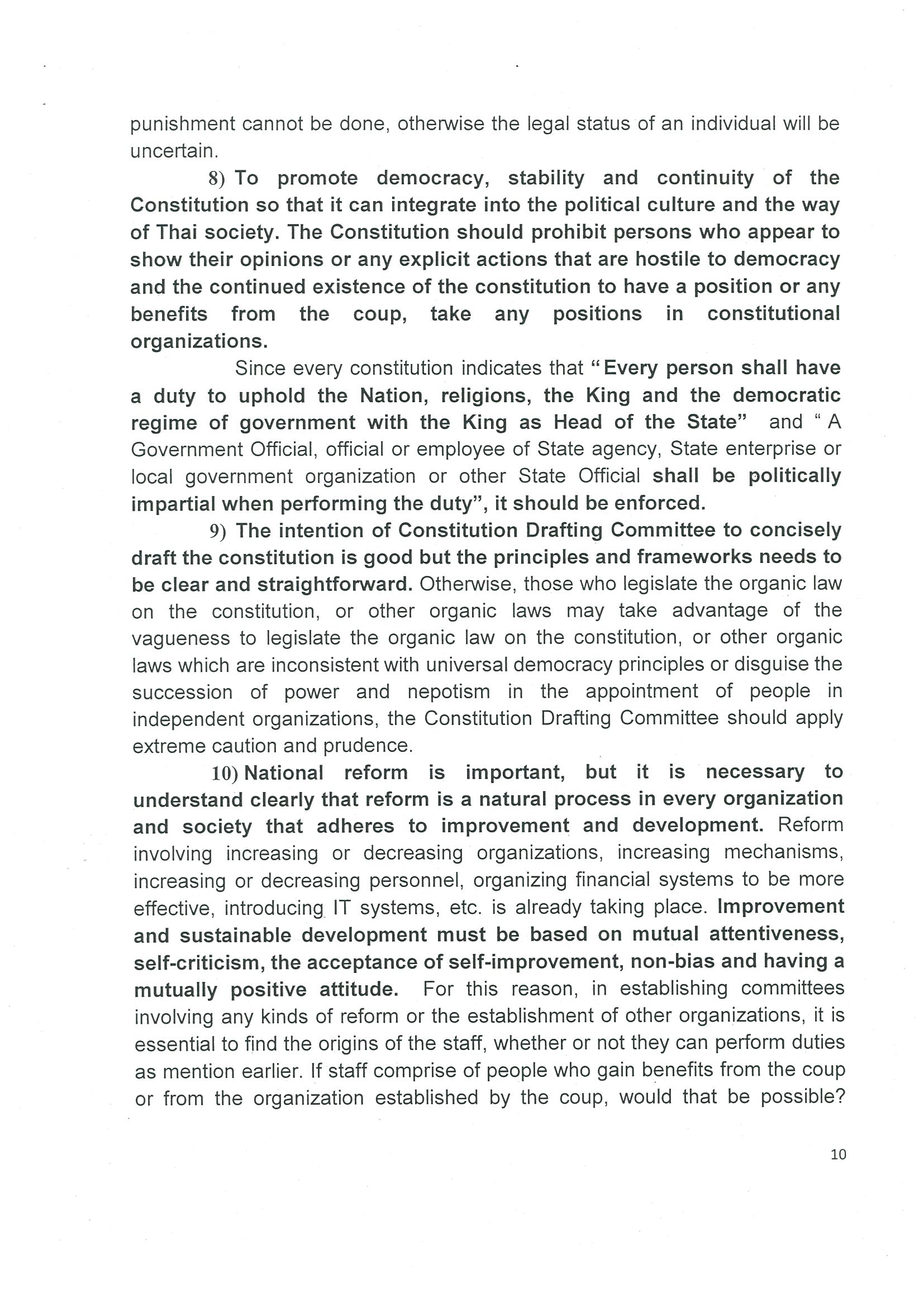
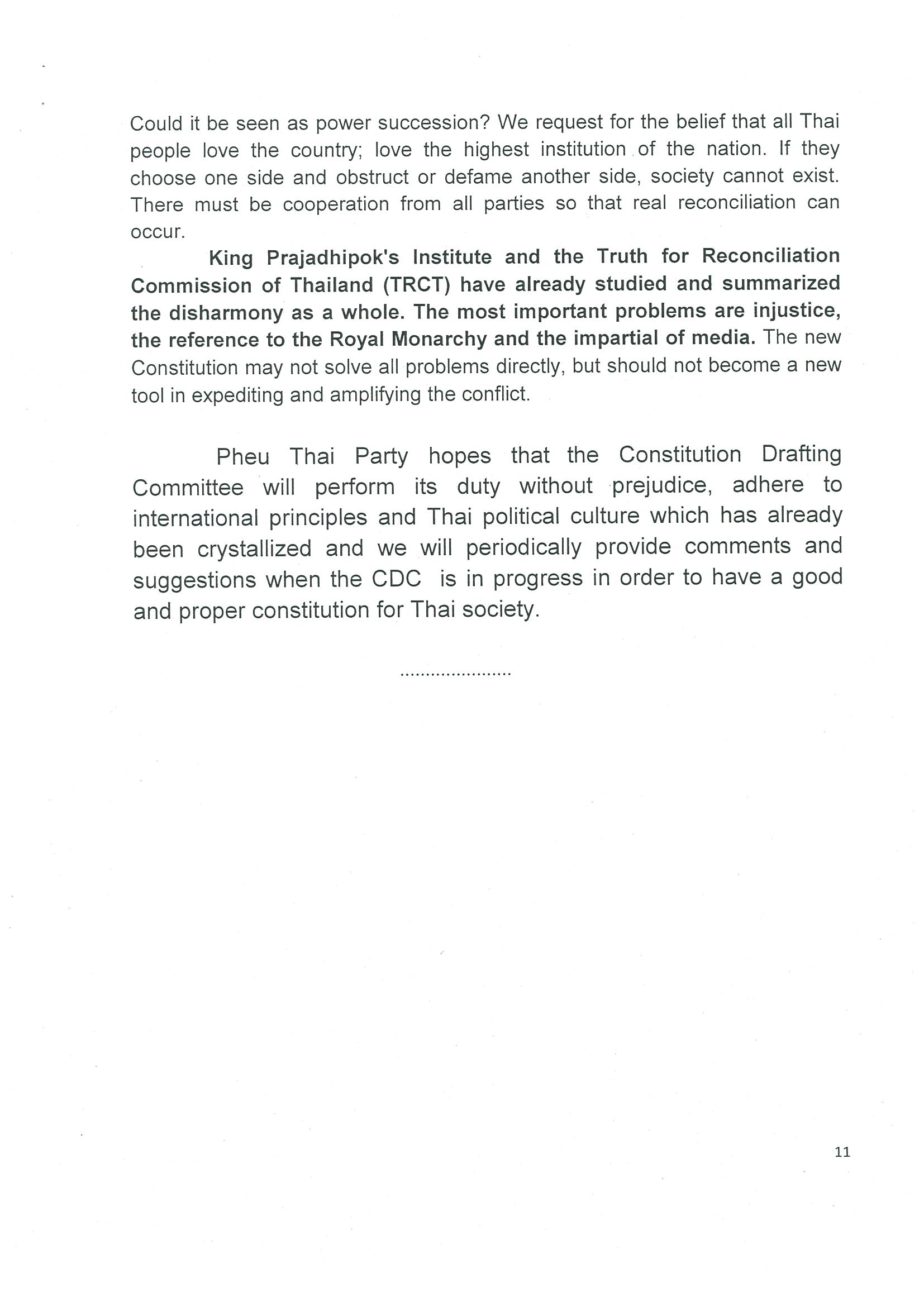
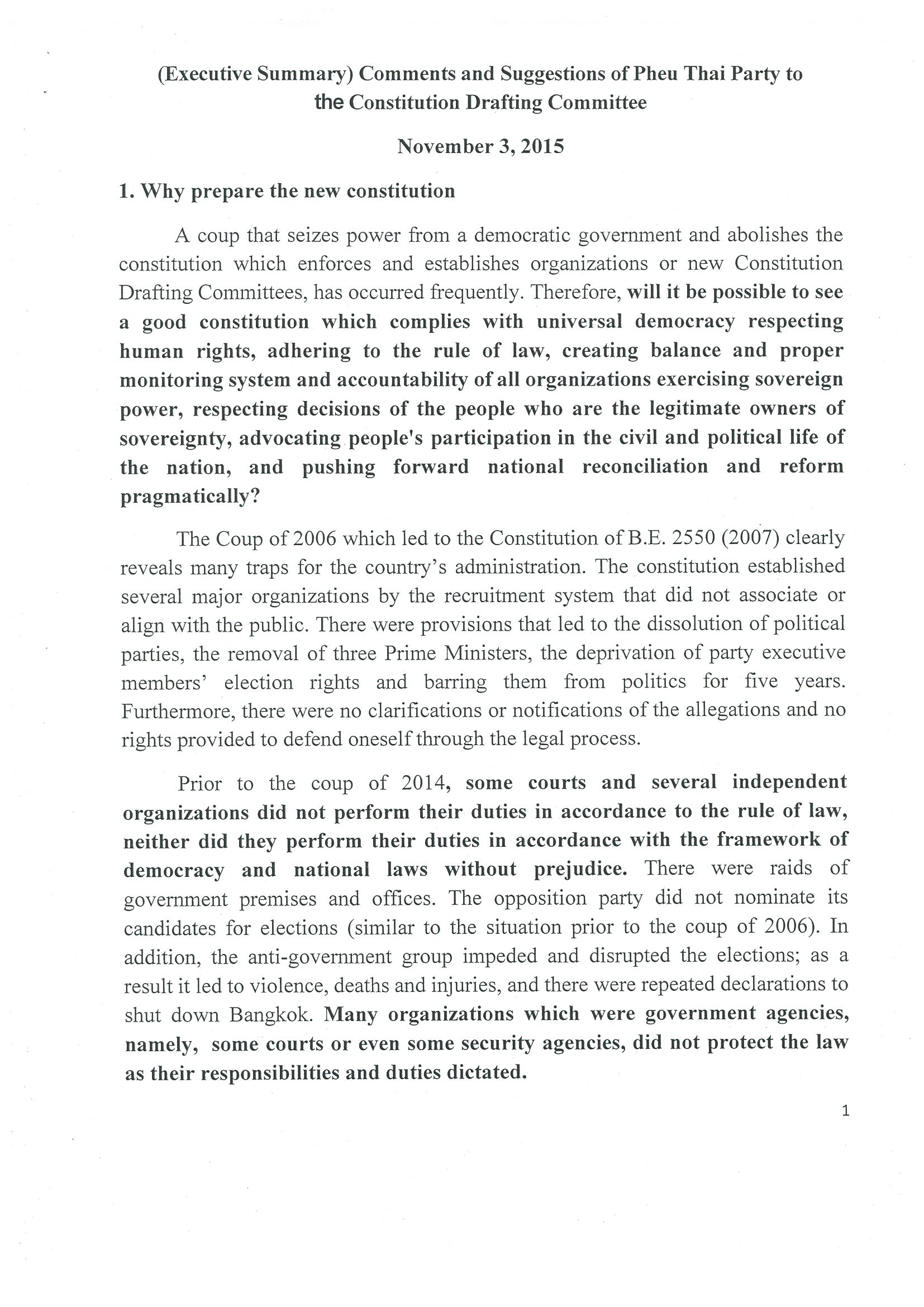
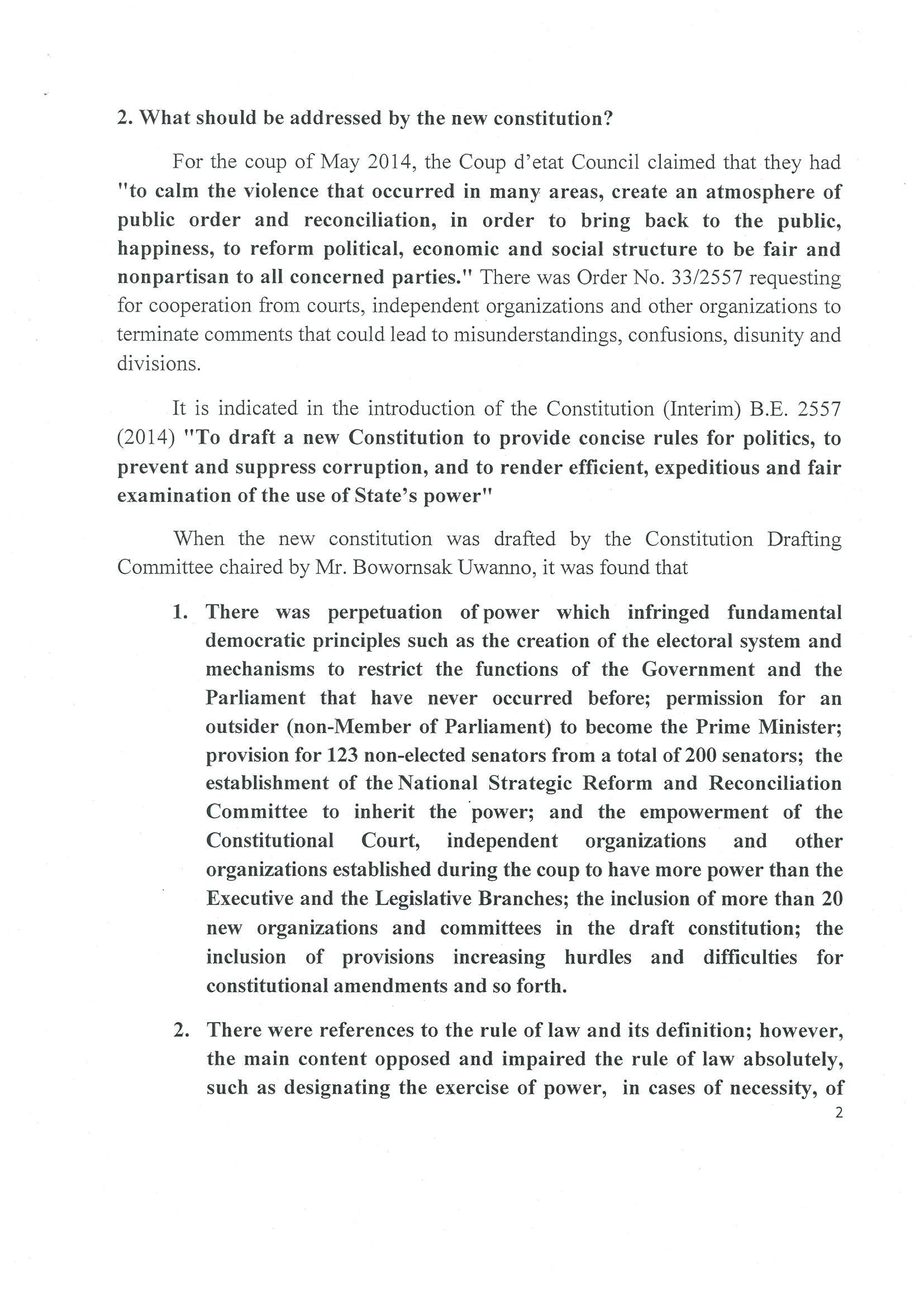
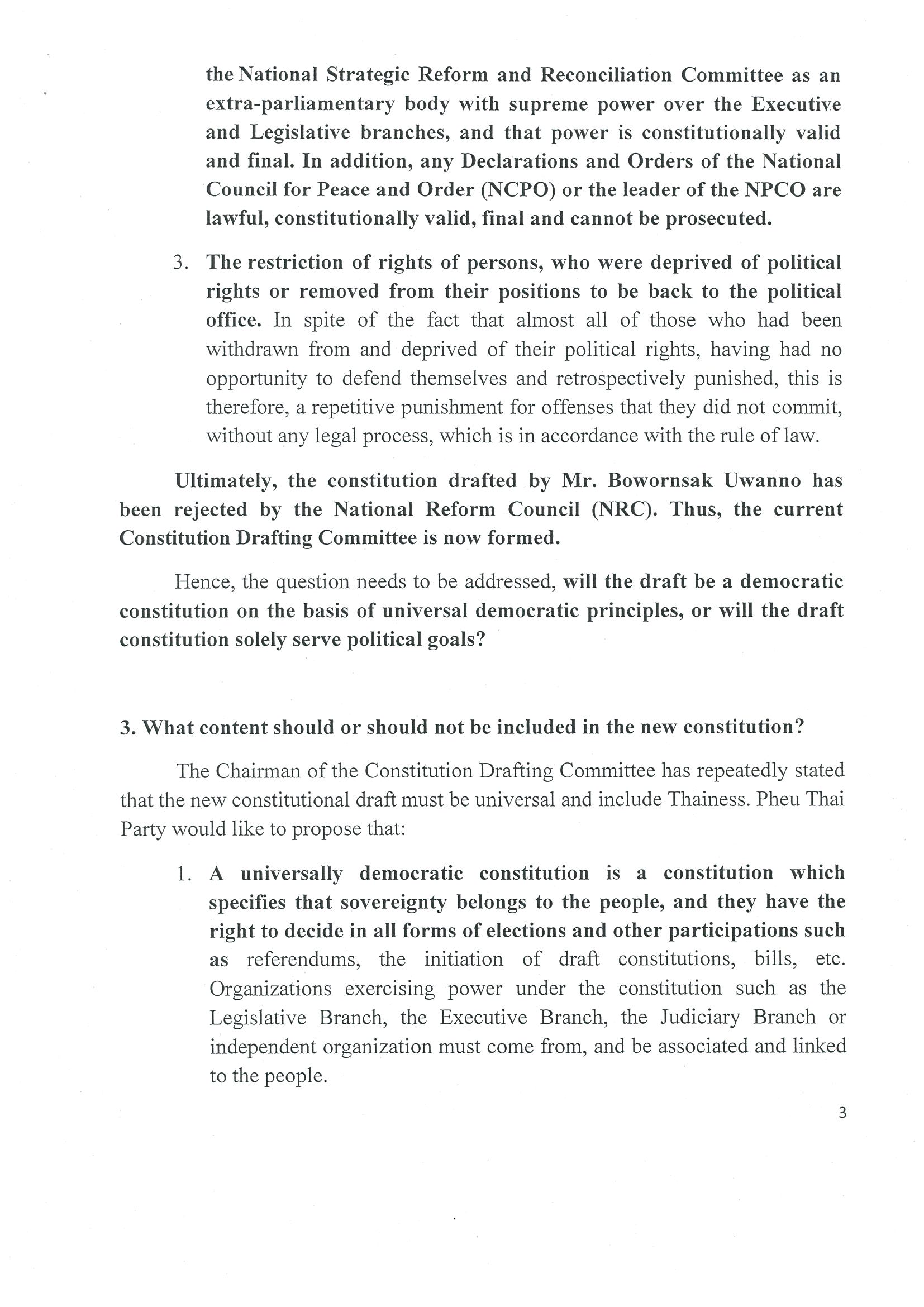
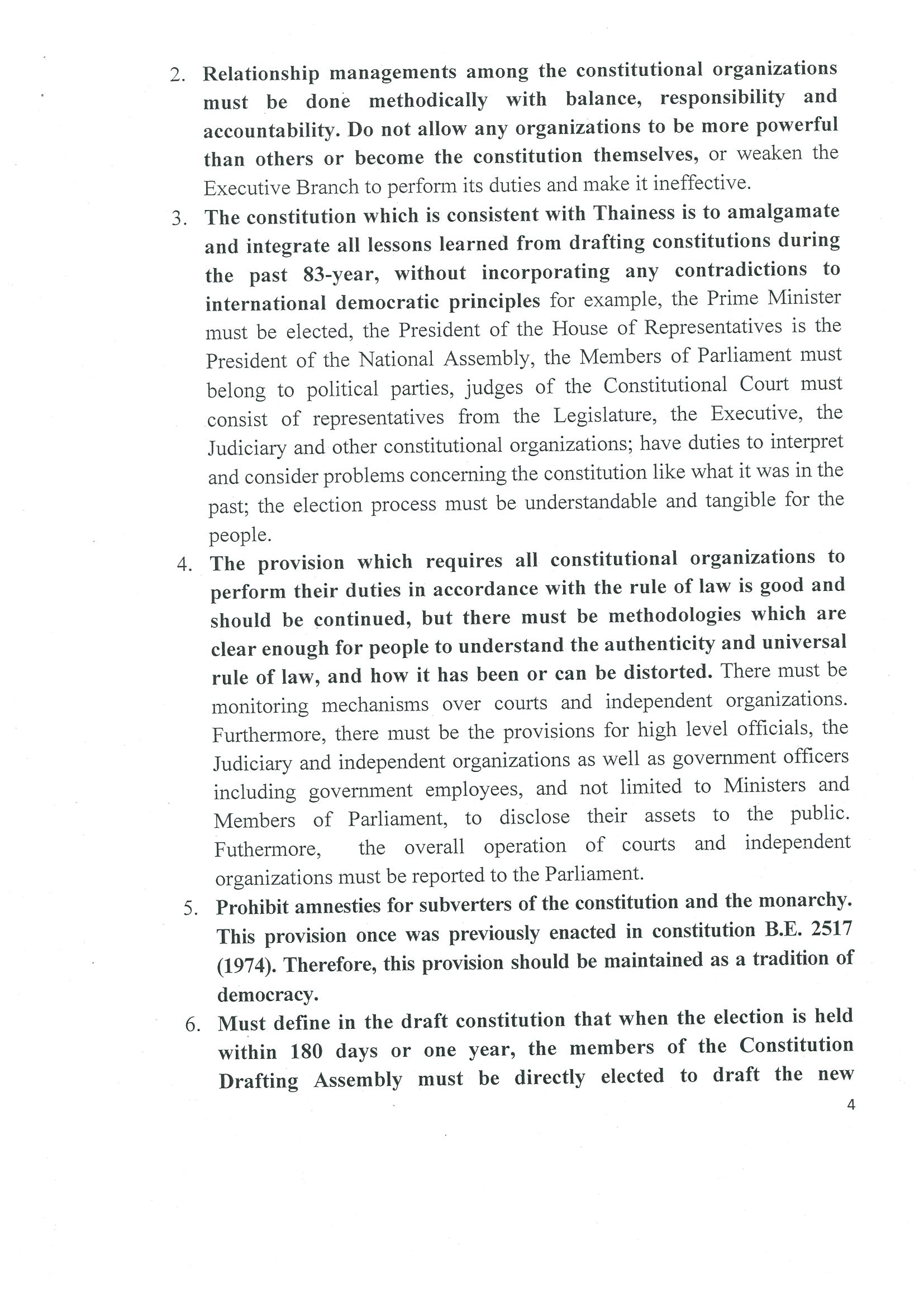
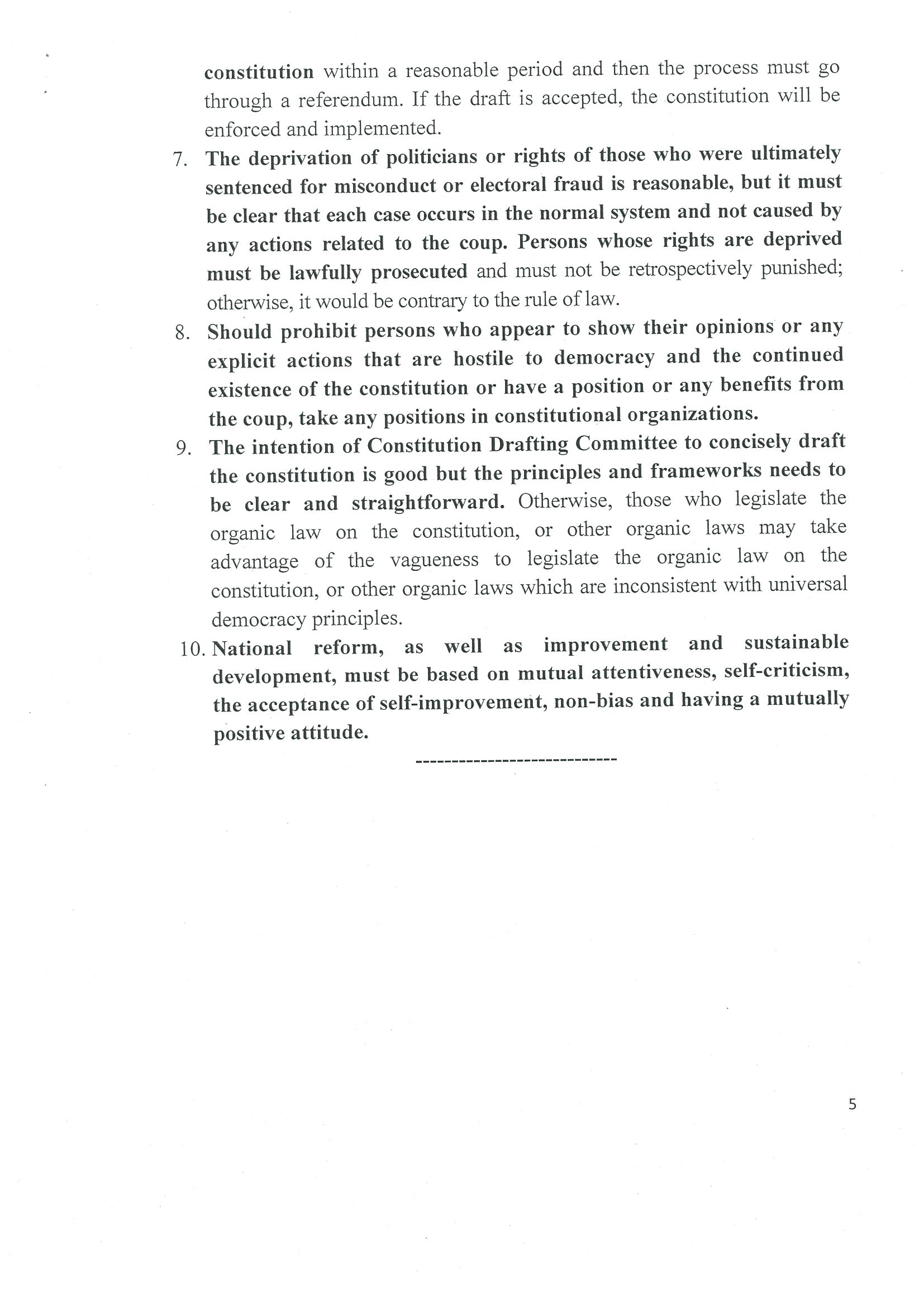
No. 0057/2015
November 3, 2015
Subject:Comments and Suggestions on the
Constitution Draft
To: Chairman of the Constitution Drafting Committee
Reference: Letter of the Constitution
Drafting Committee No. 027/2558
Reference is made to your letter No. 027/2558, the Constitution
Drafting Committee (CDC)has
requested assistance from Pheu Thai Party to make comments and suggestions on
the principles which should be embodied in the constitution so that the
Committee will bring that into the process of drafting the constitution.
Pheu Thai Party understands that the party has been requested to
make comments and suggestions on the draft constitution ever since Mr. Bowornsak Uwannowas a CDC
Chairman on November 4, 2014. At that time, the party cooperated with the CDC in
submitting documents and inviting members who are interested in this issue to
make comments and suggestions several times, but those comments and suggestions,
which were based of the intention for Thailand to have a good constitution which complies with universal democracy respecting
human rights, adhering to the rule of law, creating balance and proper
monitoring system and accountability of all organizations exercising sovereign
power, respecting decisions of the people who are the legitimate owners of
sovereignty, advocating people’s participationin the civil and political life of the
nation, and pushing forward national reconciliation and reform
pragmatically, were
not recognized by the CDC. The drafted constitution, on the contrary, was
adverse from what it should have been. The National Reform Council (NRC), as a
result, rejected it. Thus, the current CDC has been set up.
As
a request from the CDC asking for suggestions from Pheu Thai Party again, we
would like to reiterate our stand point and principle which have been collated
from our members and continuously disseminated to the public. Our conclusions
of the main points are attached with this letter.
Pheu Thai Party hopes that the CDC will perform its duty
objectively by adhering to the universal principle and Thai political culture.
Pheu Thai Party will periodically provide comments and suggestions as the CDC progresses
in its mission in order to have a good and proper constitution for our Thai
society.
Sincerely yours,
(Pol Lt- Gen VirojPao-in)
Pheu Thai Party Leader
————————————————
Comments and Suggestions of Pheu Thai Party to the
Constitution Drafting Committee
November
3,2015
Pheu Thai Party has listened to and collated comments and suggestions
from members of the party. Those comments and suggestions can be classified to
3 main issues: 1) Why prepare the new constitution 2) What questions needed to
be addressed by the new constitution 3)What content should be or not be
included in the new constitution.
1.Why prepare the new
constitution
This question has been raised since the
Coup D’etat overthrew the Constitution of B.E. 2540 (1997). When the Parliament
was dissolved and general election were held in April 2006, it was the normal
process of democracy to return power to people who are the legitimate owners of
sovereign power to make decisions. Some political parties refused to nominate
their representatives for the elections. They, instead called for the
appointment of the Prime Minister under Article 7 of the
Constitution B.E. 2540 (1997), requesting His Majesty the King to appoint the unconstitutional Prime Minister, but His
Majesty the King did not agree. The situation led to the “Judicial Activism”
to subvert the elections. Then, ultimately, the coup occurred in September. The
junta has given reasons for the takeover of power in the preamble of the
Constitution (Interim) B.E. 2549 (2006) that “……the widening divisions
amongst the people who were being incited to take sides, eroding unity amongst
the people within the nation and leading to a severe social crisis. Various
sectors of society had tried to resolve this crisis, but their efforts were in
vain. Instead, the crisis seemed to have deteriorated to such an extent that
armed clashes would exacerbate, leading to bloodshed and loss of life. This was
considered a grave threat to the democratic system with the King as a Head of
State, to the economy and to public order….”
The coup did not
establish a strong and more crystallized democracy, it aimed to attack and
destroy Thai Rak Thai Party leader instead. Thus, the Assets Examination Committee (ASC) and the Office of National
Anti-Corruption Commission (NACC) were set up, and the notices of the
junta were issued to retrospectively punish, by depriving political rights of
all Thai Rak Thai party executive members. The judges of the Constitutional Court
appointed by the junta made the final decision of the punishment. Although only
2 executives members were alleged, the other 99 members were deprived of
executive members’ election rights and were barred from politics for five years.
There were no evidences provided for the allegations and the people had no
rights to defend themselves, since Thai Rak Thai Party was dissolved, even
though the Supreme Court dismissed the case afterward.
The Constitution of B.E. 2550 (2007)
was thereafter enforced. It gave provisions for about half of the Senate to come
from recruitment, unlike the Constitution B.E. 2540 (1997) which indicated that
all senators must be elected. The constitution empowered and resoluted the origin
of independent organizations and the Constitutional Court by including groups
of people who were obviously against Thai Rak Thai Party in those organizations.
It revamped the electoral system and formulated that 400 MPs were from constituencies,
and 80 MPs were from the party list which was divided into 8 groups of provinces,
which differed from the system determined by the Constitution B.E. 2540 (1997).
The inclusion of notices of the junta concerning the deprivation and denial of
executive members’ political rights in case of the party dissolution in this
constitution was to prevent those former Thai Rak Thai Party members from
winning the elections again. The Constitution B.E. 2550 (2007) was extremely
opposed of and criticized by society. The
providers and drafters, as a result requested all concerned parties and people to
accept an early election by claiming that the constitution could be amended later.
However, when there were elections held
in December 2007, People Power Party (PPP), which was a successor of Thai Rak
Thai Party, won the elections by almost half of the MPs, 233 out of 480 and
formed the government. Nevertheless, there were attempts from both inside and
outside the Parliament to overthrow the government. Television station Channel
11, Ministry of Finance, the Government House were occupied. Finally, in
September 2008 the Constitutional Court found Prime Minister Samak Sundaravej guilty
of conflict of interest for having hosted a commercial T.V. cooking show “Chimpai Bonpai” and forced him to
resign. Mr. Somchai Wongsawat became the Prime Minister. Then, the Parliament
and Suvarnabhumi International Airport were invaded and occupied. Finally, in
December 2008 there were provisions that led to the dissolution of 3 political
parties namely People Power Party, Chart Thai Party and the Neutral Democratic
Party, the removal of three Prime Ministers, the deprivation of party executive
members’ election rights and barring them from politics for five years,
according to the Constitution B.E. 2550 (2007). Furthermore, there were no
clarifications or notifications of the allegations and no rights provided to
defend oneself through the legal process.
Mr. Abhisit Vejjajiva, the
Democrat Party Leader became the next Prime Minister by resorting to the
support from some former members of People Power Party, and there were violence
in April 2009, and in 2010, which in the latter, 99 people were killed and more
than 2,000 were injured. This led to the Parliament dissolution in May 2011,
but before the dissolution, Abhisit’s government had pushed forward a
constitutional amendment concerning electoral systems in March 2011 by determining that 375 MPs were from constituencies
and 125 MPs were from the party list and revoked the division in the party list
into 8 groups of provinces by using the
system determined by the Constitution B.E. 2540 (1997).
After the elections, Pheu Thai Party,
the successor of Thai Rak Thai Party and People Power Party won the elections
by almost half the number of MPs and formed the government led by Prime
Minister Yingluck Shinawatra. The government administration faced difficulties,
since it was opposed by various organizations, almost exactly as it had happened
in the past. Some courts and several independent organizations did not
perform their duties in accordance to the rule of law. In actuality, courts and
independent organizations must perform their duties in accordance with the
framework of democracy and national laws without prejudice to the government,
organizations, or people. There were raids of government premises and
offices. The Parliament was dissolved and the general elections were scheduled
in February 2014. Once again, Democrat Party did not nominate its candidates
for elections. The anti-government group impeded and disrupted the elections;
as a result it led to violence, deaths and injuries, and there were repeated declarations
to shut down Bangkok. Many organizations which were government agencies,
namely, some courts or even some security agencies, did not protect the law as
their responsibilities and duties dictated. The conflict which were beyond the
framework of the law widely persisted, and it seemed that Thailand could not
move forward.
For the coup of
May 2014, the Coup d’état council claimed
that they had “to calm the violence that occurred in many areas,
create an atmosphere of public order and reconciliation, in order to bring back
to the public, happiness, to reform political, economic and social structure to
be fair and nonpartisan to all concerned parties.” There
was Order No. 33/2557 requesting for cooperation from courts, independent
organizations and other organizations to terminate comments that could lead to misunderstanding,
confusions, disunity and divisions. It can be seen from the above reason that
the council might intend to reconcile and ensure fairness to the society. Thus,
the Constitution Drafting Committee (CDC) must
adhere to this principle when drafting the constitution.
2.What should be
addressed by the new constitution?
Although members of Pheu Thai Party are grieved
and disenchanted with the coups of September 2006 and May 2014, the members
views that both situations have stagnated the government
of democracy with His Majesty the King as the head. There is no
continuity of the crystallization of the rules of the Constitution and no
allowance for the democratic process which in effect enables the people to
solve problems of society. Many democratic countries, have undergone political,
economic and social crisis. All members have tried to give an opportunity
and hope that the seizure of power and the drafting of the new constitution
will be done in an appropriate way that aims to solve real problems to bring
substantial justice and reconciliation without discrimination, conflict of
interest, with no aim to inherit the
power of the anti-democracy groups who do not believe in people’s faiths and judgments.
Therefore, we bring the proposal of
King Prajadhipok’s Institute and the Truth for Reconciliation Commission of
Thailand (TRCT) concerning the disharmony in Thailand to submit to the
Committee. We also suggest that the Constitution is the rule which requires
the continuity of existence for crystallization, both in the understanding and
practice of people in society for example the constitution of the United
States has been enforced since its commencement date 228 years ago, with
additional amendments from time to time, varying from conceptual to
environmental changes. Even though during the past 83 years, Thailand has had both
permanent and temporary constitutions, comprising of 19 editions, accompanied
by 13 coups overthrowing constitution and 11 attempts to overthrow the
constitution, but there are many issues which Thai society has crystallized
since 1995 (63 years after the thechangeofregimein 1932) such as, 1) the Prime
Minister must come from MPs, 2) the President of the House of Representatives
is President of the National Assembly, 3) MPs must belong to political parties.
It is intended that the MPs have to be accountable to the people through
political parties, not through a group bargaining for their own interests with
all parties. In addition, political parties are strengthened and embodied with principles,
not with their own interests and benefits, 4) the prevention of independent MPs
from consorting into political groups by making a provision against this in the
legal framework for political parties.
Besides, members of Pheu Thai Party
agree that the Constitution B.E. 2540 (1997) was the first and only people’s
constitution which Mr. Bowornsak Uwannowas also a prominent leader in the
drafting process just like this time. Hence, principles which were once
crystallized will be more complete by strengthening the monitoring system, respecting
people’s sovereignty concerning the origins of senators who must be elected,
reflecting the social context of Thailand with the origin of MPs with the majority
coming from the constituencies (400 people), and the minority coming from the party
list (100 people). This was the source of the saying for the Party List, “The
party chooses the person, the people choose the party” to provide opportunity
for the party to choose potential candidates to the public for elections.When both types of elections are done,
there is another word titled “Choose the person you love, choose your
favorite party”, since people may like a candidate who is a member of a party
and like the policy of another party at the same time. Those who drafted the constitution at that
time intended to further crystallize the past to enable a strong government,
consisting of few political parties that are not a coalition of about 6-7 weak political
parties which only lasts for a year and change because the big party that leads
the government has to listen and consent to the benefits/interest bargaining from
small parties all the time. Otherwise, small parties would jump to join the opposition
party. Policies that each party has launched during campaigns are seldom
implemented because the government is so mixed. The direction of the country’s
administration is not clear and effective.
The drafter of the Constitution B.E. 2540
(1997), thus required that a motion for a no-confidence vote againstthe Prime Minister would be more difficult with
a necessity to nominate a new Prime Minister. This issue was not expected that Thai
Rak Thai Party would win the elections with 377 MPs out of 500 or more than
75%. This led to the discourse “Parliamentary Dictatorship”, but the
facts must be understood correctly that the Constitution B.E. 2540 (1997) did
not make the party gain more than 75% of the votes, but its policies during the
campaign, and clarity in people’s perception that they want a stronger government,
rather than a coalition government as in
the past that could not provide concrete solutions. On the contrary, the
Constitution and relevant laws were mechanisms encouraging the strengthening of
political parties such as the requirement that MPs must belong to political
parties and political party subsidization.
In principle, the drafters of the Constitution
B.E. 2540 (1997) had wisely preserved the crystallized principles that would be
valuable for the development of democracy for Thailand in the long-term. When
people understand and are coherent of the system and mechanisms, the management
of the country in all aspects will continue with a clear direction and
effectiveness. All institutions would be stable and internationally recognized.
Problems and inefficiencies must be appropriately addressed, for example a
motion for a no-confidence vote against the
Prime Minister may have less numbers of MPs who support the motion for debate
to enable a check and balance process of the House of Representatives.
The problem of democratic development
throughout the past 83 years is that some groups of people are not patient and cannot
accept the rules of democracy in form of a Constitution. They want people’s understanding.
They always think that if there is a problem, they themselves should solve it
rather than let the system correct itself.
Therefore, the questions needed to be addressed
are:
First To achieve a harmonious reconciliation,
which is the current urgent problem
SecondTo continue doing what have already been
crystallized
Third To
ensure the continuation of the enforcement of the Constitution, whether a
crisis occurs or not
3.What content should
or should not be included in the new constitution?
The
Chairman of the Constitution Drafting Committee has repeatedly stated that the new constitutional draft must
be universal and include Thainess. The Constitution should be concise. Details
will appear in organic law on the Constitution, or other organic laws. The majority
of our party members agrees with this notion and proposes the concrete
suggestions as follow:
1) A universally democratic constitution
is a constitution which specifies that sovereignty belongs to the people,and they have the right to decide in
all forms of elections and other participations such as referendums, the initiation of draft
constitutions, bills, etc.Organizations
exercising power under the constitution such as the Legislative Branch, the
Executive Branch, the Judiciary Branch or independent organization must come
from, and be associated and linked to the people.
2) Relationship managements among the
constitutional organizationsmust
be done methodically with balance, responsibility and accountability. Do not
allow any organizations to be more powerful than others or become the
constitution themselves,
or weaken the Executive Branch to perform its duties and make it ineffective. For
example, if the Constitutional Court consists of a majority of judges makes the
final decision concerning problems among constitutional organizations without accountability
and participation of other organizations, it may lead to strange results and
create the sense of double standards. Therefore, it should be an “Constitutional
Tribunal” organization which comprises of representatives from the
Legislature, the Executive, the Judicial branches and independent organizations
to participate along with experts from the public and the private sectors so
that constitutional issues are considered holistically. This will enable society
to understand, accept and have clarity.
3) The sentence “Must consist of Thainess”
or a constitution that meets international principles needs to be consistent
with Thainess. Thainess is a beautiful word, but it is difficult to define what
Thainess is, and who actually determines it. And what we should do if Thainess
contradicts with international principles. Thus, the best methods and description of this word is the
consideration of every Constitution up to the present, originating from both
democracy and dictatorship, both permanent and temporary. It can be seen that “Thainess” is
to seize power, to create interim constitutions which gives ultimate power to
the coup conspirators over the people and any organizations. The coup can arbitrarily
exercise legislative, executive and judicial power. The establishment of
organizations and mechanisms under the permanent constitution aims to enable
themselves and their companions to inherit power. The Constitution has been
drafted by persons who have neither had democratic principles nor accept the process
of democracy having the people making decisions. All of these are explicitly contrary
to international principles. They will stimulate conflict that in the past often
caused crisisthat killed many people who struggled for real democracy,
such as the event of the October 14, 1973, October 6, 1976, May 1992, etc.
Hence, “Thainess” should mean
institution and mechanism which are accepted and integrated from all lessons learned from
drafting constitutions during the past 83-year, without incorporating any
contradictions to international democratic principles for example, the Prime
Minister must be elected, the President of the House of Representatives is the
President of the National Assembly, the Members of Parliament must belong to
political parties, judges of the Constitutional Court must consist of
representatives from the Legislature, the Executive, the Judiciary and other
constitutional organizations; have duties to interpret and consider problems
concerning the constitution like what it was in the past; the election process
must be understandable and tangible for the people.
4) The provision which requires all
constitutional organizations to perform their duties in accordance with the
rule of law is good and should be continued, but there must be methodologies
which are clear enough for people to understand the authenticity and universal
rule of law, and how it has been or can be distorted. There must be monitoring mechanisms
over courts and independent organizations. Furthermore, there must be the
provisions for high level officials, the Judiciary and independent
organizations as well as government officers including government employees,
and not limited to Ministers and Members of Parliament, to disclose their
assets to the public. Furthermore, the overall operation of courts and
independent organizations must be reported to the Parliament.
5) Prohibit the determination of any
content or mechanisms which are against the principles of democracy and rule of
law such as self-amnesty of the coup including the exercise of power and
actions regardless of any persons concerning the coup as well as the exercise
of power according to the interim constitution which is considered
constitutionally lawful and prohibit such prosecution. It would mean that people accept the serious
offense of overthrowing the constitution and administration. They would be forcing
people to accept their illegal actions as lawful and even constitutionally
valid, final and without any prosecution. Therefore, these are incitements and support
the overthrow of the Constitution and constitutional institutions, and the administration
at any time, although people are killed or the country is damaged.
It must be shown
that the events mentioned above in the previous constitutions is the obsequious
actions of lawyers and thinkers towards dictators. They think of own benefits
rather than the benefits of people. It is an oxymoron: the coup that seizes
power and becomes sovereign must also amnesty themselves.
Therefore, prohibit
amnesties for subverters of the constitution and the monarchy. This provision
once was previously enacted in constitution B.E. 2517 (1974). Therefore, this
provision should be maintained as a tradition of democracy.
6)Must define in the draft constitution
that when the election is held within 180 days or one year, the members of the
Constitution Drafting Assembly must be directly elected to draft the new constitution within a reasonable period and then
the process must go through a referendum. If the draft is accepted, the
constitution will be enforced and implemented. It would be the first and only
Constitution which is drafted by people who are elected by people and approved
by people who have the rights to vote. It will be highly legitimate,
difficult to overthrow, if there is prohibition of amnesty to constitution subverters.
7) The deprivation of
politicians or rights of those who were ultimately sentenced for misconduct or
electoral fraud is reasonable, but it must be clear that each case occurs in
the normal system and not caused by any actions related to the coup. Persons
whose rights are deprived must be lawfully prosecuted.They must be informed ofthe allegations, and have the
opportunity to justify at each legal process and must be sentenced by an authorized
court. Moreover, they must not be
retrospectively punished. It must only be applicable to individuals
after the Constitution commences, otherwise,
it would be contrary to the rule of law, indicating that retrospective
punishment cannot be done, otherwise the legal status of an individual will be
uncertain.
8) To promote democracy, stability and
continuity of the Constitution so that it can integrate into the political
culture and the way of Thai society. The Constitution should prohibit persons
who appear to show their opinions or any explicit actions
that are hostile to democracy and the continued existence of the constitution to
have a position or any benefits from the coup, take any positions in
constitutional organizations.
Since
every constitution indicates that “Every person shall
have a duty to uphold the Nation, religions, the King and the democratic regime
of government with the King as Head of the State”and “A Government Official, official or
employee of State agency, State enterprise or local government organization or
other State Official shall be politically impartial when performing the duty”, it should be enforced.
9) The intention of Constitution Drafting
Committee to concisely draft the constitution is good but the principles and
frameworks needs to be clear and straightforward. Otherwise, those who legislate the
organic law on the constitution, or other organic laws may take advantage of
the vagueness to legislate the organic law on the constitution, or other
organic laws which are inconsistent with universal democracy principles or
disguise the succession of power and nepotism in the appointment of people in independent
organizations, the Constitution Drafting Committee should apply extreme caution
and prudence.
10)
National
reform is important, but it is necessary to understand clearly that reform is a
natural process in every organization and society that adheres to improvement
and development. Reform
involving increasing or decreasing organizations, increasing mechanisms,
increasing or decreasing personnel, organizing financial systems to be more
effective, introducing IT systems, etc. is already taking place. Improvement
and sustainable development must be based on mutual attentiveness,
self-criticism, the acceptance of self-improvement, non-bias and having a
mutually positive attitude. For this reason, in establishing
committees involving any kinds of reform or the establishment of other
organizations, it is essential to find the origins of the staff, whether or not
they can perform duties as mention earlier. If staff comprise of people who
gain benefits from the coup or from the organization established by the coup, would
that be possible? Could it be seen as power succession? We request for the
belief that all Thai people love the country; love the highest institution of the
nation. If they choose one side and obstruct or defame another side, society
cannot exist. There must be cooperation from all parties so that real
reconciliation can occur.
King Prajadhipok’s Institute and the
Truth for Reconciliation Commission of Thailand (TRCT) have already studied and
summarized the disharmony as a whole. The most important problems are
injustice, the reference to the Royal Monarchy and the impartial of media. The new Constitution may not solve all
problems directly, but should not become a new tool in expediting and
amplifying the conflict.
Pheu Thai Party hopes thatthe
Constitution Drafting Committee will perform its duty without prejudice, adhere
to international principles and Thai political culture which has already been crystallized
and we will periodically provide comments and suggestions when the CDC is in progress in order to have a good and
proper constitution for Thai society.
………………….
(Executive Summary) Comments and Suggestions of Pheu Thai
Party to the Constitution Drafting Committee
November
3,2015
1. Why prepare the
new constitution
A coup that seizes power from a democratic
government and abolishes the constitution which enforces and establishes
organizations or new Constitution Drafting Committees, has occurred frequently.
Therefore, will it be possible to see a good constitution which complies
with universal democracy respecting human rights, adhering to the rule of law, creating
balance and proper monitoring system and accountability of all organizations exercising
sovereign power, respecting decisions of the people who are the legitimate owners
of sovereignty, advocating people’s
participationin the civil and
political life of the nation, and pushing forward national reconciliation
and reform pragmatically?
The Coup of 2006 which led to the Constitution of B.E.
2550 (2007) clearly reveals many traps for the country’s administration. The
constitution established several major organizations by the recruitment system
that did not associate or align with the public. There were provisions that led
to the dissolution of political parties, the removal of three Prime Ministers,
the deprivation of party executive members’ election rights and barring them
from politics for five years. Furthermore, there were no clarifications or notifications
of the allegations and no rights provided to defend oneself through the legal
process.
Prior to the coup of 2014, some courts and
several independent organizations did not perform their duties in accordance to
the rule of law, neither did they perform their duties in accordance with the
framework of democracy and national laws without prejudice. There were raids
of government premises and offices. The opposition party did not nominate its candidates
for elections (similar to the situation prior to the coup of 2006). In
addition, the anti-government group impeded and disrupted the elections; as a
result it led to violence, deaths and injuries, and there were repeated
declarations to shut down Bangkok. Many organizations which were government
agencies, namely, some courts or even
some security agencies, did not protect the law as their responsibilities and
duties dictated.
2. What should be
addressed by the new constitution?
For the coup of May 2014, the Coup d’etat Council claimed that they had “to calm
the violence that occurred in many areas, create an atmosphere of public order
and reconciliation, in order to bring back to the public, happiness, to reform
political, economic and social structure to be fair and nonpartisan to all concerned
parties.” There was Order No. 33/2557 requesting for cooperation from courts,
independent organizations and other organizations to terminate comments that could
lead to misunderstandings, confusions, disunity and divisions.
It is indicated in the introduction of the
Constitution (Interim) B.E. 2557 (2014) “To draft a new Constitution to
provide concise rules for politics, to prevent and suppress corruption, and to
render efficient, expeditious and fair examination of the use of State’s power”
When the new
constitution was drafted by the Constitution Drafting Committee chaired by Mr. Bowornsak Uwanno, it was found that
1.
There was perpetuation ofpower which infringed fundamental democratic principles
such as the creation of the electoral system and mechanisms to restrict the
functions of the Government and the Parliament that have never occurred before;
permission for an outsider (non-Member of
Parliament) to become the Prime Minister; provision for 123 non-elected senators
from a total of 200 senators; the establishment
of theNational Strategic Reformand
Reconciliation Committee
to inherit the power; and
the empowerment of theConstitutional Court, independent
organizations and other organizations established during the coup to have more
power than the Executive and the Legislative Branches; the inclusion of more
than 20 new organizations and committees in the draft constitution; the inclusion
of provisions increasing hurdles and difficulties for constitutional amendments
and so forth.
2. There
were references to the rule of law and its definition; however, the main
content opposed and impaired the rule of law absolutely, such as designating the
exercise of power, in cases of necessity,
of
theNational Strategic Reform and Reconciliation Committee
as an extra-parliamentary body with supreme
power over the Executive and Legislative branches, and that power is constitutionally
valid and final. In addition, any Declarations and Orders of the National Council for Peace and Order (NCPO)
or the leader of the NPCO are lawful, constitutionally valid, final and cannot
be prosecuted.
3. Therestriction of rights of
persons, who were deprived of political rights or removed from their positions
to be back to the political office. In spite of the fact
that almost all of those who had been withdrawn from and deprived of their
political rights, having had no opportunity to defend themselves and retrospectively
punished, this is therefore, a repetitive punishment for offenses that they did
not commit, without any legal process, which is in accordance with the rule of
law.
Ultimately, the constitution drafted by
Mr. Bowornsak Uwannohas
been rejected by the National Reform Council (NRC). Thus, the current Constitution Drafting Committee
is now formed.
Hence, the question
needs to be addressed, will the draft be a democratic constitution on the
basis of universal democratic principles, or will the draft constitution solely
serve political goals?
3.
What
content should or should not be included in the new constitution?
The Chairman of the Constitution
Drafting Committeehas repeatedly
stated that the new constitutional draft must be universal and include
Thainess. Pheu Thai Party would like to propose that:
1.
A universally democratic constitution
is a constitution which specifies that sovereignty belongs to the people,and
they have the right to decide in all forms of elections and other
participations such as referendums, the initiation of draft
constitutions, bills, etc.Organizations exercising power
under the constitution such as the Legislative Branch, the Executive Branch,
the Judiciary Branch or independent organization must come from, and be
associated and linked to the people.
2. Relationship
managements among the constitutional organizationsmust be
done methodically with balance, responsibility and accountability. Do not allow
any organizations to be more powerful than others or become the constitution
themselves, or weaken the Executive Branch to
perform its duties and make it ineffective.
3.
The constitution which is
consistent with Thainess is to amalgamate and integrate all lessons learned from
drafting constitutions during the past 83-year, without incorporating any
contradictions to international democratic principles
for example, the Prime Minister must be elected, the President of the House of
Representatives is the President of the National Assembly, the Members of
Parliament must belong to political parties, judges of the Constitutional Court
must consist of representatives from the Legislature, the Executive, the
Judiciary and other constitutional organizations; have duties to interpret and
consider problems concerning the constitution like what it was in the past; the
election process must be understandable and tangible for the people.
4.
The provision which requires all
constitutional organizations to perform their duties in accordance with the
rule of law is good and should be continued, but there must be methodologies which
are clear enough for people to understand the authenticity and universal rule
of law, and how it has been or can be distorted.
There must be monitoring mechanisms over courts and independent organizations.
Furthermore, there must be the provisions for high level officials, the
Judiciary and independent organizations as well as government officers
including government employees, and not limited to Ministers and Members of
Parliament, to disclose their assets to the public. Futhermore, the overall operation of courts and
independent organizations must be reported to the Parliament.
5.
Prohibit
amnesties for subverters of the constitution and the monarchy. This provision
once was previously enacted in constitution B.E. 2517 (1974). Therefore, this
provision should be maintained as a tradition of democracy.
6.
Must define in the draft
constitution that when the election is held within 180 days or one year, the members
of the Constitution Drafting Assembly must be directly elected to draft the new
constitution within a reasonable period and then the
process must go through a referendum. If the draft is accepted, the
constitution will be enforced and implemented.
7.
The
deprivation of politicians or rights of those who were ultimately sentenced for
misconduct or electoral fraud is reasonable, but it must be clear that each
case occurs in the normal system and not caused by any actions related to the coup.
Persons whose rights are deprived must be lawfully prosecuted and must not be retrospectively punished; otherwise, it
would be contrary to the rule of law.
8.
Should prohibit persons who appear
to show their opinions or any explicit actions that are hostile to democracy
and the continued existence of the constitution or have a position or any
benefits from the coup, take any positions in constitutional organizations.
9. The
intention of Constitution Drafting Committee to concisely draft the
constitution is good but the principles and frameworks needs to be clear and
straightforward. Otherwise, those who legislate the organic
law on the constitution, or other organic laws may take advantage of the vagueness
to legislate the organic law on the constitution, or other organic laws which
are inconsistent with universal democracy principles.
10. National
reform, as well as improvement and sustainable development, must be based on
mutual attentiveness, self-criticism, the acceptance of self-improvement,
non-bias and having a mutually positive attitude.
—————————-
